
Travel + 5 Kids + Real Life


Homeschooling While Traveling: My Ultimate Homeschooling Guide
Last Updated on January 21, 2022 by Leslie Stroud %AUTHOR_NAME% -->
Are you considering traveling the world and wondering how you’ll educate your kids at the same time? It may seem impossible, but I’m here to prove it’s not. In this post I will give you a rundown on all things “homeschooling how-to. “
Are you sick of staying home from travel and enduring the rigid structure of traditional school? Let me introduce you to homeschooling.
With the onset of Covid, many children have been forced home from traditional schooling and many parents have been left wondering what homeschooling options even are. Don’t worry, I’ve got you covered!
I spent two years homeschooling my five kids as we traveled the world as a family of seven . I may not be all-knowing, but I’ve sure learned some helpful tips along the way.
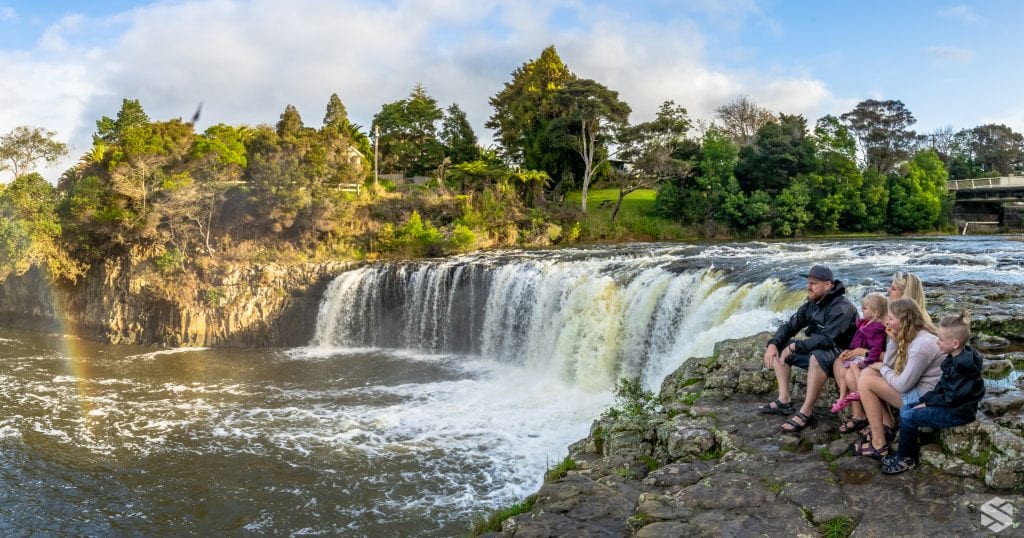
Table of Contents
- 1 The Decision to Homeschool
- 2.1 How Homeschooling Differs From Public School?
- 2.2 Advantages of Homeschooling
- 3.1.1 Socialization and Homeschooling
- 4.1.1 Unschooling
- 4.1.2 Worldschooling
- 4.1.3 Online Homeschool
- 4.1.4 Homeschooling By Textbook
- 5.1 Homeschooling a Preschooler
- 6 Is There An Age Limit to Homeschooling?
- 7.2 Goals of Homeschooling
- 7.3 YOUR Schedule
- 7.4.1 How To Supplement Tuition Costs
- 7.5 Regulations
- 7.6 Learning Styles
- 7.7.1 Daily Time Commitment
- 7.7.2 Yearly Schedule
- 7.8 Testing
- 8.1 Subject by Subject or All-In-One
- 8.2 Accredited Vs Non-Accredited
- 8.3 Group Teaching
- 8.4 Gaming-Based
- 8.5 Subjects That Are Important To You
- 9.1 Benefits of Travel in Homeschooling
- 9.2 How Traveling Changes the Homeschooling Game
- 10.1 Free Homeschool
- 10.2 Accredited Homeschool
- 10.3.1 Preschool
- 10.3.2 Elementary Through High School
- 10.4 Homeschooling Supplies
- 10.5 Christian Homeschooling Curriculum
- 10.6 Accredited Christian Homeschools
- 11.1 College Credit Before College
- 11.2 College Requirements
- 11.3 Can My Homeschooler Go To College?
- 12.1 How To Not Scream At Your Kids About Homeschool
- 13 Additional Resources About Homeschooling
The Decision to Homeschool
I’ve talked with dozens of homeschoolers, unschoolers, worldschoolers, and more all over the world. I’ve also spent hours scouring homeschooling Facebook Groups and forums. It is very interesting to hear the many unique approaches different families take when it comes to at home education. The decision to homeschool (voluntarily) is a deeply personal one and one that has several considerations.
As a homeschooling mom, I’ve tweaked, added, and subtracted to our at-home education many times. You can read what I started with in my worldschooling journey and how I changed things up after a few more months .
Mistakes inevitably come with the territory of homeschooling and teaching children. As long as you are willing to recognize them and make adjustments as needed, you’ll be great. I’ve made plenty of mistakes along my journey, but I’m always trying to improve and offer myself grace.
Because my husband and I both work in our various business ventures, we have had to balance homeschooling while simultaneously working. As full-time travelers, working is essential to fund our venture (You can learn more about how we afford to full-time travel here .) That being said, I can relate to all you working parents who are trying on the new hat of “teacher” at the same time.
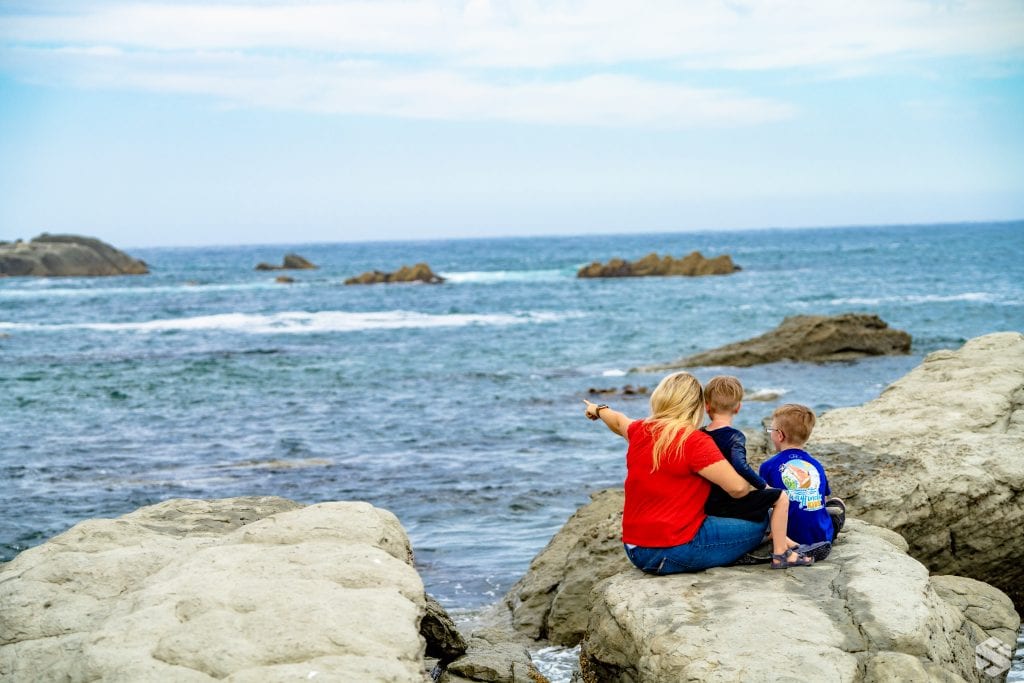
Throughout the remainder of the article I will present you with many homeschooling options in an effort to help you find the best homeschooling program for you. Ultimately, like mentioned above, choosing to homeschool your children is intensely personal and needs to be built to suit your family.
Why Should You Homeschool?
Would I argue that everyone should homeschool their child? Nope, certainly not. However, I would argue that most parents can homeschool and for most kids, it will be a better experience than public school.
The homeschooling vs public school debate will live on forever. Just as parenting is unique and individual, your child’s education is as well.
How Homeschooling Differs From Public School?
Besides the obvious answer of location (duh!) in the public schooling vs homeschooling differences, the types of education differ on much deeper levels as well.
Public schooling metrics are dictated and upheld by government agencies. These agencies have managed to create a “blanket statement” of goals that every child should, and must, learn in order to consider the student and teacher “successful.”
Public schools do their best to create a style of learning that works for all students, knowing clearly that all children learn in their own, unique way.
Do you see the same problem with this that I do?
The “failure” lies in trying to apply “sameness” to all children. Any parent with more than one child will attest to how unique and individual each child is from birth.
Personalized education and teaching techniques are, of course, impossible to execute in large class sizes. Because of this, we have to default to the well-intended blanket standards for all.
Homeschooling ultimately offers the benefit of FREEDOM. Freedom for you as a teacher, freedom for students and freedom to educate in whatever way works best for those involved.
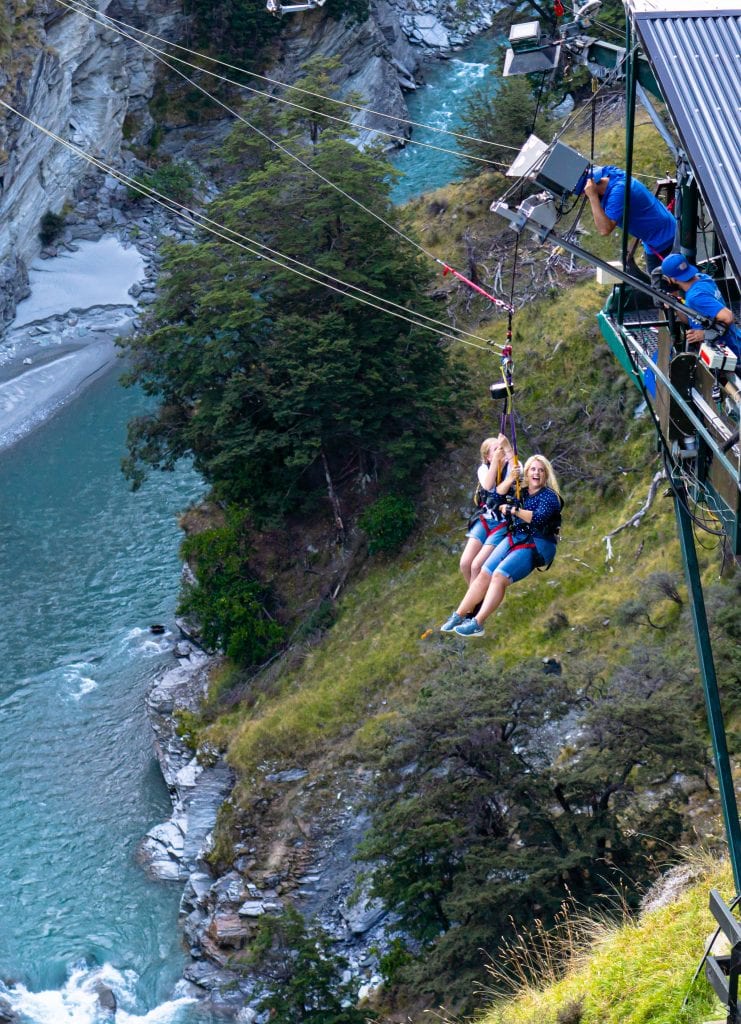
Advantages of Homeschooling
I’d be willing to bet that most school teachers would pay a hefty price to be able to cater their lessons and teaching style to each individual student. They can sense the differences in learning styles, yet out of necessity must move forward with approved lesson plans and mandated standards of learning.
If you take only one thing away from this discussion about the benefits of homeschooling, I want you to try to capture the gift it is to cater the programs to you and your child.
Other advantages of homeschooling stem from this core value of freedom: facilitates quicker learning, less fighting about school, learning alongside your child, allows progression at your child’s own pace, and much more.
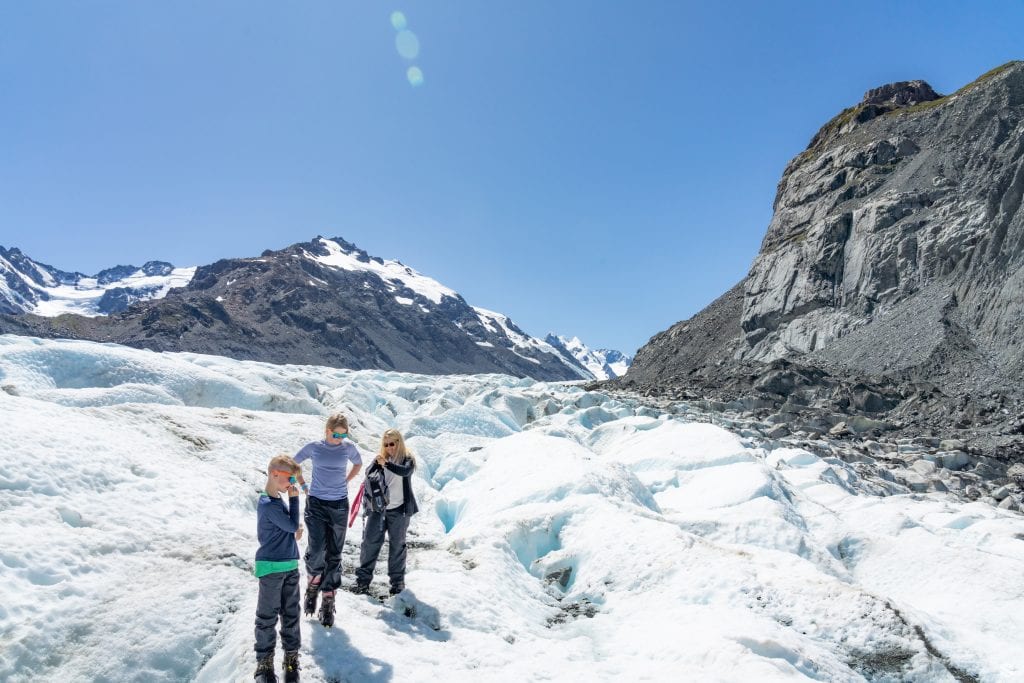
Who Should NOT Homeschool?
My bet is you are here looking for a quick reason why you aren’t qualified to homeschool. Fact is, none of us are homeschool teachers when we begin! This process includes a learning curve for all.
The only people who should not homeschool, are those unwilling to try, adapt, recognize mistakes, change, and mostly love their child through the process.
Homeschooling Disadvantages
The disadvantages of homeschooling fall closely into the same category as their advantageous counterparts. Similar to the advantages of homeschooling, the disadvantages also center around freedom.
A parent who chooses to homeschool doesn’t get the “free babysitting” hours that public school provides! Of course, school is much more than this and teachers are doing their very best to make it successful for students. With homeschooling, there are no breaks when you are the parent and the teacher.
However, as you’ll soon come to find, the same amount of learning can be done at home in a fraction of the time it takes in a classroom. Ultimately what you really lose is the time away from your kids while they are at public school. Some will see this as a curse, others as a blessing!
As a mother of five, I completely resonate with this. Since the birth of my first child I daydreamed about the day when all my kids would be in school for hours everyday. What freedom I’d have! Sadly, in our current COVID environment, this “perk” is not an option. It’s possible kids will be home all the time in the near future, just as they have been at times throughout the pandemic.
I’ll also be honest and upfront: homeschooling your child is work. It’s not impossible, it’s not even that difficult, but it IS work. You do have to be invested emotionally, mentally and physically to succeed. Even if you pay big $$ for a program with a dedicated “teacher”, you still are responsible for making sure your child is participating and working as they should.
Socialization and Homeschooling
We’ve all heard it said before, “homeschooled kids are weird.” There is a stigma surrounding homeschooling that just isn’t true.
One positive thing that came from the COVID pandemic is evidence of how silly this is. Did your kids become social misfits during your months of lockdown? Of course not!
You may have to get a touch more creative in your socialization methods for your child, but your kiddo will be fine!
Do you have neighbor kids? Siblings? Go to church? Play with kids at the park?
Your homeschooler can still get loads of socialization outside of a classroom. After basically sheltering our kids away for the last two years as we traveled, I’d even argue it’s better. You get to choose the socialization methods and partners versus shoving your kids in public school with all the bullying and comparison.
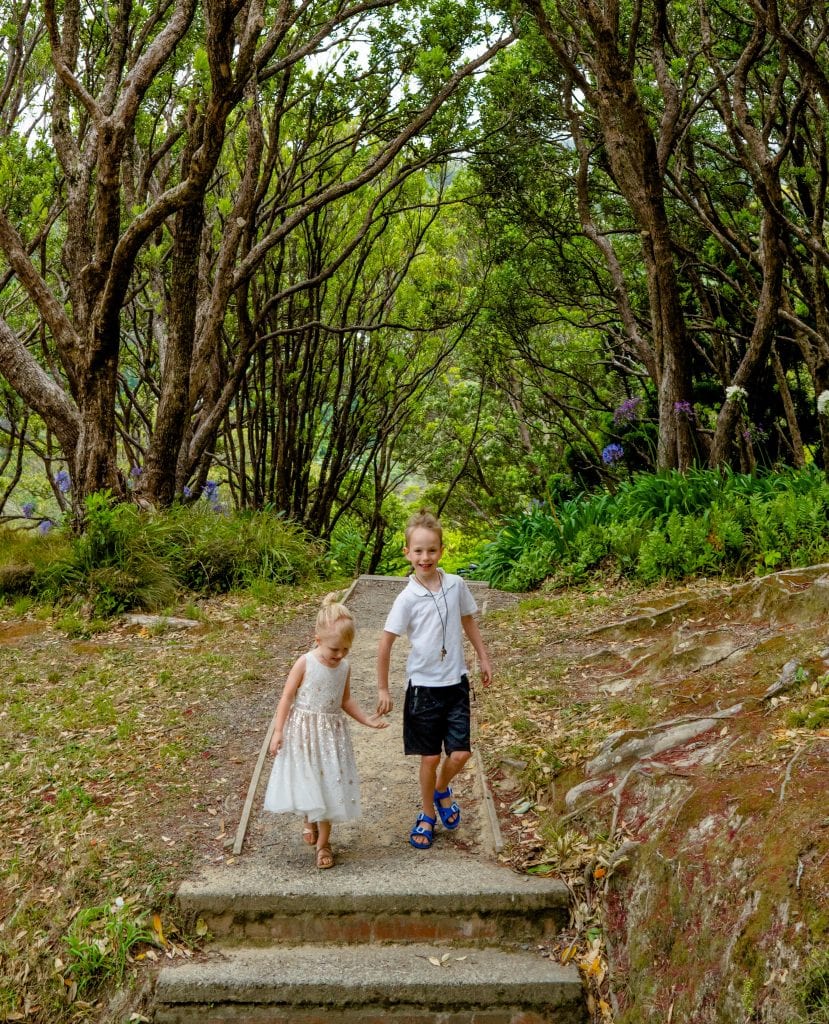
What is Homeschooling?
At this point in the process, you may be wondering how to homeschool. Your kiddos might be wondering how to be homeschooled. Don’t worry, we felt totally overwhelmed in the beginning too.
Overcoming the hurdle to homeschool was a major issue for me when facing down our full-time travels. I never wanted to homeschool! Frankly, I never considered myself patient, qualified, or creative enough to take on that role.
I’m here to say you can do it!
How Does Homeschooling Work?
A simple answer is this: you decide what is important to you for your child to learn, do, see, and experience. You find the resources to match your goals and get started.
The long answer involves lots of research, soul searching, and talking with those important in you and your child’s lives.
It sometimes means starting something that you think is important, only to find that you don’t have the time for it, your child hates it, or it isn’t that important afterall.
How homeschool works totally depends on you and your goals! In fact, there are so many styles of homeschool it’d make your head spin.
Let’s visit some styles of homeschooling.
Unschooling
Unschooling is a curriculum for homeschooling, centered on inquiry-based learning (and I’m using curriculum loosely). Unschoolers are quickly growing in popularity. I’ve met several throughout our travels and see more and more online everyday.
From the way I understand it, unschoolers don’t want to force a child to learn something they are not interested in. If your child prefers to do math today, great. If they want to go on a walk and learn about birds instead, that’s also great.
The goal is to capitalize on the natural curiosity of your child and let them learn as and what they wish. You might delve deep into engineering or biology instead of forcing all the basic subjects on your child.
In one of the many homeschooling forums I belong to in Facebook, I found this account in a discussion about unschooling:
Lona: I have six kids. Two have graduated from college. One is currently in college and three are being homeschooled. I homeschooled all of them from the beginning. I’ve read ALL the books! With my first three I unschooled almost exclusively. One child was motivated, two were not. The unmotivated ones were not prepared for college math classes. Science classes were hard but doable, and they all placed in honors writing. But, the math is not something you can catch up on quickly! My 17yo is a sophomore in college but he still hasn’t completed college algebra. He was pretty far behind when he started. I encouraged, but never forced. I even took college math classes “for fun” to inspire him! He had no desire. Now he wishes I would’ve made him do it! It was the exact same with my 19yo. So, now my younger children do some formal schooling every day. I do homeschool three grade levels now: 6th, 4th, & 2nd. When we travel the only formal school is math and writing. Everything else is experiential. My older kids say I should do formal science, too. But… I’m still working on that!
Unschooling comes with it’s own risks and benefits, as do all programs, but has many beautiful parts to it. It is not my personal favorite, as I don’t feel it sets kids up for long-term success in higher education, but that may not be important to you.
Worldschooling
If I had to categorize myself, I’d pin myself as this kind of homeschooler. I homeschool to travel the world and subsequently use the world as part of my “lesson plan”. Worldschooling involves the experiences of travel, different cultures, new people, etc. to teach more than a traditional classroom can.
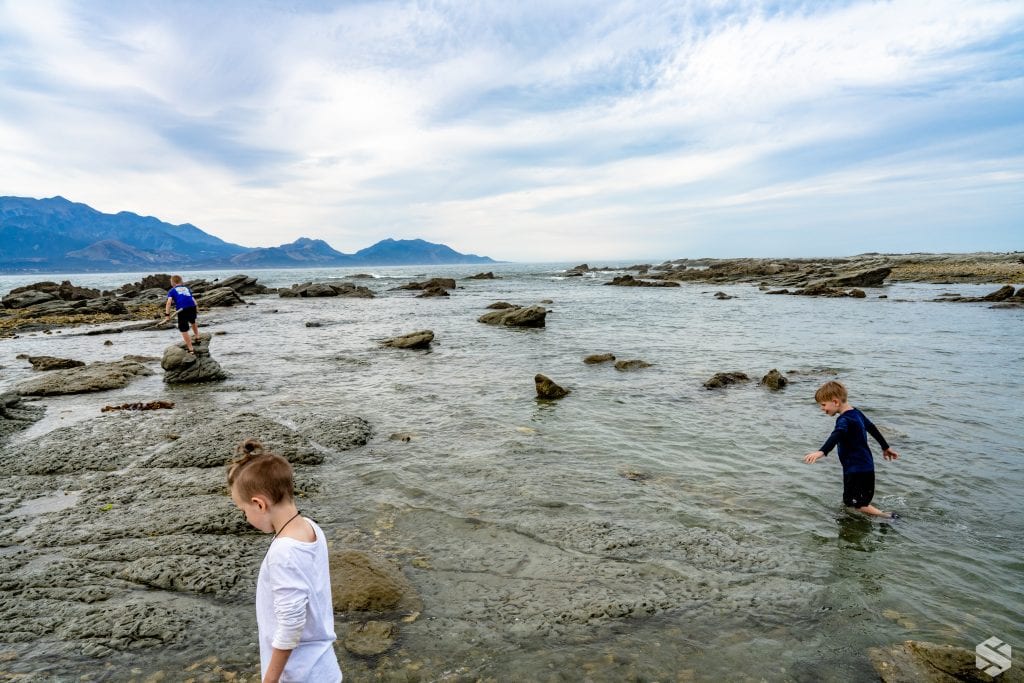
We learned about the history of Rome on our tour of the colosseum. Sea life was encountered and taught about on the seal colony shores of New Zealand. Chinese culture and tradition are burned into memory as we walked a morning market in Chengdu, China.

Many travel families choose this style of learning with varying levels of focus on other “basics.”
I personally still work hard to teach reading, writing, and math while we travel. However, some families use reading road signs, converting currency, and more as their teachers.
Travel is usually a driving factor for this style of learning, but doesn’t have to be. There are dozens of ideas for educating about the world from your own home.
For example: You could do a learning unit on China and use online resources to see and experience much of China right at home! You could cook a meal, learn calligraphy, watch documentaries on China, etc.
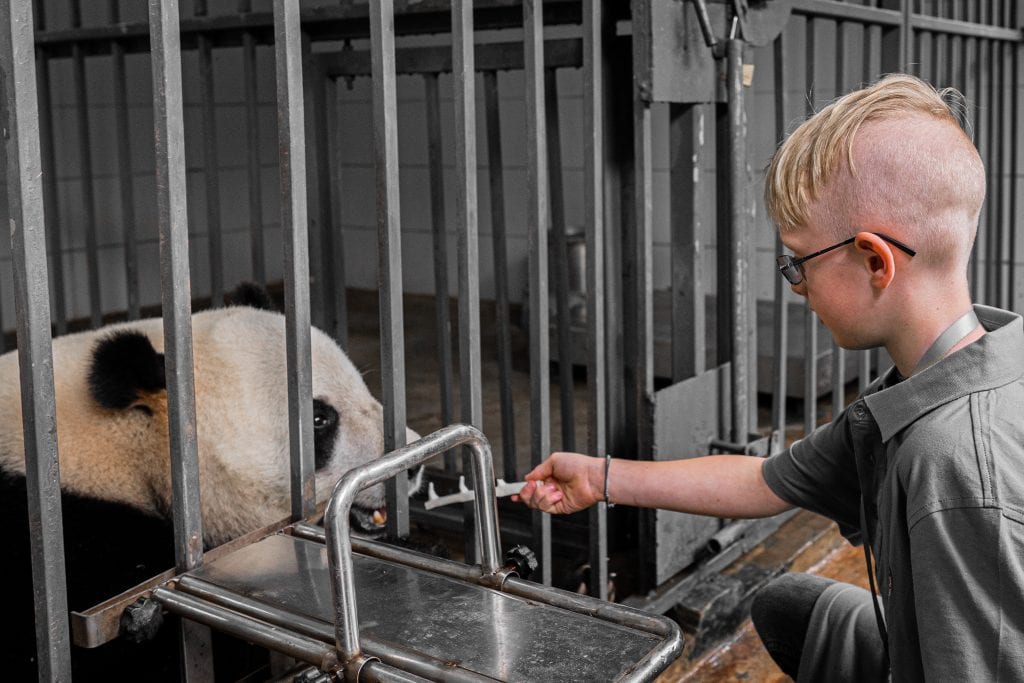
Online Homeschool
Modern technology provides amazing online homeschooling options. We live in such a blessed age in this regard.
Later in this post, I will compare various online programs from free online homeschooling to paid tuition programs. There are dozens, perhaps hundreds, of online homeschool programs.
Choosing your homeschooling programs online takes some time and lots of research. Generally, these programs will dictate a curriculum by grade-level or age in various subjects. They tend to follow similar standards as state education mandates.
Time commitment in these online homeschooling programs varies widely. For some programs, you implement everything yourself with activities, printouts, online games and more.
In other programs, you’ll be given video lessons to progress through or even virtual meetings with teachers. You can select a program that fits your level of involvement, time commitment, and the resources you want to use.
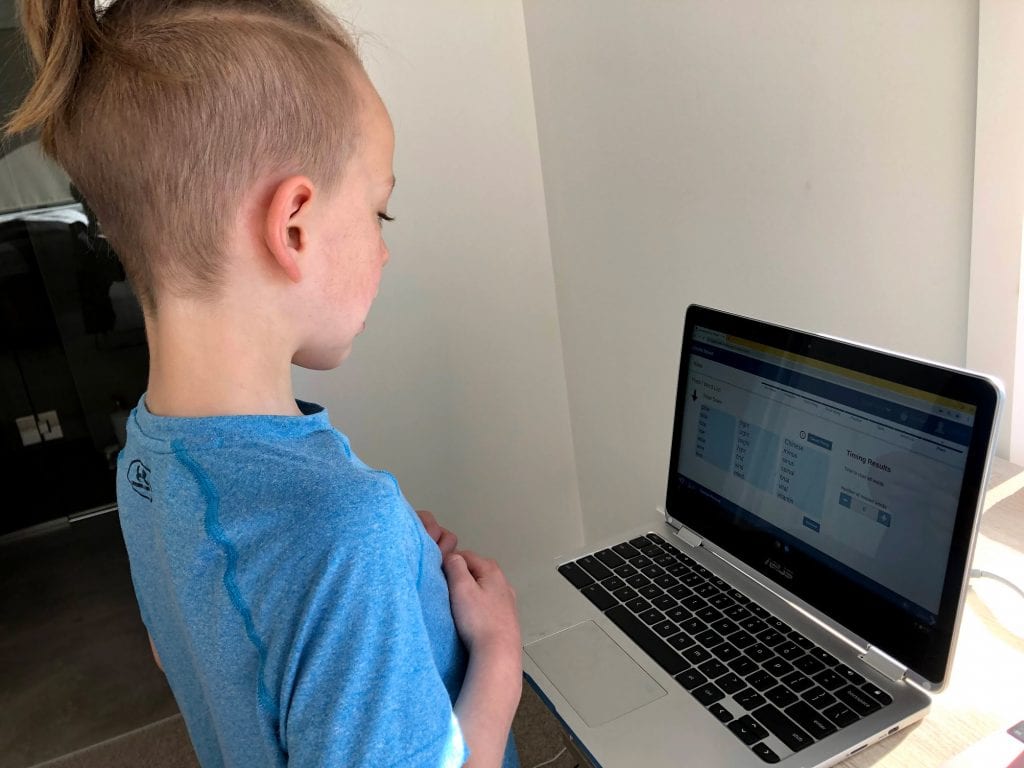
Homeschooling By Textbook
Homeschooling with books might feel more familiar to some of us “older” parents that didn’t grow up learning in school online. This teaching style might involve books, blackboards and other printed material.
You can find many programs in printed books that follow lesson plans and allow you to teach it all.
Out of necessity, we took as little printed material on our travels as we could. We did bring about half a suitcase worth of handwriting books and math workbooks, but all of our lessons are online.
When To Start Homeschooling
It’s my personal opinion that you do not need to officially homeschool before kindergarten. Frankly, as long as you are working on letter recognition, learning to read, and basic addition and subtraction, you’ve even got homeschooling kindergarten covered.
I got serious about homeschool starting in first grade for my third child. We did homeschool kindergarten, but it was pretty light an relaxed with online programs. For my older two, they simply followed the programs they’d left at their previous elementary school.
Homeschooling a Preschooler
When we returned to the US to spend some time with family, my mother was shocked that my 3-year-old didn’t recognize her colors, couldn’t count to 10, and didn’t know the alphabet. I just laughed.
I feel like the minds of toddlers are sponges and she will learn in no time! I’m certainly not worried about her progress before she would even be in preschool. However, I’m a bit relaxed about it, I guess?
Homeschooling a preschooler is totally doable and you can spend as much money as you’d like on the resources to do so! Or you can use some of the free resources I’ll present below to do so. Homeschooling benefits apply to all ages: time with you, growth and learning
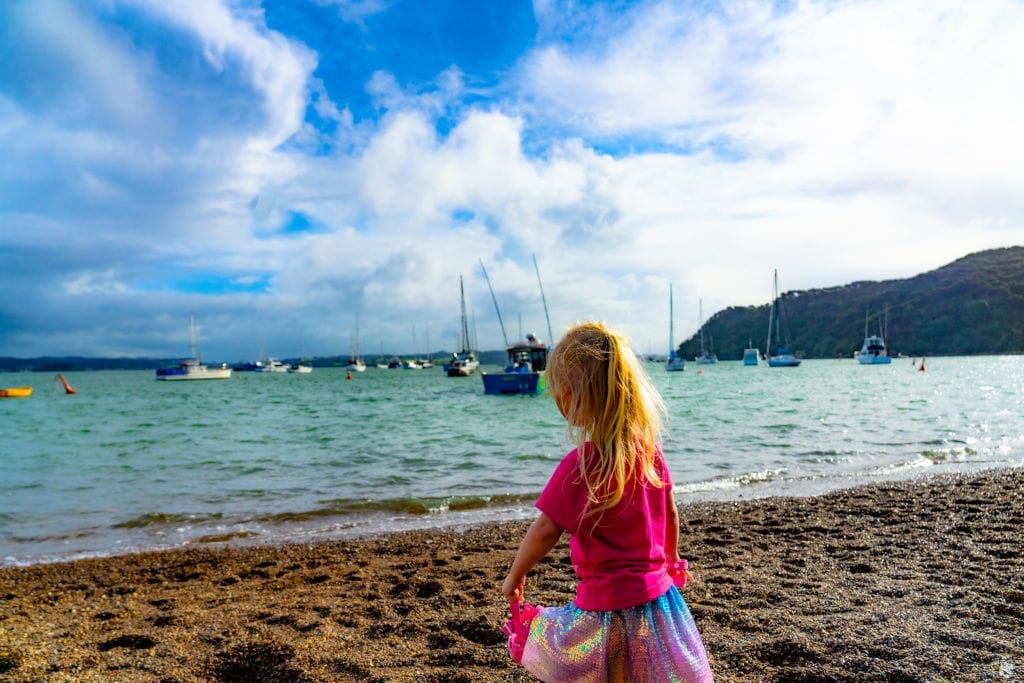
Is There An Age Limit to Homeschooling?
You might be wondering if your child can get too old for homeschool? Can you homeschooling in high school?
Most homeschool families find elementary and middle school the most comfortable ages to homeschool. However, homeschooling a high schooler is not only do-able, but more common than you may think.
I absolutely LOVE this blog from a past worldschool student, who is now a successful adult. I secretly hope my Lucy (now age 12) can follow a similar path and be blogging about it in the future.
The benefits of homeschooling absolutely can continue into high school. You might need a bit more planning, but there are amazing resources on it! I will share more below, so keep reading.
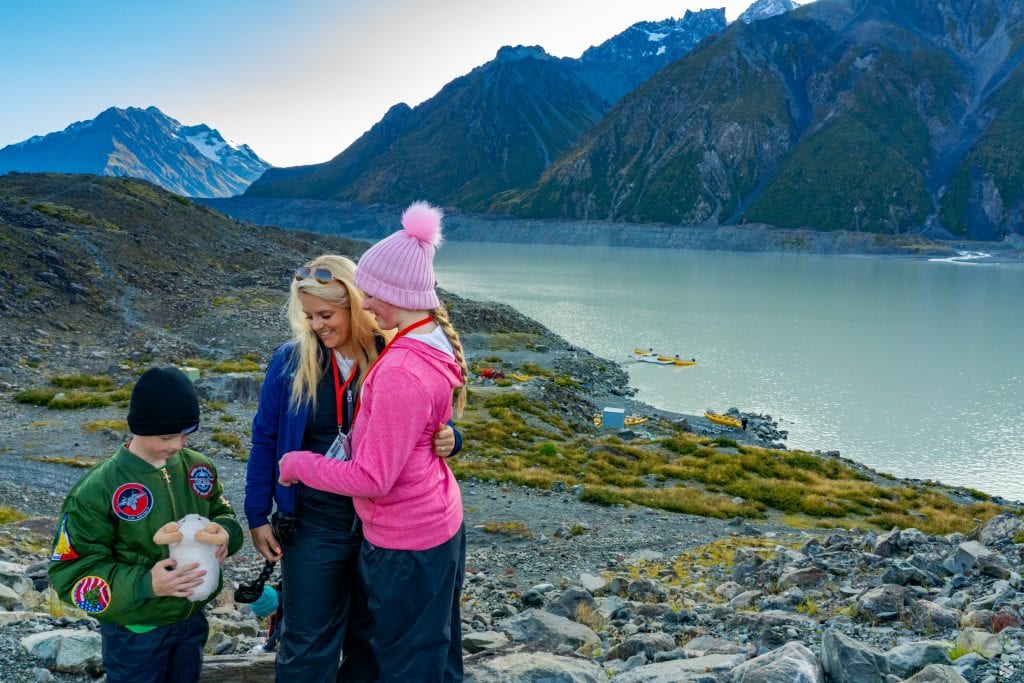
Other Things to Consider Before Choosing to Homeschool
We’ve already covered many facets of homeschooling, but a lot goes into this decision! Despite the many incredible homeschooling resources available, this is a family choice and one that might change your life paths forever.
You may want homeschool to speak so deep to your soul as a parents or have it be the only way you want your child to learn. I don’t mean to scare you, but I want you to realize the gravity of this decision! It’s a time commitment, but it’s also a lifestyle commitment.
Homeschooling Pros and Cons
There are amazing benefits to homeschooling. There are differences to homeschooling as well, which can be seen by some as cons. We’ve discussed a few of the pros and cons to homeschooling, but just to highlight a few more:
- Flexibility to choose what your kids learn
- Flexibility to choose how your kids learn
- Flexibility to choose when your kids learn
- Applying individual learning styles to individual kids
- Quality time with your kid (yes, it is possible to have a GOOD time learning with your kiddo, I promise!)
- Learning at the same time as your child
- Creativity to make learning FUN
- Flexibility to learn wherever you want, even while traveling
- Knowing exactly where your child is in their studies
- Accomplishing something great with your child
- Homeschooling takes a big commitment from you as a parent
- Working and homeschooling can be tricky. It’s a time balance and a lesson in patience for everyone
- You are responsible for their learning and progress. No blaming a bad teacher anymore 🙂
- Homeschooling can strain your relationship if you let it. Don’t let it.
- You are with your kids most of the time, if not 24/7. Forget about free time.
- Your kids have to have a level of commitment to get school done. This is a learning curve and you are the police.
Don’t let these pros and cons for homeschooling scare you. I promise you can do this!
Goals of Homeschooling
Do you have goals in mind when it comes to homeschooling? Some of them might include:
- Spending more time with your child
- Getting learning done in a more efficient way
- Adapting learning to the way your child learns
- Traveling or having more flexibility for other areas of your life
These goals will change how you homeschool. It’s important to define your “why” before you pick a program and begin.
YOUR Schedule
What else do you have going on in your life? Stay-at-home parent, working parent, part-time working parent… whatever your situation, you’ve got other things to do besides homeschool.
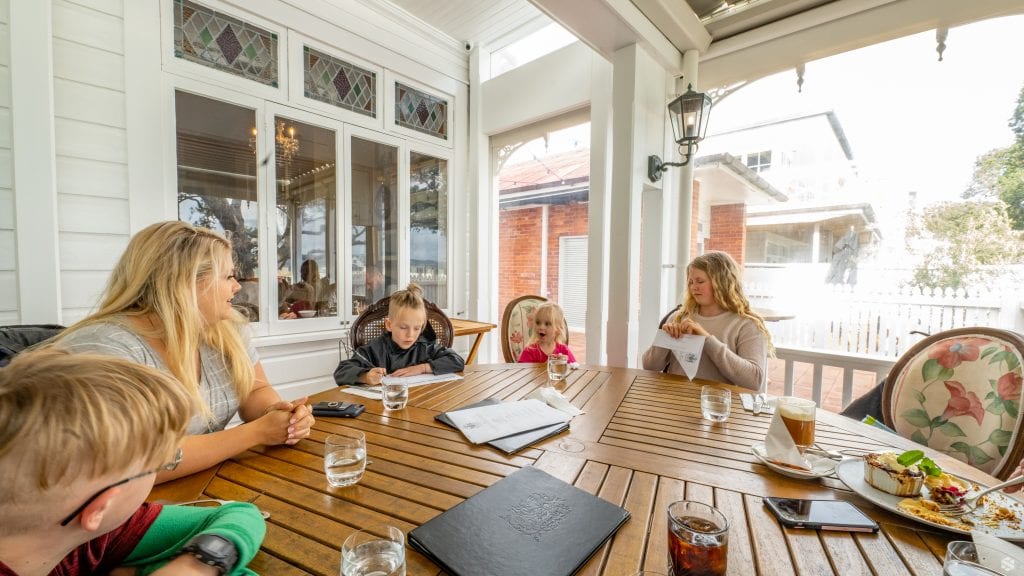
Homeschooling while working from home is tricky! I’m not going to lie, it will stretch you. I’ve been homeschooling while working full time for the last few months and I feel a little like my head will spin off at any moment.
My advice for working parents who also want to homeschool:
- Set aside dedicated time for each. If you have calls, don’t have your kiddos doing homeschool during that time. If that is not possible, put them to work on something they actually like to do, like science videos. Otherwise they’ll skip out on you and you’ll be scrambling and distracted.
- You may need to wake up before your kids to get some work done. In New Zealand, I was up and working at 5:30 am often. Granted, the time zone helped motivate this, but it also helped facilitate homeschooling later as well.
- Consider getting help; this could be your partner, grandparent, nanny, whatever. You’ll need help balancing your many hats.
When selecting your homeschool program, you’ll need to be realistic about your schedule and how much time you can dedicate each day.
Remember life goes on! You’ll still need to cook, shop, clean, do laundry, doctors appointments, etc. Don’t overextend yourself or try to do too much. If you do, you’ll burn out of the role very quickly.
Don’t worry if your house get a bit messier as you homeschool, that’s normal and O.K!
Surprisingly, homeschooling can be pretty expensive! While some programs run thousands of dollars per year, there are also lots of free homeschool curriculum options.
I settled somewhere in the middle. We spent about $300-400 per year on our homeschool.
You need to decide what kind of $$ you are willing to commit to homeschooling. If free homeschool is your only option, no worries! I’ve found a few options for you below that are great.
How To Supplement Tuition Costs
If you’d like an expensive program but don’t have the money, know that some have scholarship options. You’ll need to look into the requirements for each program individually.
I also have a friend who gets tuition paid for through a local charter school. This is an option to research in your local area.
Some places in the world will even “pay” your tax dollars back to help offset homeschool. For example, “In Alberta, home education provides each child $850.00 per year to offset the cost of resources.”
Because every state and country is different, you’ll need to do your own research on the options available to you in your area.
Regulations
Local government regulations differ greatly on homeschooling. It is actually illegal to homeschool in certain countries, like Germany, and difficult in others.
Within the USA, each state is a bit different on their regulations. Some states will require testing at the end of the year, some states may dictate certain curriculum to you, and other states don’t care.
Because we left for our world travels from Utah, that is where I registered as a homeschooler. This simply meant I went into my local school district office and signed a document in front of a notary. I haven’t heard a single peep about it since then!
Again, do your research on your country and/or state around homeschooling regulations.
Learning Styles
Do you already know how your child learns best? Probably not. You haven’t been their teacher yet!
If you already know, good for you! You can tailor your curriculum to them.
Does your child like to read? Do they enjoy learning hands-on? These may be things you learn along the way as you homeschool.
You can even consider asking their past teachers for their input. However, unless they were a problem student or excelled, their past teachers may now know them all that well.
I found my kids’ past teachers to not be very helpful on this front, personally.
Homeschooling Schedule
What schedule are you looking for in your homeschooling? Are mornings best? Do you want to go somewhere in the afternoon? Does your family sleep in?
In our travels, we decided to homeschool for several hours, three days a week. The other two weekdays we did light homeschool (like the programs they wanted to do) or no official homeschool, as we ventured around the world.
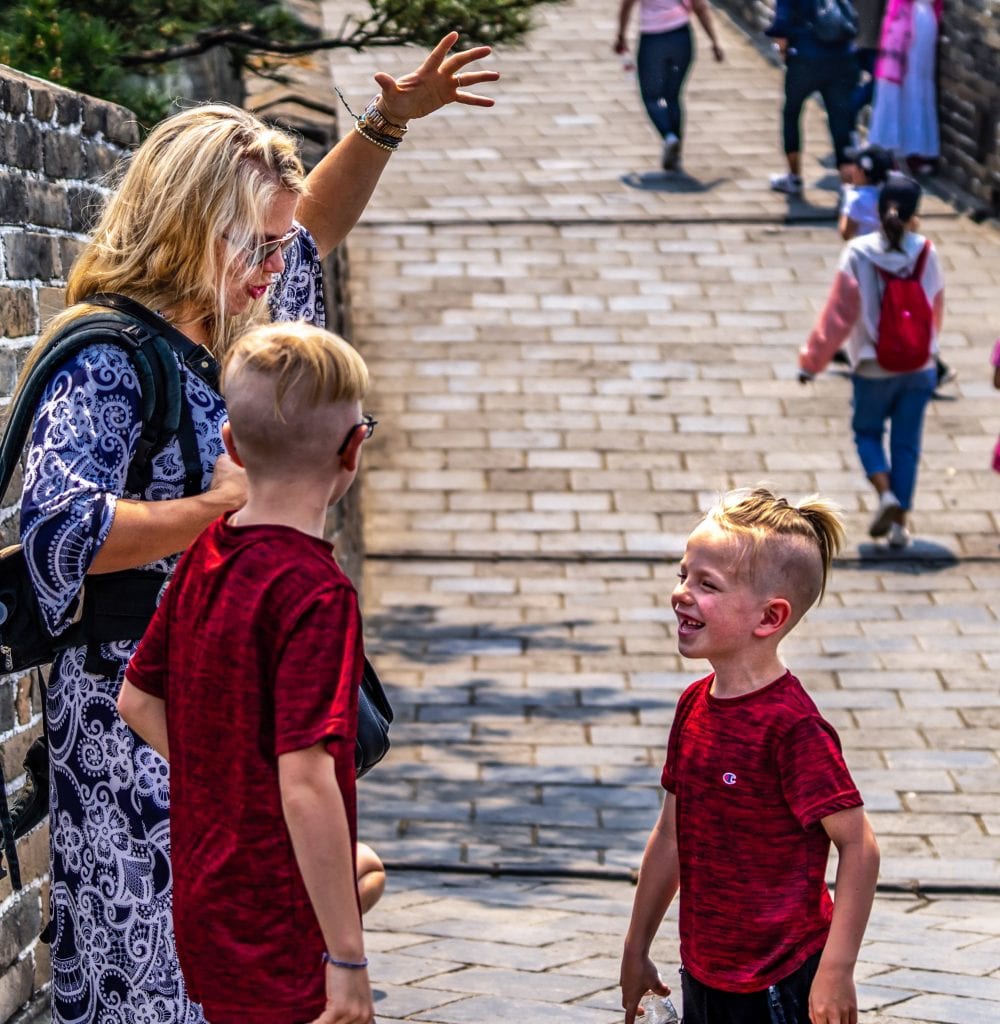
This schedule fit our work schedule, mostly. We usually started homeschool after breakfast. I’d encourage the kids to get started even before breakfast if they wanted, but this was rare.
If we had a fun event planned for the day, I warned them the day before that school had to be done by a certain time.
Occasionally, we tried to homeschool after a fun day out, but it rarely worked. We tend to stay out as long as possible and only return for bedtime.
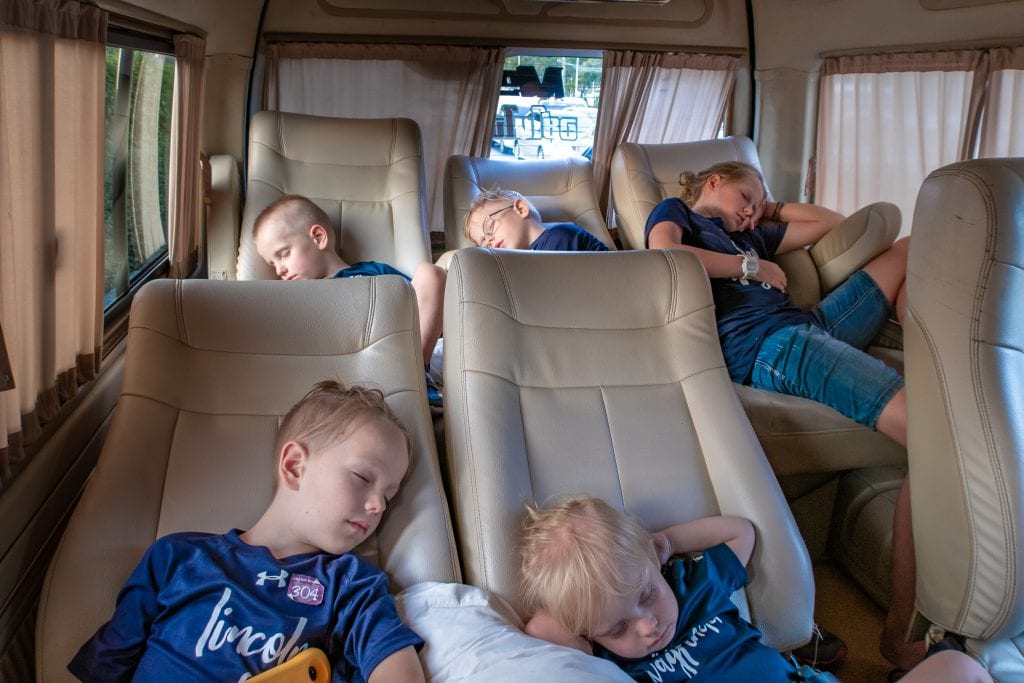
Daily Time Commitment
How many hours a day should you homeschool? Great question!
According to this article , most parents are homeschooling TOO much. I’m certain I’d fall into this category! Check out these snippets:
“For pre-Kindergarten, there should only be about 20-60 minutes a day of distance learning, it recommends. And though that amount increases with each grade, it’s only about two hours max for elementary school students and four hours for high school kids. This should all be accompanied by additional optional work, engagement opportunities, and enrichment opportunities, which range from reading to building a fort .”
“We recommend that true homeschoolers, spend about an hour to two hours a day for those elementary years, two to three hours a day for middle school, and three to four hours a day for high school,” Jessica Parnell, the CEO of Edovate Learning Corp and homeschooling program Bridgeway Academy , told SheKnows. The thing is, though your kids might be in school for six or more hours a day, they’re not spending all that time listening to academic instruction. “We did a study back in 2010 with a research group of a little over 1200 teachers who tracked for three months the time they spend in the classroom teaching new material, and the average was seven minutes in a class period,” Parnell said. “There’s a lot of time when teachers are settling the class down, collecting homework, reviewing homework, dealing with disruptions. So a lot of time at school is not necessarily wasted time, but certainly not teaching time.”
Any parent already knows having 30 kids in a classroom means there is little lecturing and a lot more chaos management. While volunteering in my kid’s classes before we left, I noticed how little “teaching” time there was and how much time was spent getting the kids to focus!
During our travels, I spent between 3-6 hours per day homeschooling. However, a lot of this is my kids goofing off!
Remember when you are homeschooling multiple children, you can only really focus on one at a time. The others will certainly waste time and goof off. Just expect it.
Yearly Schedule
Another important question is how many days per year you want to homeschool? Do you want to go year-round. Do you want summers off to match other kids and/or family?
We chose to do year-round school since we would be traveling and working year-round. We took 1-2 weeks off at Christmas, 1-2 weeks in the summer, and then 1-2 additional weeks off when we all burnt out, hit a great hotel with a kids club, or went on a cruise or tour.
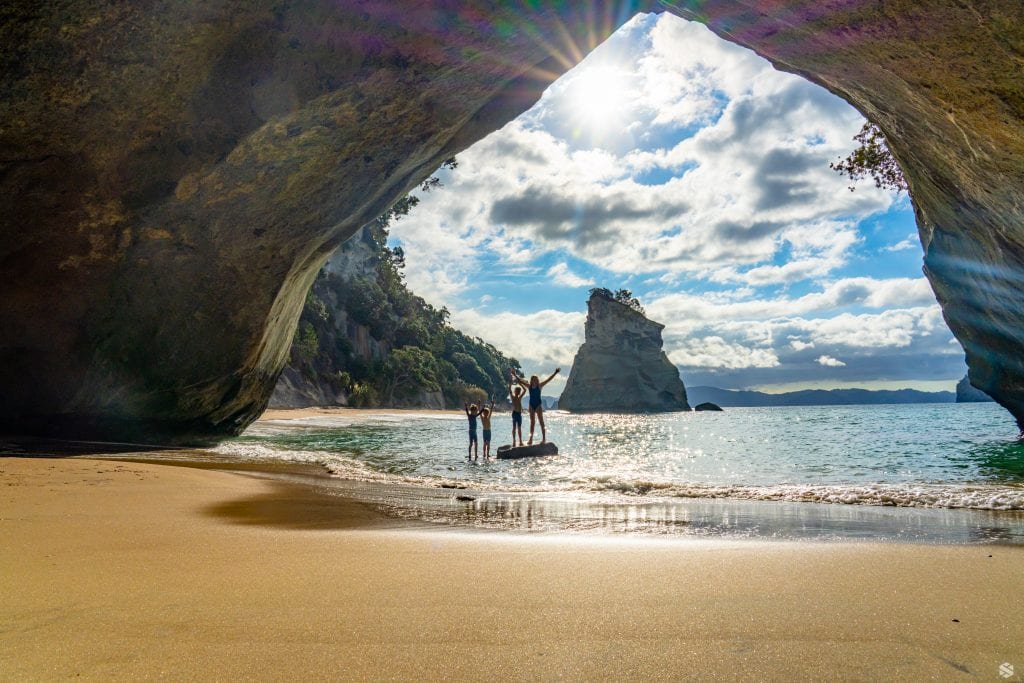
Personally, this factor doesn’t weigh heavily for me, but some parents might want to do testing for their homeschoolers. Some states or countries might even require it.
I’ve never worried about it much since Utah doesn’t care and I figure my kids are sticking to their “grade” level studies well.
Also, school is compulsory almost everywhere. What does this mean? It means in almost all countries, school-age children are required to be educated. Even if you are an illegal alien in a country, your child probably can go to school.
Even if you did nothing for a year, schools will have to take your children back to school! Kids catch up quickly. I’ve had several homeschooling parents reinforce this to me: even if there are gaps, when you send your child back to school they will catch up in 2-3 months, max.
However, if testing is important to you, here are some great resources for testing.
I will say, I have heard testing in general can be a weak point for homeschoolers. Perhaps it would be a good idea to incorporate more!
What Kind of Homeschooling Curriculum is Best For You?
Hopefully at this point you’ve got a good idea of what is going to fit your family best when homeschooling! Let’s get to the nitty gritty of some options for you.
Online homeschool curriculum will be the most prevalent and easiest to connect to. However, I’ve included options for several types, price points, etc. These programs all come recommended in homeschool forums, by my friends, or through word-of-mouth.
Subject by Subject or All-In-One
When picking your programs, realize you can choose more than one! One of my favorite programs, and the one we’ve used for that last two years, is Kids Online Academy . It is like picking “credits” for college. From their site:
“Kids On Line Academy is a great option for this coming school year. Take out the uncertainty and decide which courses to use at home or anywhere in the world. Just like at a college or university, you pick the courses you want to enroll in and pay for the credits for each. This means that you can take just one course or many. You are able to pick and choose what will work best for you and your current educational situation. KOLA can be used to complement another program or provide a complete/full load of courses. Kids On Line Academy is a private online school so you can be enrolled in KOLA along with any other public or private school all at the same time or it can be used as part of your homeschool curriculum.”
After my initial hours of research, I loved this option. There are several options for each subject. However, I used a totally different program for math and cherry-picked workbooks from different recommendations.
If this program sounds like the right fit for you too, you can use code “Leslie123” to waive your application fee. *I don’t get any commissions for sharing this, but Cara, the owner, and I both want to empower parents in this difficult time!*
If hand-picking curriculum is too overwhelming, you can also get an all-in-one solution that covers all the basics.
Accredited Vs Non-Accredited
Do you want your homeschooling to be accredited? What does this even mean?
This article gives a great background on what this means. Basically, unless you are very interested in a future sports scholarship or a certain college that doesn’t accept homeschooling readily, I don’t think it’s something to worry about.
The same article states, “No state requires that a homeschool program, curriculum, or diploma be accredited (in fact, curriculum can’t be accredited !) Most institutions of higher learning do not require this either, although there may be exceptions by individual institutions or programs; and of course schools may change their requirements at any time.”
From one of my homeschooling forums, one mom wrote this: “curriculum can never be accredited. Only a school can be. If you are doing an accredited homeschool program, it means your child is a member of a school, and you just so happen to do the work at home. Accreditation is not required- even for college entry- and in fact some schools are not accredited.”
There are several organization that provide accreditation. For more information, you can research these two sites and start down the rabbit-hole:
Group Teaching
Yet another option for homeschooling parents is to pool resources within small groups and have your children taught together. I’ve known several homeschooling parents who have formed groups and hired a tutor or a college student to teach a certain subject.
My friend Valerie, a mom to six and long time “homeschooler”, shares this,
“Homeschool suggests everything takes place within the home, and in my experience, a “home education“ takes place all over the community, and even the world. A “custom” education focuses the education on the child, not on the method. Throughout the years, my children have had classes within the home, with co-ops, commonwealth schools, private schools, tutors, and public schools.” Valerie also helps to run a commonwealth school. She says, “We all will attend a commonwealth school once a week. There are commonwealth schools in the western United States, not just my state (there’s even one in Tanzania). A commonwealth school based on the Leadership Education Mentoring Institute (LEMI) and A Thomas Jefferson Education book, is limited to 30 families who all contribute to the teaching and work of the school.”
Valerie shares a ton more info and advice in a separate post, found here .
Take some time to consider how much “community” you want in your homeschool experience. You don’t have to do it alone!
Gaming-Based
I don’t have much knowledge on this type of learning, but have heard it around some of my forums and want to present it as an option
From this site , “Game-based learning describes an approach to teaching, where students explore the relevant aspects of games in a learning context designed by teachers. Teachers and students collaborate in order to add depth and perspective to the experience of playing the game.
Good game-based learning applications can draw us into virtual environments that look and feel familiar and relevant.”
Perhaps this type of learning is something to check out for your child.
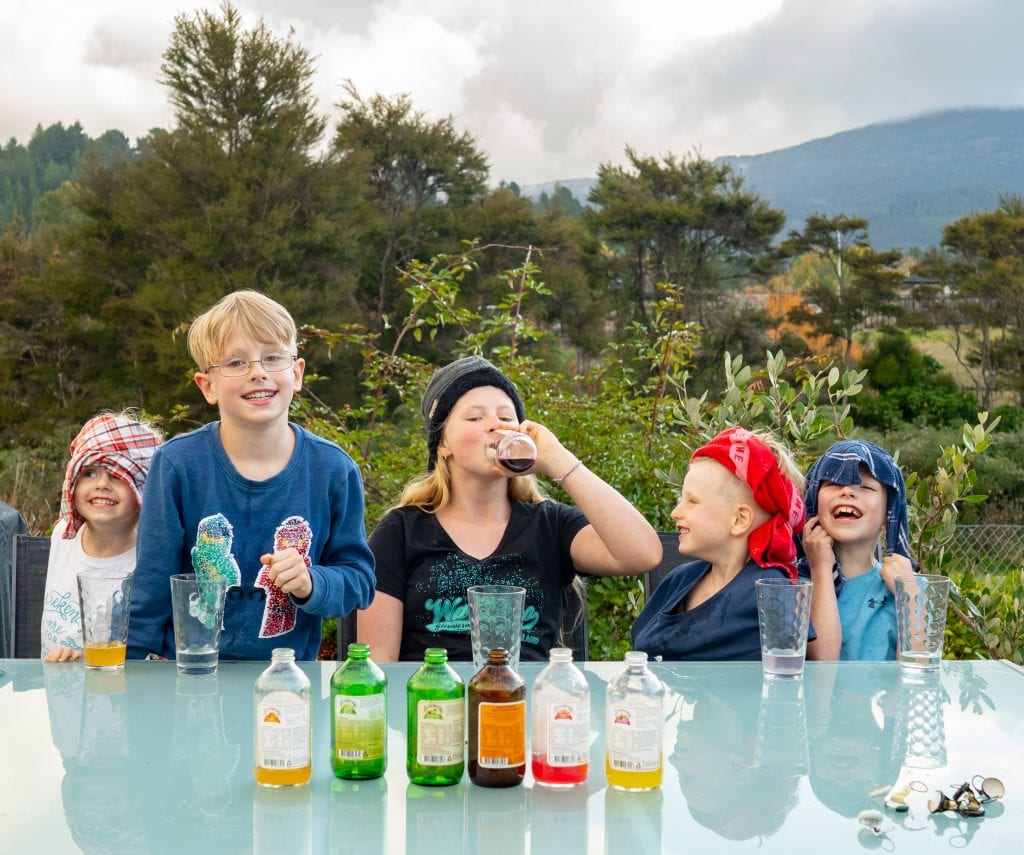
Subjects That Are Important To You
What subjects are important to you for your child’s education? Take a moment to consider each of the basics:
Filling each of these subjects can vary widely. For example, for writing (which tends to be a weak point for many students in general and one of our hardest subjects), you can consider notebooks back and forth.
We did travel journals during our world travels. I made my older kids write once per week about something we’d seen recently. We would include little mementos like tickets, postcards, or stickers from that event.
Homeschooling While Traveling
In case you have a serious case of wanderlust like us and plan to travel while you homeschool, let’s touch on homeschooling on the road.
You’d be shocked to learn how many families do this. I know of dozens of full-time RV families around the USA and I’ve connected with dozens more full-time travel families that are homeschooling while traveling.
You can choose from all the same options below to work for you as you travel. There is no one-size-fits-all for homeschooling for traveling families, just as there isn’t for homeschooling families learning at home.
Typically, travel families are going to use the curriculum from their home country. It’s what is familiar and works best if they return “home.” American families tend to do American homeschooling overseas.
Benefits of Travel in Homeschooling
I’ve already stated many of the benefits of “worldschooling” above, but let’s touch on a few more.
The benefits of schooling around the world can include:
- Learning different cultures and languages
- Learning different lifestyles in a way a classroom could never replicate
- Learning diversity hands-on. It’s a humbling experience to be the minority!
- Constant money exchange math problems
- Trying new foods and expanding the palate
- Meeting friends around the world. My What’sApp is full of world-wide friends!
- Learning to adapt to changes, time zones, different internet, weather, climates, etc.
- Incorporating “experiences” into your worldschooling is both fun and educational
- Museums around the world make for great field trips!
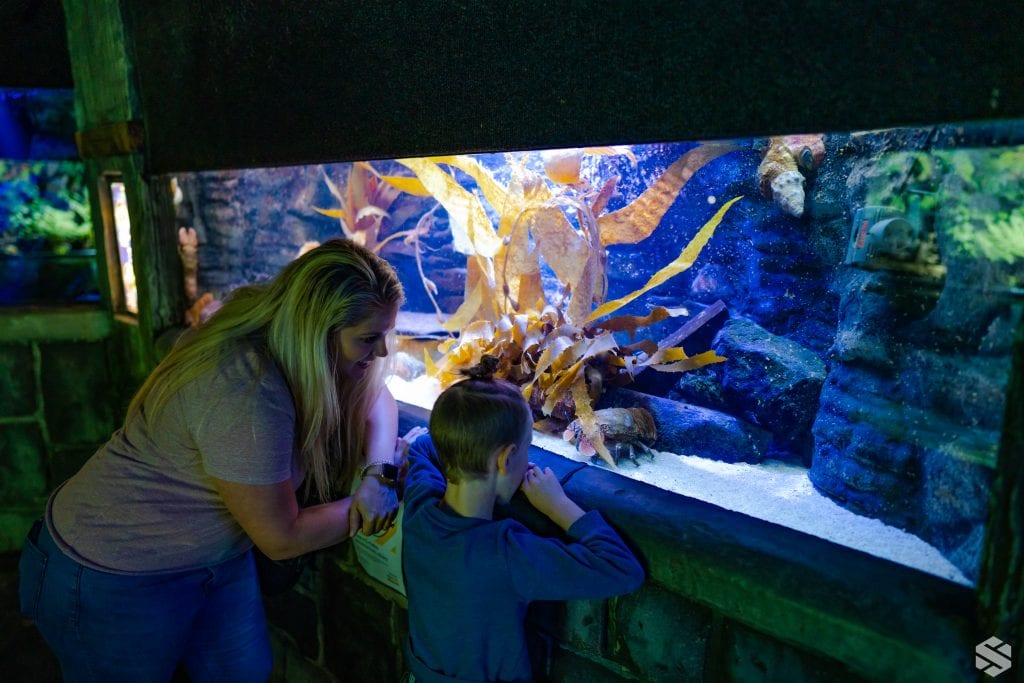
How Traveling Changes the Homeschooling Game
If worldschooling is your goal, which I hope to inspire everyone to do at least once, keep these things in mind when picking the program for you.
- Space. If you are traveling, you need to conserve space
- Flexibility. You’ll have travel days, play days, and work days. You need a program that will work with your changing schedule.
- Affordable. Spend your money on travel experiences!
- Easy to teach. You won’t have time to do a lot of lesson prep.
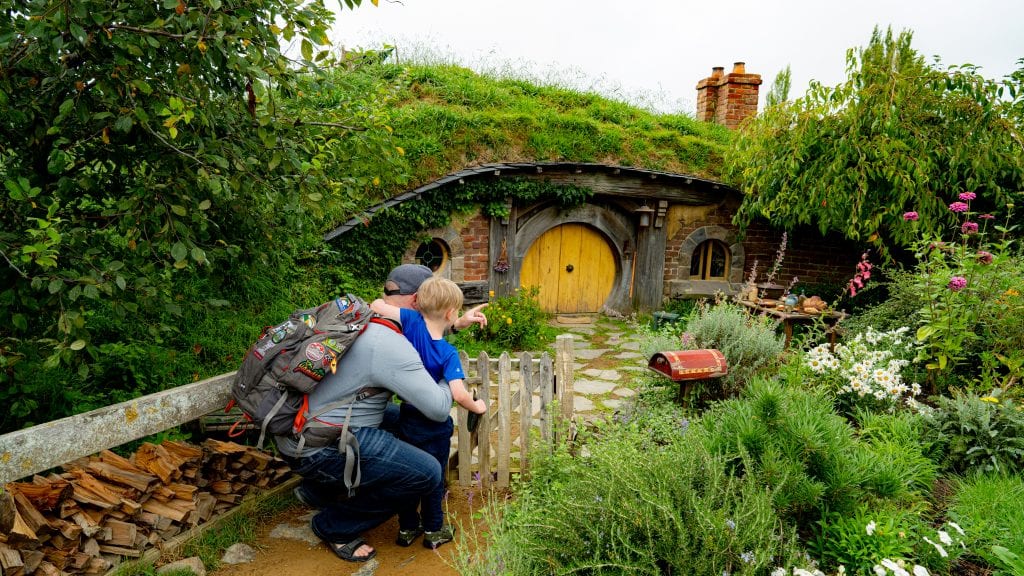
From a worldschooling forum I am in, one mom shared: “I am going to give you my best piece of advice from a decade of worldschooling. Do not pressure yourself or your children to replicate school at home by getting stuck on curriculum, workload, and time frames. Kids are built to learn from the world around them. They absorb more than you think from everyday interactions.”
Picking a Homeschooling Curriculum
Finally! We are to the point of picking out a program that is right for you. Whether you are looking for free online homeschool, kindergarten homeschool curriculum, or homeschooling high school, I hope these tables can offer something to you!
I’ve spent hours researching these. Forgive any errors! There is no best homeschool curriculum for everyone, so use these as a starting point for what will be best for you.
Free Homeschool
Kahn Academy Price: Free Time commitment: self-guided, low to high. A free and incredible resource for learning! We’ve used Kahn off and on for a few years. You can find videos on nearly any subject from math to history to science. You can even learn another language! This resource requires you to be completely self-guided and driven.
Easy Peasy Homeschool Price: Free Time commitment: daily lessons, low-high. Easy Peasy all in one homeschool is Christian based, homemade program that has gained loads of popularity among homeschoolers.
k12 Homeschool An accredited option that connects you with a school local to you. I believe they work with your local school to get the tuition paid for, but I don’t completely understand it. I have seen several reviews of other homeschool parents that do not like this program, but it’s worth more research if it sounds like your thing.
Connections Academy Price: Free for K-12th Time commitment: guided, mid to high. Similar to K12.com. Works with a local school that might be accredited .
CK-12. Price: Free for K-12th Time Commitment: self-guided. STEM based learning (math and science focus). Feels like a Kahn Academy, but with written textbooks online. It seems that schools also work with this site to replace their textbooks.
Accredited Homeschool
Bridgeway Academy Price: $$$$, K-12th Offers both secular and Christian options. Works with various educational options to create a customized plan for you. They will do an assessment and create a plan for each child. Fully accredited.
Abeka Homeschool Price: $$$, PreK-12th Christian based. Offers a free week trial to their video lessons. You have the option to buy materials and teach yourself or also access their video lessons. Accredited or independent study options ( compare here ). Options for dual-enrollment for high school juniors and seniors to earn college credit.
Forest Trail Academy Price: $$$$, K-12th Private school registered in Florida. Online learning or correspondence courses. Secular and Christian programs available. Homeschooling program is K-8th and is a traditional book program (think paper and pencil). Online courses are offered as well with dual-enrollment and NCAA courses available.
Laurel Springs Price: $$$$$, K-12th Begin classes anytime of the year (rolling enrollment). Flexible schedule. Option to enroll in one course to give it a try.
K12.com Price: Free, K-12th From what I can gather, this program works with local schools in your area to get you an online school that is accredited. I’ve heard several reviews of parents that do not enjoy this program, but it is free, which is a big deal!
Williamsburg Online Academy Price: $$$$, Grade 6-12th Focus on college prep and higher test scores for college entrance exams. I have a homeschooling friend that really likes this program for her son, but it is a lot of course work and there is the potential to fall behind if life gets busy. Classical education focused on leadership and other areas.
GlobalVillageSchool.org Price: $$$ K-12th TIme commitment: self-guided or directed, low to high. Focused on sustainability, this online school is accredited according to their website. Offers various options to “unschoolers” and more traditional homeschoolers.
International Virtual Learning Academy Price: $$$ K-12th One christian option available as well as five traditional school programs. Expect about 1 hours per day per course. Live homeroom sessions to interact with other students.
Connections Academy Price: Free, K-12th Time commitment: guided, mid to high. Similar to K12.com. Works with a local school that might be accredited.
BYU High School Price: $$$, 9-12th Enrollment into a scheduled program or home study available. Diploma option available. Standard and advanced tracks available.
Tuition/Fee Based Homeschool
Abcmouse.com Price: $ A fun learning platform that builds as you progress. We’ve been using this long before we left to travel and all my kids have enjoyed it through about age 6. I’m pretty sure Harrison has learned all of the nursery rhythms from the cute videos on this program.
Time4Learning Price: $ PreK-12th This program is customizable to you. You can select different grade levels for different subjects (which is fairly common when homeschooling to have your child move at a different pace in each subject). I’ve seen dozens of great reviews for this program and it would probably the one I try next!
Kids Online Academy Price: $$ PreK-12th Time commitment: self-guided, low to high This is the program I’ve been using for the past two years. I really enjoy customizing to each of my kids. This basically gives you access to the same programs kids are using in traditional schools. In fact, we used many of these programs in the schools my kids attended before we left.
Elementary Through High School
adventureacademy.com Price: $ An “older kid” version of abcmouse.com from the same creators, this platform is for ages 8-13.
Time4Learning Price: $ PreK-12th This program is customizable to you. You can select different grade levels for different subjects (which is fairly common when homeschooling to have your child move at a different pace in each subject). I’ve seen dozens of great reviews for this program and it would probably the one I would try next!
Leadership Education Academy Price: $$ K-12th TIme commitment: paced, mid to high. An interesting blend of a customized program with virtual mentor classes. Virtual classroom sessions are scheduled on Pacific time and recorded for later viewing. Perhaps not complete enough to serve as your only education, but I’m not familiar with it enough to say for sure. It seems to be somewhat accredited for high school courses through Williamsburg Academy.
Galileo Price: $$$$ Age 8-18 Time Commitment: self-guided, take breaks when you want A great option for worldschoolers, unschoolers, and homeschoolers. This program allows flexibility to students for what interests them and prepares them for the future by exposing them to entrepreneurship, technology, and global citizenship. They do offer sibling discounts and scholarships.
Homeschooling Supplies
evan-moor.com Price: $$ PreK-6th Books to use for self-guided teaching. Homeschooling bundles available with a discount.
carsondellosa.com Price: $ Pre-K- 12th Affordable supplements or grade workbooks by subjects.
hookedonphonics.com Price: $$ Learn to read program. Digital access for up to 3 children on 3 devices with supplemental paper books. You can also buy supplemental readers by level.
littlelearninglovies.com Price: $ Printables to use for supplements to your homeschool or regular schooling. This site has darling resources! Spelling tests, US geography, etc.
WriteShop Price: $ K-11th Writing supplement books. Writing can be a difficult part of homeschool and these come recommended! Read reviews here
Christian Homeschooling Curriculum
Easy Peasy Homeschool Price: Free Time commitment: self-guided, low. Christian based, homemade program that has gained loads of popularity among homeschoolers.
Monarch Price: $ Time commitment: Guided, mid to high. Interactive, Christian-based, completely internet-based curriculum. No need to install software and compatible with most operating systems. Grades 3-12. For more programs that cover K-12 from the same company, see here .
The Good and The Beautiful Price: $$ PreK-8th Time commitment: self-guided, high. Christian based, book-based curriculum. These are printed courses that you buy from their virtual storefront or actual warehouse in Lehi, Utah. A good friend of mine who is a teacher and long-time homeschooler LOVES this program. It didn’t work for me to carry this many books in our travels, but I’ve heard several good reviews.
Accredited Christian Homeschools
Bridgeway Academy Price: $$$$, K-12th Offers both secular and Christian options. Works with various educational options to create a customized plan for you. They will do an assessment and create a plan for each child. Fully accredited.
International Virtual Learning Academy Price: $$$, K-12th One christian option available as well as five traditional school programs. Expect about 1 hours per day per course. Live homeroom sessions to interact with other students.
Beyond K-12
Hopefully now you’ve got some options for homeschooling! Your next question might be: what about college?
Assuming you want to homeschool for high school, which is totally doable, you’ll need to do some prep for the next step.
College Credit Before College
Just like many high school students take AP classes or co-enroll in the local community college, homeschool students can enroll in independent study courses and earn college credit!
For example, BYU Independent Study allows enrollment from students 14 years and older and doesn’t require a high school diploma to sign up. Chances are good the college you are considering has the same option.
Going back to one of my favorite blogs, the The Edventure Girl was done with “high school” by 15. Read how she got into university .
Another site, Edx, also offers a platform for college-level courses. From their site: “If you’re looking to help with your teen’s college prep, consider enrolling them in one of the many classes at edX, a platform that partners with high-ranking institutions like NYU, Harvard, and MIT (as well as international universities, like Oxford and Australian National University) to offer over 2,500 college-level courses. Some are self-paced and available for college transfer credit, while others are taught by qualified instructors—most of whom have doctorates in their fields. “
You and your teen can choose from a variety of standalone courses across the arts and humanities, STEM fields, music, computer science, education, and more. Most courses, even credit-eligible ones, are free, with completion certificates that will cost about $50 in most cases.
Particularly proactive high school students looking to get a head start on their college career while at home can enroll in an edX MicroBachelors program in popular majors like computer science, for just $166 per credit. Or, they can start earning college credits now by attending the Global Freshman Academy that offers common, foundational first-year courses like English composition, pre-calculus, or college algebra and problem-solving through edX’s partnership with Arizona State University.”
College Requirements
From my research, the most important step towards college after homeschool is to make a short list of the colleges and universities your student might want to apply to.
Then, take some time to research what each requires for entry.
This article has fantastic information about this process. From their site:
“Almost every college/university has an online catalog these days. And inside that online catalog, usually at the beginning, is a section on admissions — specifically on admissions requirements. And there is where it will say how many credits of high school English the college requires, how many credits of math, of history, etc. It will even sometimes list specific courses that the admissions department would like to see the applicant to have taken in high school, like American History or British Literature.” “Another interesting thing to notice, too, is that many colleges do not require a minimum number of credits even close to what the states require for high school graduation. This can also be very relieving. Frankly, I don’t know why we even care about state requirements for high school graduation. I mean, they’re fine to use as a reference or starting point, but it seems to me that when planning high school we tend to forget one of the great perks of homeschooling — the fact that we are in charge. We can decide how many credits our child needs to graduate and what courses he is required to take.”
Can My Homeschooler Go To College?
I love this information from the Time4Learning site:
“Yes! Be sure to do research on the homeschool-friendly colleges and universities your child is interested in attending. Depending on the school, you may need high school transcripts and/or a high school diploma. All 50 states in the U.S. allow parents to issue a homeschool diploma to a child they feel has met or exceeded the guidelines for high school graduation. There are plenty of templates online; check out the ones at LetsHomeschoolHighschool.com. Some colleges and universities also require scores from tests like the SAT and/or ACT. Colleges and universities have admissions counselors that are available to help you understand and plan for their admission requirements.”
Frankly, all this research has empowered me to feel like homeschooling is an option for many years to come! I used to feel stuck in the mentality that we could homeschool until high school, but I no longer feel that.
Each child is different and this is a decision to be made with each of them individually, but traditional high school does NOT have to be your only option.
Homeschooling Advice
Every homeschooler will have their own advice for you. Here is mine!
- Be patient. Be patient with your kids, yourself, and the process. It will never be perfect.
- Don’t plan too much in advance. Certainly not more than a year! Really, shoot for a couple of months and plan to adjust and change what’s not working.
- Pray. Our Heavenly Father is as invested in your kids as you are! Let him guide you. About 3 months into our homeschooling I had a clear impression that my kids were not writing enough. All of our learning was on the computer. I promptly did some research and bought some workbooks for spelling, math facts and handwriting.
- Be willing to give up. At least for the day 🙂 You will likely either fall into two categories: too much school or not enough. Try to push to the middle and be willing to start again the next day when everyone’s nerves are fried.
- Don’t discount quality time. Simply being with you and doing things with you as their parent will teach your kids loads. You love them the most out of everyone and this reaps tons of benefits!
How To Not Scream At Your Kids About Homeschool
Let’s be real for a minute: it’s going to happen. Unless you possess super-human patience or your kids are perfect, you’re going to lose your temper.
Kids are going to cry. A lot.
Kids don’t want to do school. At least none of mine do! School is still a chore. They enjoy the learning and they have gotten to the point of enjoying learning to some degree, but I get lots of groans about doing school.
How can we avoid these bad situations as much as possible?
- Take care of yourself. Just like parenting, homeschool is going to wear you out! Get some exercise, get out by yourself, go to lunch with friends, whatever.
- Let the house go. It’s hard for those of us who like a clean house, but you’ve just got to let it go now. Your kid’s education is taking place of the dishes and dirty laundry for a bit.
- Have a backup partner. Train your spouse or partner on some of the trickier parts of homeschool and wait until they can help you. Even if that’s after dinner, if it’s just too much, wait for them to do it! I had Chris do our reading testing a lot when I just lost my patience. Same went for spelling tests until we just gave them up altogether.
- Have kids work in separate rooms when possible. My older kids absolutely cannot work together. It’s like two besties in a classroom… they are constantly talking, fighting, showing off for each other. We’ve made rules about who works next to or with mom, who works in bedrooms, and how we rotate that throughout the day. Have kids work on the hardest subject with you and then rotate to the next kid. This is exhausting for you, but the only way my kids can get it done.
- Take loads of breaks! It feels discouraging, but kids need a break about every 30 minutes. The longest I can really push hard is 1.5 hours. Sometimes, because I have so many kids, I have one older child be a “buddy” to the youngers while the other older children work on school. Then they switch. This keeps toddlers occupied and gives older kids a break from school. Win-win!
Additional Resources About Homeschooling
I haven’t read any of these books personally, but they come from recommendations form homeschooling forums or followers. Read them or have another one you love? Leave them in the comments below!
Home Grown Kids
Better Late than early
A Well Trained Mind- A Guide to Classical Education at Home
Cure the Fear of Homeschooling High School
Teaching from Rest
Happy at Homeschool
How to teach your child to read in 100 easy lessons
Here are more of my posts on Homeschooling:
Digital Resources for Keeping Your Kids Educated
Worldschooling: Homeschooling While We Travel
Good luck in all your homeschooling decisions! I hope this helps you in your journeys, school or otherwise!

Leave a Comment Cancel
Your email address will not be published. Required fields are marked *
Email Address *
Save my name, email, and website in this browser for the next time I comment.
Leslie Stroud
Welcome, Fellow Traveler! I'm Leslie, a mom of five crazy kiddos. Along with my husband, Chris, we've been full-time or part-time traveling the world as a family for over 4 years! We continue to invest in memories as we travel the world and love to empower other families to explore full-time travel or add more travel into their family life. Besides travel, we are foodies and love to explore through our tummies and can't keep away from Disney parks around the world. We currently reside in Portugal and are exploring expat life and learning a new language. Please explore our blog and reach out to us!
Social Followers
Most viewed, the perfect 5-day itinerary with kids in são miguel island, azores, portugal, what food to buy when staying in an airbnb with your family, bangkok travel guide: 11 tips, tricks and takeaways, ultimate iceland 7-day ring road itinerary with kids, budapest thermal baths with kids: palatinus thermal baths, most commented, tips for flying with a baby, first anniversary of living in portugal: how are we doing, full-time travel with kids around the world for two years, airbnb vs hotels internationally: where to stay for family travel, why we are uprooting our family and moving to portugal, search hotels and more..., destination, check-in date, check-out date.

Meet the parents homeschooling their kids while travelling the world
Jan 25, 2020 • 8 min read

Travel doesn’t have to stop after having kids. These globetrotting parents are seeing the world and homeschooling their children at the same time.

British lifestyle photographer Kirsty Larmour and her Irish husband Tommy have two children, Saffy (13) and Indy (11). The couple met while working in Hong Kong and their children have been travelling their whole lives.
Their journeys have included a one-year road trip that saw them drive the family car from their base in Abu Dhabi to Ireland and back; they also moved to India , where they've spent the last two years. Now, the family are spending a year driving their van all the way back to the UK .
“We figured it’s our last time to take off and do something different before the girls need to think a bit more seriously about their studies and where and what they want to do with their own lives,” says Kirsty.

Finding the right school
Kirsty and her husband took on the role of homeschooling while Saffy and Indy were of primary age, but acknowledge it would be more difficult to do so at secondary level.
Their focus was on finding a homeschooling system that would work for their needs, which meant no lessons at a fixed time because they couldn’t always rely on the internet while on the road. Their solution was to enrol the girls at Wolsey Hall Oxford , a homeschooling college.
“Wolsey Hall has a system of units and assignments which the children follow, and they get released to them through on online system. They have regular contact and feedback from tutors and video calls to discuss any problems and to review progress,” explains Kirsty. “At age 13 and 11, the children can mostly manage this all themselves but parents also get access to the system so that we are kept informed too.”
Read more: How travel can help students perform better in school
The girls study maths, English and science. These are core subjects they will need to take at GCSE level. Beyond that they’re free to take whatever subjects take their interest; Kirsty and her husband believe that child-led learning and following their own interests is more engaging. For example: one of their daughters chose to study India as part of her history curriculum and her learning has been strengthened by the family’s time in that country.
Typically, they like to do their schoolwork first thing after breakfast if they can.
“They spend much less time on schooling than if they were in school as they can focus without distractions,” Kirsty says. “They will often download anything that needs to be watched to view while driving – written work needs to be done while we’re stationary as we seem to drive on a lot of bumpy roads.
"If we have wi-fi and they need to submit an assignment, they’ll do that too, or follow up on any feedback. Video calls with tutors tend to happen in the evenings because of the time difference between India and the UK.”
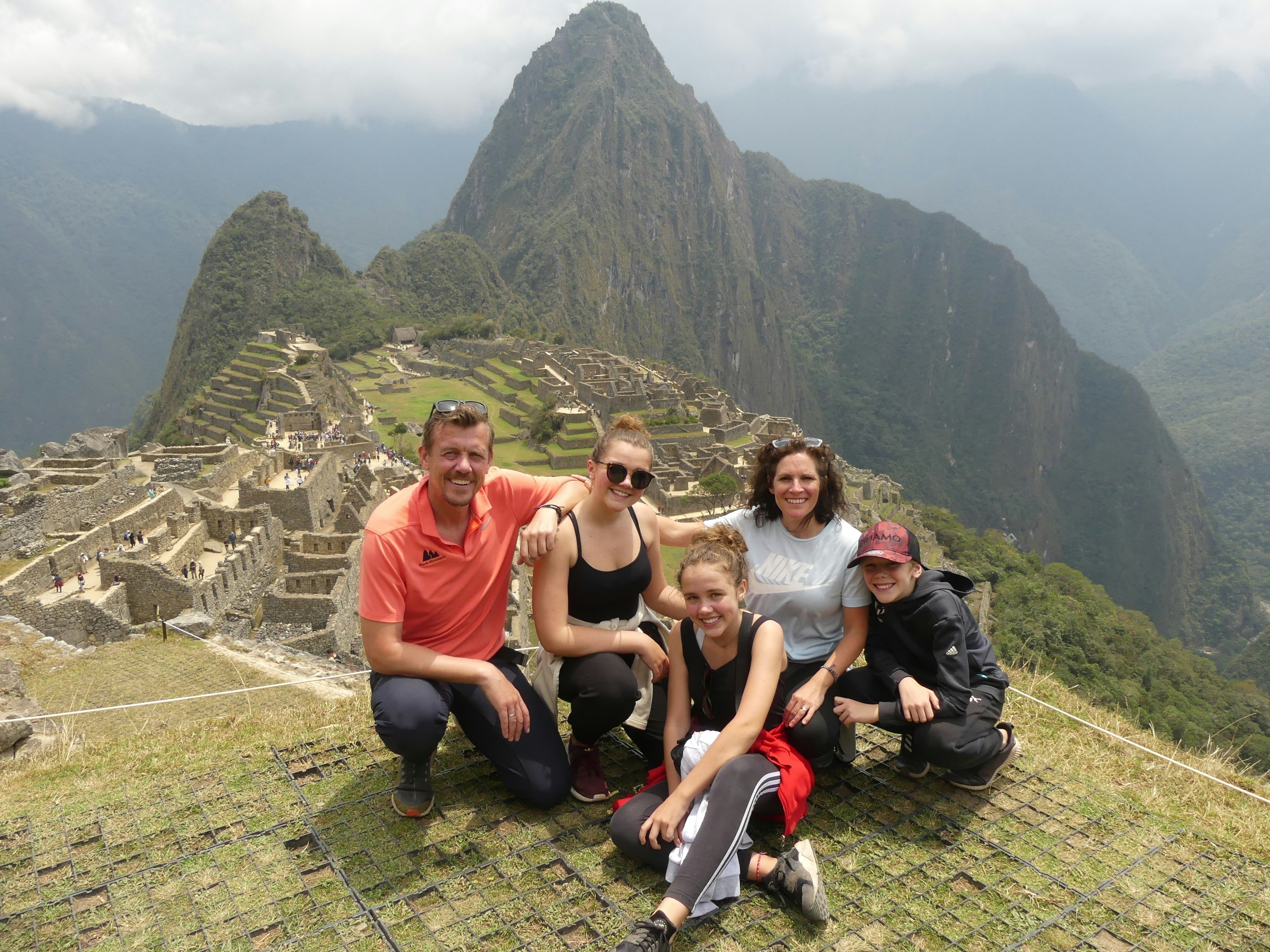
Staying connected
Wolsey Hall’s Danielle Hilton agrees that connectivity can be an issue, but many families on the road get around this by downloading course materials ahead of time when they know they are likely to be without wi-fi for a long period. Other challenges can include keeping motivation when distractions arise.
“This is typical of any student but when families are travelling and encountering exciting and new experiences it can be a greater distraction, so they need to be a little stricter in setting aside time for their studies,” says Danielle. But there are also benefits: “The flexibility to study anytime and anywhere is often cited [as a benefit], as well as the option to be able to continue a stable education. We teach the Cambridge curriculum which is the same as in UK schools and means children can slot back into 'mainstream school' on their return should they wish.”
The Jacobis are another example of a voyaging family who have happily embraced homeschooling.
Katy Jacobi, from Ireland , met her husband Michael, who grew up in Germany , in 1996 and the couple have lived in eight countries together since. They have three children, Emily (17), Sophie (14) and Sean (13) and Michael’s job as a hotelier has brought them to varying destinations from Qatar to Latvia .
Read more: Learn a language while you watch Netflix with the help of this new tool
Since August last year the family is embarking on an extended trip to South America ; a part of the world which had long been on their wish list. Discussions about such a trip had previously arisen, but the couple had held off on the idea due to various worries, mostly about money and education.
“This year, our eldest was approaching her last year of school and about to set out on her own independent journey so we felt this was the last chance for us to travel full time as a complete family,” Katy explains. Everyone was keen to experience something new, learn a new language and culture and create some memorable family moments.
The family started researching homeschooling by reading blogs and using Google to identify schools that offered programs suitable for their children’s needs. Factors such as a school’s ability to support each of their children at different stages of education, cost, and ease of access were all taken into account. Eventually they also decided on Wolsey Hall, as well as Interhigh, with whom Emily takes one subject.
Adapting to changing surroundings
The family's daily routine tends to change depending on what location they are in and what facilities are available. An ideal day starts early, around 7am, with a family or individual workout – AKA a PE lesson – depending on how everyone feels. Morning study leaves afternoons free for tours and experiences.
“The days when we move, there is usually no time to study but we can easily make up for that on the quiet days between trips,” says Katy. “We try to stick roughly with the usual school holiday schedule, but use the flexibility of homeschooling to take our breaks when it best suits us.”
She has found that some learning is done practically, for example history and geography comes to life in Peru while hiking the Andes and visiting various Inca ruins. IT learning, meanwhile, has come in the form of editing short movies and developing the family website . The family is also learning Spanish by immersion and had a family Spanish teacher three times a week in both Peru and Argentina .
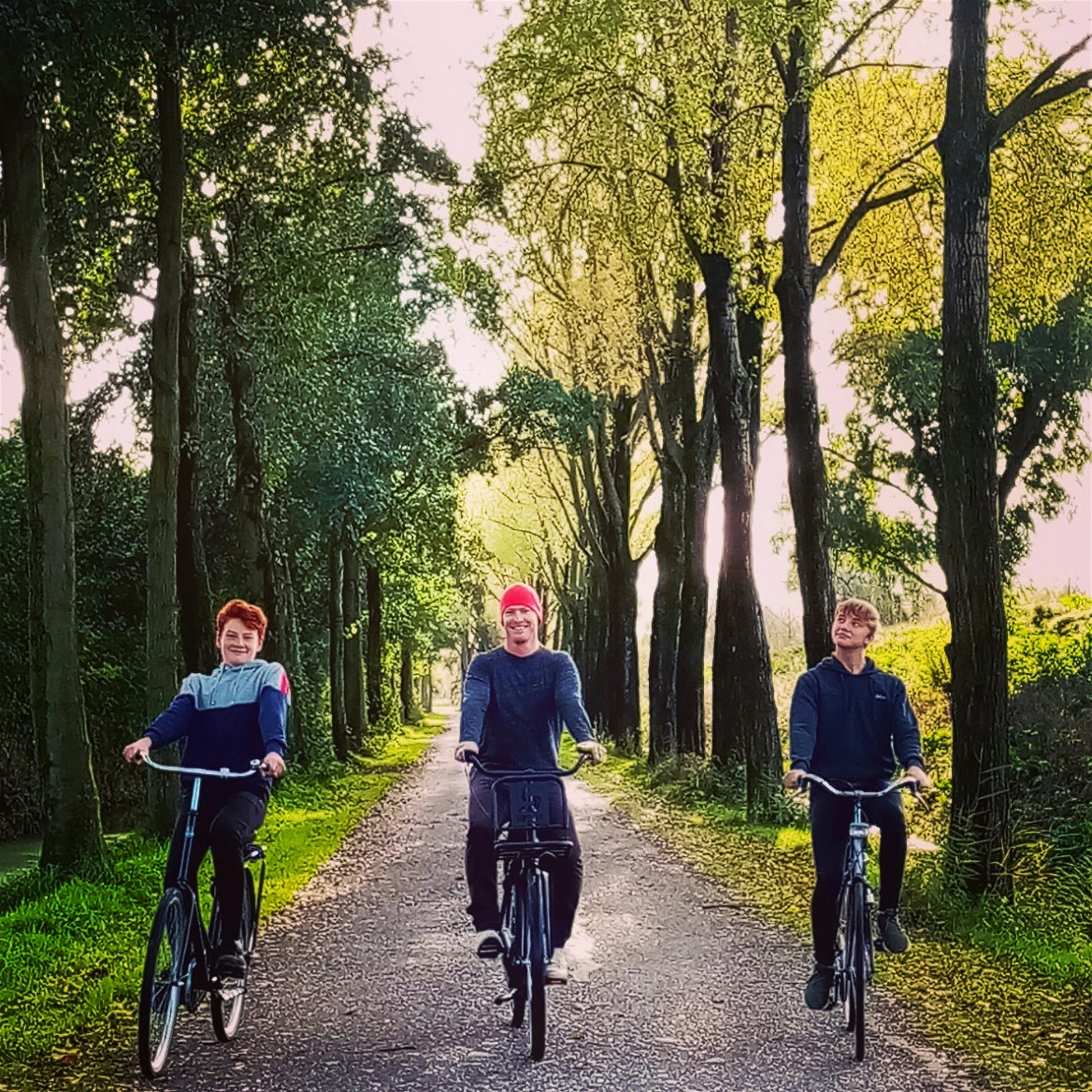
Practical learning
Karen Binedell, whose three children – Sebastian (16), Aiden (14) and Ella (12) – are enrolled in an online college as the family volunteer their way around Europe , believes that homeschooling while travelling brings learning to life. Being on the move allowed the children to see many of the places they were learning about first-hand.
A normal day for the Binedells sees them waking up, packing the caravan beds away and taking turns to get dressed (the caravan’s space is limited) before having breakfast and beginning work.
Karen and her husband Warren will start on their volunteer projects immediately and most mornings the children begin the day with two to three hours homeschooling, making their way through a module, completing a quiz, working on an assignment or having a video call with their language tutors. After lunch, they will then join their parents and assist with whatever needs doing.
Read more: How learning Gaeilge in Ireland expanded more than my vocabulary
“In the past year they have learnt to drive tractors and articulating fork lifts, they have learnt how to operate power tools, they have assisted in removing and replacing a farmhouse roof and have learnt an enormous amount about permaculture, farming and looking after livestock,” Karen says.
She believes that organisation and flexibility are key when homeschooling whilst travelling.
“As you can probably imagine, there are plenty of exciting things to do and see and it's incredibly easy to get distracted. So, four to five mornings are set aside for schoolwork, these could include Saturdays and Sundays depending on our plans, and we try as much as possible to stick to that,” she says.
Her children love the fact that they have had the opportunity to travel extensively without feeling like they have fallen behind in terms of their studies. According to Karen, “they regularly get to put their language skills to use in the different countries we visit and have made friends at every stop.”
The Laramour and Jacobi children also clearly enjoy their non-traditional education experience. “I like being able to study when it suits me best and that it’s easy to catch up on a missed day unlike at real school. I love the field trips, especially Machu Picchu, ” says 14-year-old Sophie Jacobi.
“I love that my classroom is the whole world, and that I’m constantly learning from books, from other people and from the countries we visit,” offers 11-year-old Indy Larmour.
Explore related stories
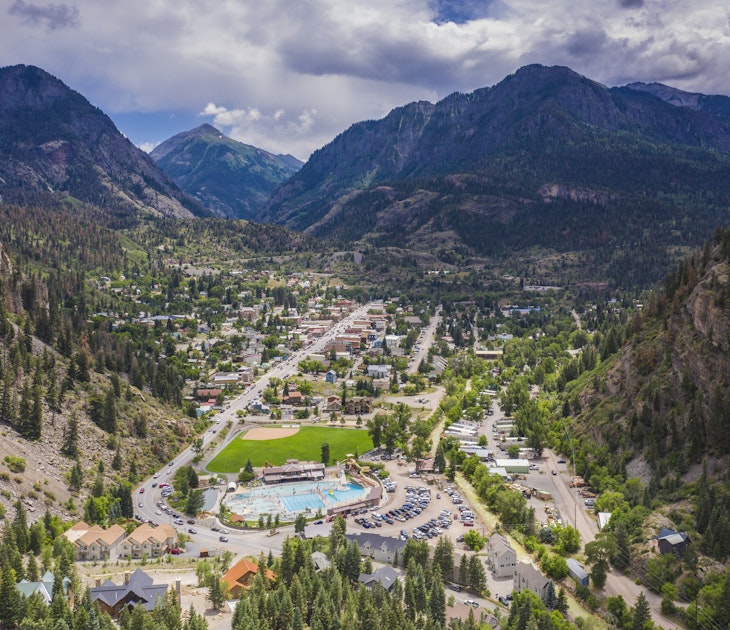
Art and Culture
Mar 13, 2024 • 7 min read
Can't get to Europe this summer? These US alternatives might just do the trick.

Mar 13, 2024 • 6 min read

Mar 5, 2024 • 9 min read

Jan 2, 2024 • 7 min read

Nov 15, 2023 • 5 min read

Oct 20, 2023 • 3 min read

Oct 6, 2023 • 15 min read

Sep 22, 2023 • 11 min read

Sep 1, 2023 • 6 min read

Sep 1, 2023 • 7 min read

Traveling Homeschoolers: How to Homeschool While Traveling
Share with your friends!
Two of the main benefits of homeschooling are flexibility and the ability to take the classroom anywhere.
This year, take advantage of real-life experiences by becoming traveling homeschoolers!
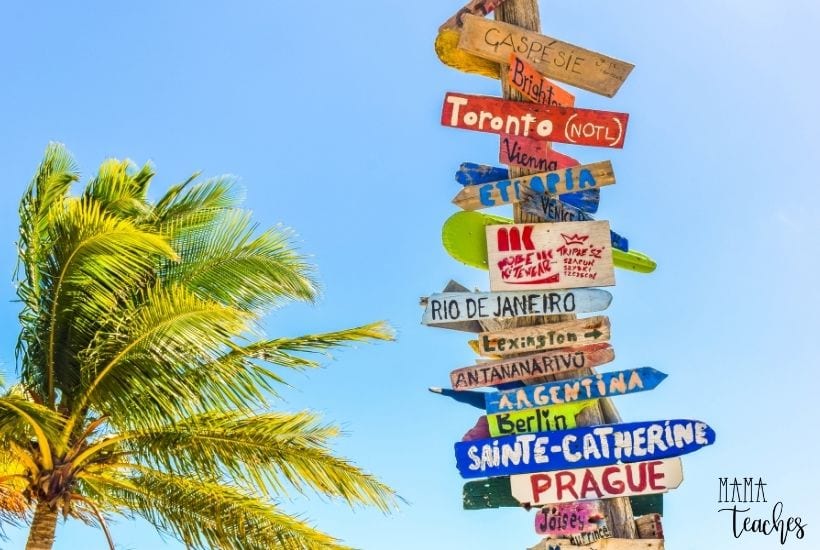
This article contains affiliate links to things that you might like.
Homeschooling while traveling
There are so many incredible and diverse ways to teach your homeschooled children while traveling, whether it’s roaming the U.S. in an RV or wandering the cities of Europe.
Maybe traveling to other countries isn’t in the plans for this year, but don’t count it out for future experiences!
You can still take virtual field trips !
If you’re thinking about homeschooling while traveling, here are some ways you can make it work.
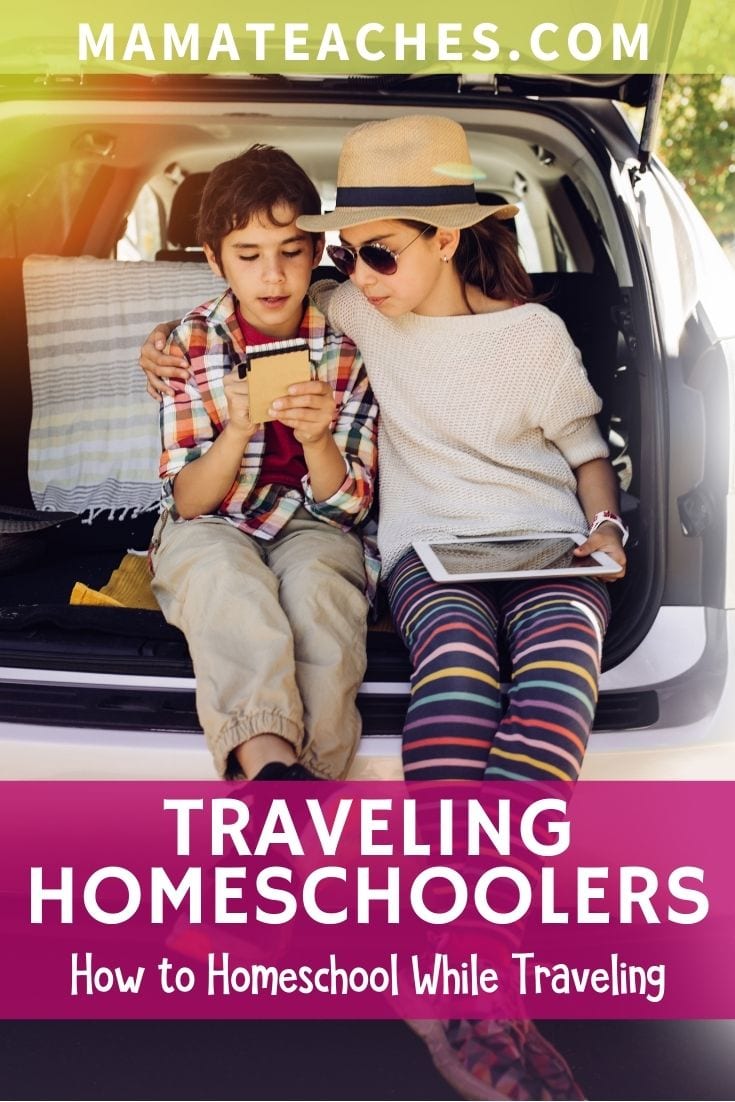
The Traveling Homeschoolers Must-Do List
Experience history first hand.
Yes, you can take your children to museums, but the hard truth is that they aren’t always going to be enamored by them.
In fact, a lot of museums can be downright boring!
Instead, look for more interesting and memorable ways to teach them about the past.
Tour a famous author’s birth home, visit the real-life setting that inspired an artist or take them to a war reenactment.
Those are the things they’ll remember the most!
Use Attractions to Teach
Don’t just take your children to see the Eiffel Tower , put it in context by explaining something fun (like how the French hated it initially).
Want to teach your kids about finance?
Take them to watch the floor of a stock exchange, or observe the exchange at a produce market.
In fact, letting them choose a snack to buy with their own money makes for a much better math lesson than any worksheet!
And if you’re going to visit landmarks and historical places across the US, these free printable American landmarks worksheets are perfect for recording observations!
Traveling homeschoolers know that seeing is believing!
You can read thousands of books about elephants , and never understand their size, or see hundreds of movies about lions without grasping their awe-inspiring grace.
Your child will not likely forget the names or significance of animals after a visit to a zoo!
Don’t Automatically Dismiss Fun Attractions
Sure, a water park, race car track, or theme park may seem devoid of learning experiences, but traveling homeschoolers know better.
Those places are actually a great chance to teach your child about things like velocity or speed, both concepts that are much harder to grasp in a classroom.
Math, language arts, marketing, and more are also great topics to watch for during a day at the theme park!
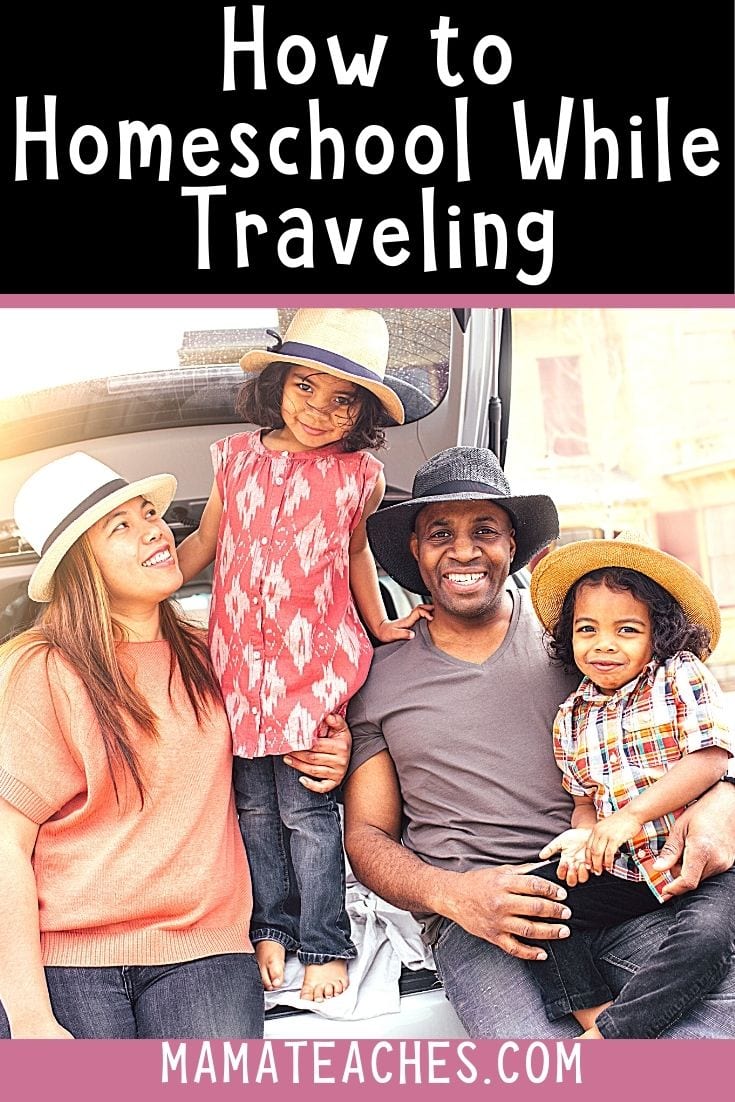
Embrace Their Love for Sports
Watching or playing sports may seem like a mindless activity, but having them keep score as a way to hone their math skills proves otherwise.
Encourage them to notice what plays each team uses to understand strategizing and planning.
Whether it’s a love for water polo, equestrian events, or soccer, there is always something to be learned from watching a match!
Observe Architecture
Observation is key for traveling homeschoolers.
It teaches children about so many things -from physics to history to art.
Visit a city and play a game to find various architectural details in the buildings, and discuss what they mean.
Point out why a column is used for example – both to hold up a structure and as an aesthetic detail.
Talk To Your Kids
No matter where you go, ask your children to what they notice or what questions they have.
The wonderful thing about travel is it stimulates the mind.
If they want to visit a specific attraction, see if you can work it into the schedule.
It’s not hard to homeschool while traveling when you keep an open mind and let your children’s curiosity help shape your travels.
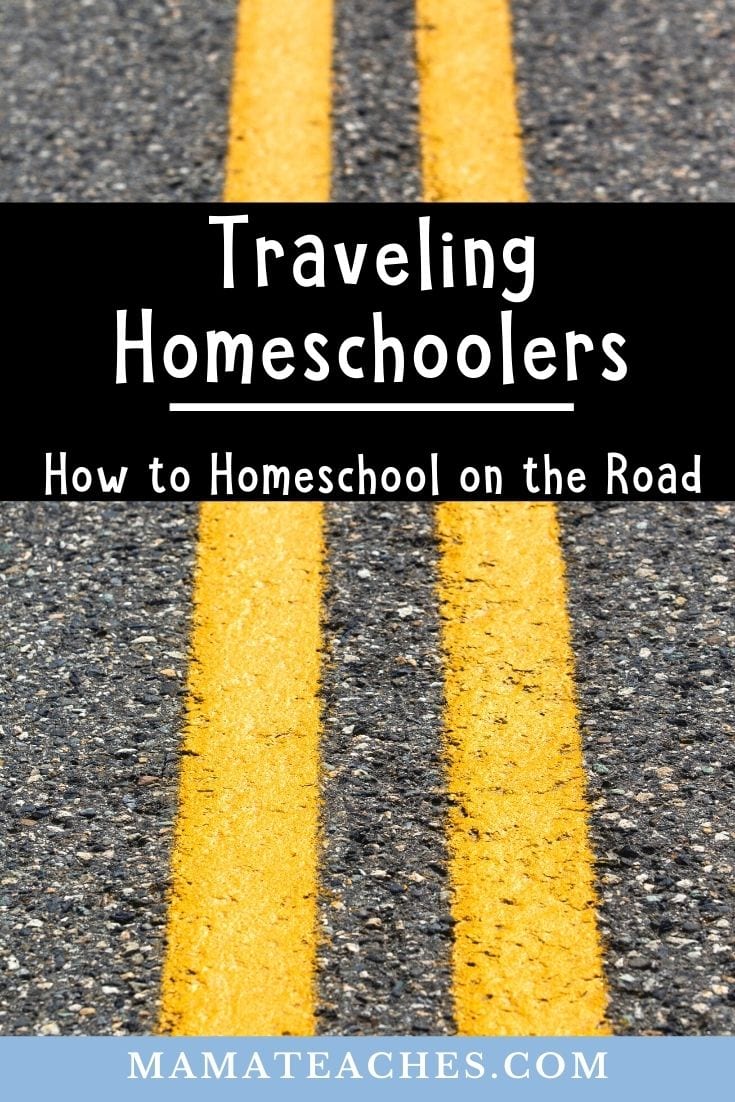
Learn About Different Cultures
Being exposed to various cultures and traditions is exceptionally beneficial to everyone, children, and adults alike.
Discuss how people talk or act differently while traveling throughout the country or around the world.
It is a chance to teach kids about tolerance of the differences between everyone.
It’s also an amazing opportunity to learn about different cultures and traditions!
Use maps to teach
Children can learn a lot by simply helping you plan out the route, or determine which way to turn when you’re on the road.
It is a wonderful way to teach them about geography, as well as enhance their critical thinking and problem-solving skills!
Are You a Traveling Homeschooler?
While it’s perfectly okay to bring along your books and materials while homeschooling on the road, it’s also okay to leave them at home.
A tablet, phone, or computer with Internet connection can provide you with all of the resources you need while traveling.
It also frees your family up to embrace the joy that comes with homeschooling.
You Might Also Like…
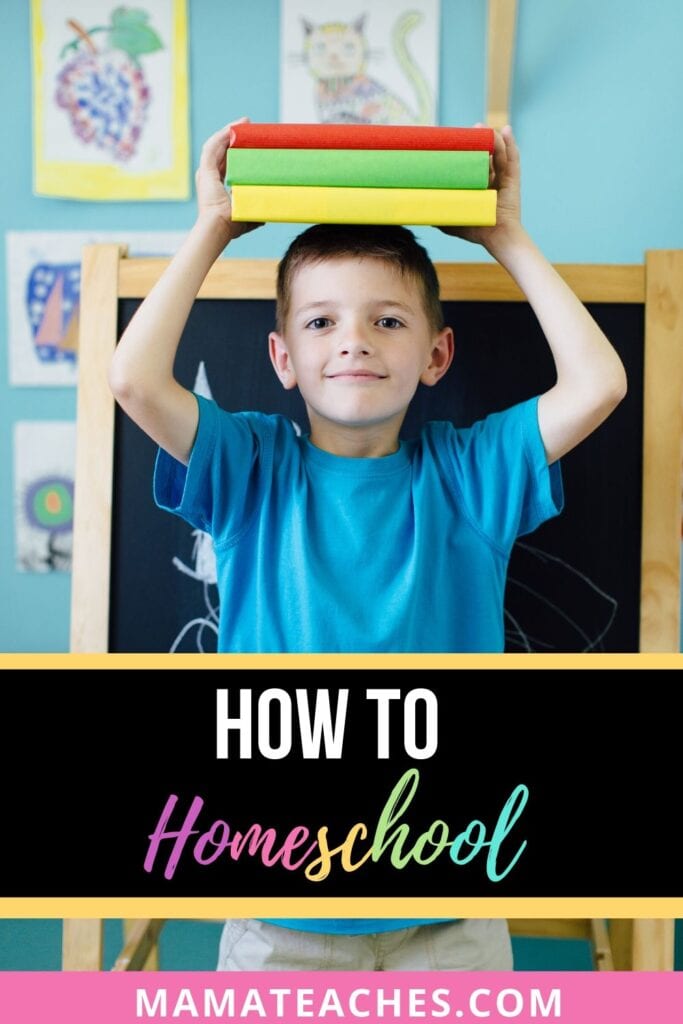
This site uses Akismet to reduce spam. Learn how your comment data is processed .

Homeschooling on the Go: Strategies for World Travelers
by Judith Eve | Mar 10, 2024 | Travel Tips For All Ages

Imagine transforming the world into your classroom, where every destination offers a new lesson. That's the reality for families who've embraced homeschooling while traveling the globe. It's an unconventional approach to education, blending the flexibility of homeschooling with the rich, diverse experiences that travel brings.
For these adventurous families, learning isn't confined to textbooks or a traditional classroom setting. Instead, history comes alive in the ruins of ancient cities, science is explored in the depths of the ocean, and languages are learned in the bustling markets of foreign lands. It's an immersive, hands-on way to educate that's as boundless as the horizon.
Benefits of Homeschooling while Traveling
Homeschooling while traveling offers unique advantages that extend beyond the traditional classroom walls. Families who choose this path find that the world becomes a vast, interactive learning environment where every experience enriches their children's education.
Exposure to Diverse Cultures
Traveling exposes children to different cultures, languages, and ways of life. This immersion teaches them about diversity and tolerance in ways no textbook can. They learn to communicate across language barriers and understand global perspectives, becoming more adaptable and open-minded .
Flexible Learning Schedule
Unlike the strict schedules of traditional schooling, homeschooling on the go allows families to tailor their educational activities to each destination's offerings. Whether it's exploring the rainforests of Costa Rica for a biology lesson or visiting historical monuments in Rome for history, learning is always dynamic. This flexibility also means that families can avoid crowded times, making experiences more enjoyable and personalized.
Real-World Skills Development
Traveling teaches children practical life skills that are invaluable. They learn how to navigate new environments, manage budgets, plan itineraries, and solve problems on the fly. These experiences cultivate independence, confidence, and resourcefulness.
Bonding and Memories
Homeschooling while traveling strengthens family bonds. Parents and children spend quality time together, sharing adventures and learning side by side. These shared experiences create lasting memories and foster a lifelong love for learning and exploration.
The approach to education through travel is profoundly impactful, blending academics with life lessons that prepare children for a globalized world. Families who embark on this journey discover that learning is not confined to the four walls of a classroom but is everywhere, in every experience.
Planning Your Homeschooling Journey

Embarking on a homeschooling journey while traveling the world requires meticulous planning to ensure a smooth and enriching educational experience. One of the first steps is to familiarize oneself with the legalities of homeschooling, which can vary greatly from one country to another. It's essential for families to research and comply with the laws of their home country, as well as any countries they plan to visit.
Creating a flexible curriculum is next on the list. This allows families to incorporate local history, culture, and languages into their lessons, making education a truly immersive experience. Many opt for online resources, which provide a wealth of interactive material adaptable to any location. However, it's also important to balance screen time with hands-on learning opportunities available in the surrounding environment.
When it comes to scheduling, flexibility is key. While maintaining a routine is beneficial, it's also critical to adjust learning hours to suit travel plans and unexpected learning opportunities. Some days might be heavily focused on academics, while others might be dedicated to exploration and practical learning experiences.
Here are a few tips for effective planning:
- Research and comply with homeschooling laws
- Select adaptable online resources
- Create a flexible learning schedule
Incorporating these elements into the planning phase can significantly enhance the homeschooling experience, making it a rewarding journey for both parents and children. Engaging with local communities and utilizing the wealth of knowledge available not only enriches the educational content but also instills a sense of global awareness and adaptability in students, preparing them for a future in an interconnected world.
Incorporating Destinations into the Curriculum

When families embark on a homeschooling journey while traveling, they're presented with a unique opportunity to bring education alive in ways that traditional classrooms can't match. Tying destinations into the homeschooling curriculum allows children to experience firsthand the wonders they're learning about, from the historical streets of Rome to the diverse ecosystems of the Amazon rainforest.
To effectively incorporate destinations into the curriculum, planning plays a crucial role. Before hitting the road, families should research each destination's historical, cultural, and natural significance. This research can guide the creation of a flexible curriculum that weaves in subjects like history, geography, art, and science, using the destinations themselves as a dynamic textbook.
Cultural Immersion and Language Learning become integral parts of education when families take advantage of their travel itinerary. For instance, if a family plans to visit Spain, incorporating Spanish language lessons before and during the visit can enrich the experience. Engaging with locals, trying authentic cuisine, and participating in traditional events can provide deeper cultural understanding and practical language application.
Hands-on Learning Experiences thrive in a travel-based homeschooling environment. Whether it's a science lesson in volcanic Iceland or a history lesson at the Great Wall of China, each destination offers unique opportunities for students to touch, see, and interact with their lessons. Parents are encouraged to schedule visits to museums, historical sites, and natural parks, providing children with a tangible connection to their studies.
Utilizing Online Resources and Local Experts can further enrich the curriculum. Many educational platforms offer location-specific courses that can complement on-site learning. Additionally, hiring local guides or attending workshops can provide expert insights into a region's heritage, adding depth to the educational experience.
As the journey unfolds, families often find that incorporating destinations into their homeschooling curriculum not only enhances learning but also cultivates a global perspective and a deep appreciation for the world's diversity.
Overcoming Challenges on the Road
Traveling the world while homeschooling brings a set of unique challenges that families must navigate. One of the key hurdles is maintaining a consistent educational routine amidst the unpredictability of travel. Unexpected changes in plans or location can disrupt the schooling schedule, making it essential for families to adopt flexible but structured approaches to learning. They often find success by setting aside dedicated study hours each day, regardless of their geographic location.
Another significant challenge is accessing educational resources . While the internet provides a wealth of knowledge, reliable online access is not always guaranteed, especially in remote areas. To combat this, families can:
- Prepare by downloading educational content in advance.
- Invest in portable Wi-Fi devices.
- Use local libraries and bookshops to supplement learning.
Socialization is a concern many parents have when they take their children on the road. The fear that their kids might miss out on making friends or interacting with peers is valid but not insurmountable . Many homeschooling families tackle this challenge by:
- Participating in local events and activities.
- Joining online forums and communities for homeschooling families.
- Arranging meetups with other traveling families.
Finally, adapting to different educational standards and curriculums can be daunting. Each country may have its own approach to subjects, which can enrich a child's education but also complicate the learning process. Here, embracing the diversity in educational content and methodologies becomes not just a strategy but a boon, enabling students to gain a well-rounded global perspective . This approach encourages critical thinking and adaptability, skills that are invaluable in today's interconnected world.
By addressing these challenges with preparation, flexibility, and a willingness to adapt, families can ensure that the educational journey on the road is as rewarding and effective as it is adventurous.
Sustaining a Balance between Education and Exploration

Traveling the world while homeschooling presents a unique opportunity to blend formal education with experiential learning. The key to making this lifestyle successful is sustaining a balance between structured study sessions and unstructured exploration time. Families often find that learning doesn't just happen within the confines of textbooks; it's also about immersing in new cultures, languages, and environments.
To achieve this balance, they should set aside specific hours of the day dedicated solely to education. This structure provides students with the mental space to focus on their studies without the distraction of impending adventures. It's crucial, however, to remain flexible. Some days, learning could stem directly from the day's explorations—such as a visit to a historical site or a local market—transforming these excursions into interactive lessons that cater to the student's curiosity and interests.
Moreover, incorporating educational technology can streamline the learning process, allowing for a seamless transition between studying and exploring. Educational apps and online resources offer personalized learning experiences that can be accessed anywhere, further blurring the lines between education and exploration.
Parents and guardians play a pivotal role in monitoring and adjusting this balance. They're tasked with keeping an eye on their child's educational progress while also gauging when it's time to put the books away and soak in the surroundings. This requires constant communication and reflection on what's working and what needs to be adjusted.
In essence, homeschooling while traveling is about weaving education into the fabric of daily experiences. It's about helping students see the world as their classroom, where lessons aren't bound by pages but are lived through hands-on experiences. This approach not only enriches their education but also instills a lifelong love for learning and discovery.
Key Takeaways
- Homeschooling while traveling the world presents a unique opportunity to turn global destinations into vibrant classrooms, offering lessons beyond traditional education through immersion in diverse cultures, languages, and environments.
- The approach fosters flexibility in learning schedules, allowing families to explore subjects like history, science, and languages more dynamically and in real-time, based on their travel itinerary.
- Travel-based homeschooling enhances real-world skill development in children, including problem-solving, budgeting, and adaptability, while significantly strengthening family bonds through shared experiences and adventures.
- Successful planning for homeschooling on the move involves understanding homeschooling legalities, creating adaptable curriculums that incorporate local culture and geography, and maintaining a balance between structured learning and exploration.
- Overcoming challenges such as maintaining educational consistency, accessing resources in remote areas, and ensuring socialization requires preparation, flexibility, and a willingness to utilize both online and local community resources.
- Achieving a balance between education and exploration is crucial, with technology playing a key role in facilitating seamless learning experiences that complement physical travels, ultimately cultivating a global perspective and a deep appreciation for learning among students.
Homeschooling while traveling the world offers an unparalleled opportunity to blend learning with real-world experiences. By setting dedicated study hours yet staying open to the spontaneous educational moments that travel brings, families can ensure their children receive a rich and varied education. It's about more than just hitting the books—it's about opening doors to new cultures, languages, and ways of thinking. With the right balance of technology and hands-on learning, the journey itself becomes a classroom, turning every day into an adventure in education. This approach not only keeps students engaged but also instills in them a lifelong passion for discovery. So pack your bags and your textbooks because the world is waiting to teach you its lessons.

Hello, explorers! I’m Judith Eve, the founder and principal writer for HeyFamilyTravelers and CruisingtonPost.
My home is nestled in beautiful South Florida, where the sun kisses the waves and the beach stretches out like an endless welcome mat. It’s a gorgeous place that brings joy and inspiration, but my spirit has always been captivated by the allure of distant shores and unique cultures. The thrill of packing a suitcase, stepping aboard a plane or a ship, and waking up in a new destination never fails to ignite my soul.
I started my life’s adventure as a mother of two wonderful children who have since blessed me with three delightful grandchildren. The memories we’ve built exploring the globe together are the treasures of my heart. This love for family and travel is the core of HeyFamilyTravelers, a place where I share our stories, tips, and experiences, aiming to inspire other families to embark on their own adventure-filled journeys.
Over the years, my family and I have discovered our shared passion for cruising. There is something incredible about floating on the endless sea, with world-class service, fabulous entertainment, and the excitement of exploring multiple destinations in one trip. My love for this unique form of travel led me to establish CruisingtonPost, another platform where I focus on sharing our sea-borne adventures, cruise reviews, and travel advice.
My objective is simple. I want to encourage everyone, especially families and seniors, to step out of their comfort zones, explore the world, and create their own cherished memories. Life’s journey is full of beautiful places and moments waiting to be discovered. I hope that through my stories and articles, you’ll find the inspiration and practical guidance you need to set sail on your own grand adventure.
Thank you for stopping by. I look forward to sharing our family’s escapades with you and hearing about your own travels!
Happy Travels, Judith Eve

Affordable Family Vacation Ideas: Fun and Budget-Friendly Ways to Travel
Affordable family vacation ideas are becoming increasingly popular among families looking to spend quality time...

Best Times to Book Budget-Friendly Family Safari Trips in Tanzania
Tanzania is a country in East Africa that is home to some of the world's most spectacular wildlife reserves. It is a...

Eco-Friendly Spring Vacation Spots for Families
As the world becomes increasingly aware of the impact of travel on the environment, more and more families are seeking...
Don't Miss Out On Travel Info!
Disclaimer - Curation Policy - Amazon Affiliate Disclosure - Terms and Conditions - Privacy Policy
The Ultimate Guide to Homeschool Travel: Explore, Learn, and Grow
In today’s fast-paced world, where boundaries are blurring, and the traditional ways of doing things are constantly being challenged, the concept of education is undergoing a significant transformation. One such evolution is the rise of homeschool travel. This emerging trend is reshaping the way parents think about education, offering a fresh perspective that combines the thrill of exploration with the essence of learning.
- 1.1 Decoding Homeschool Travel
- 1.2 The Surge in Homeschool Travel’s Popularity
- 2.1 Real-World Experiences: The Best Teacher
- 2.2 Cultivating Resilience, Adaptability, and Problem-Solving Skills
- 2.3 A Deep Dive into Cultural Immersion
- 3.1 Selecting the Ideal Destinations: Aligning Interests with Learning
- 3.2 Integrating Travel Experiences with the Curriculum
- 3.3 Budgeting Wisely for Extended Travel
- 4.1 Striking the Right Balance: Education vs. Exploration
- 4.2 The Unpredictability of Travel: Preparing for the Unexpected
- 4.3 The Emotional Challenge: Dealing with Homesickness
- 5.1 Virtual Gatherings: Online Forums and Support Groups
- 5.2 Tailored Learning: Curriculum Ideas for Traveling Families
- 5.3 Wisdom from the Road: Tips from Experienced Homeschool Travelers
- 6.1 Prioritizing Health: Precautions for Families on the Move
- 6.2 Navigating New Environments: Keeping Children Safe
- 6.3 Guarding Essential Documents: The Backbone of Travel
- 7.1 Adventures in Asia: A Tapestry of Cultures and Lessons
- 7.2 Roadschooling Across the USA: A Journey Through Time and Terrain
- 7.3 Sailing and Studying: Charting Unknown Waters
- 8 Conclusion
Homeschool Travel: The Fusion of Education and Exploration
Often dubbed as “road schooling,” homeschool travel is not just a buzzword; it’s a lifestyle choice. It signifies a shift from the four walls of a classroom to the vast expanse of the world. Imagine learning geography by trekking through the Amazon rainforest, understanding history by walking the corridors of the Colosseum, or grasping the principles of marine biology by snorkelling in the Great Barrier Reef. That’s homeschool travel for you – a hands-on, immersive learning experience that goes beyond textbooks.
For families who embrace this approach, the world becomes a vast classroom. Every destination offers lessons, every culture provides insights, and every experience contributes to the holistic development of a child.
Decoding Homeschool Travel
So, what exactly is homeschool travel? It’s an educational philosophy that integrates travel into the homeschooling curriculum. Rather than being tethered to a fixed location, families who adopt homeschool travel prioritize experiential learning. They believe that real-world experiences, when combined with structured learning, can offer unparalleled educational outcomes.
This doesn’t mean that traditional subjects are ignored. Instead, they are enhanced. A lesson in history becomes more vivid when visiting ancient ruins. A language class is more effective when practised with locals. Science comes alive when observed in nature. In essence, homeschool travel amplifies learning by adding a layer of practical experience to theoretical knowledge.
The Surge in Homeschool Travel’s Popularity
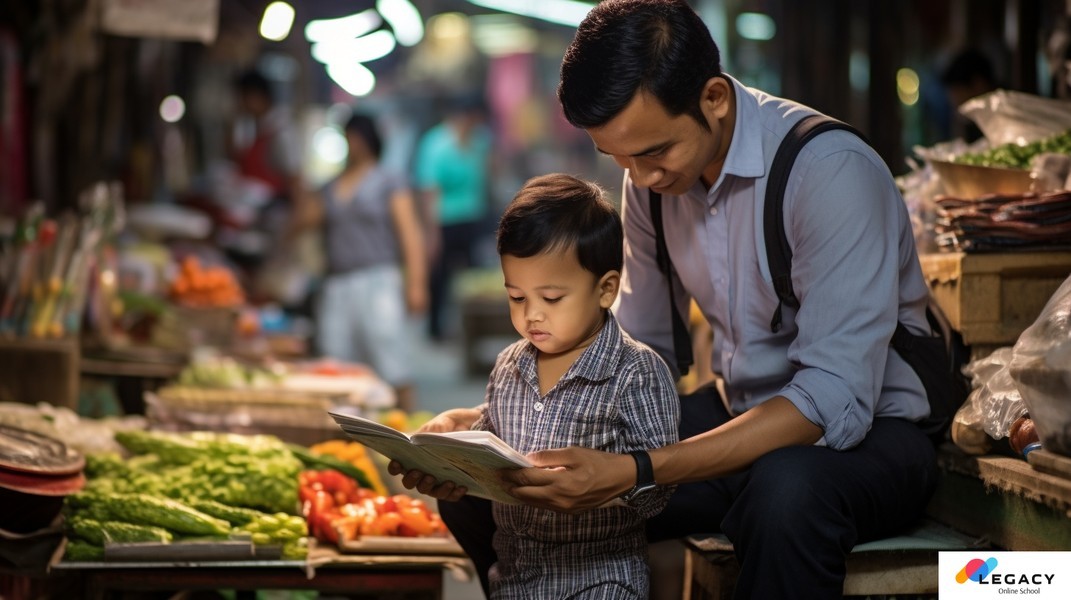
The concept of homeschool travel isn’t entirely new. Nomadic communities have been practising it for ages. However, its recent surge in popularity can be attributed to several factors, with the digital revolution being at the forefront.
The internet has democratized information. Today, a plethora of online resources, ranging from e-learning platforms to digital libraries, are available at our fingertips. This has empowered parents to take charge of their children’s education, providing them with the tools and resources needed to teach effectively, irrespective of their location.
Moreover, the rise of remote work and the gig economy has offered parents the flexibility to manage their careers while being on the move. This has further fueled the homeschool travel movement, allowing families to travel extensively without compromising on their children’s education.
Additionally, a global community of homeschool travellers has emerged, offering support, sharing resources, and exchanging tips. This sense of community has made the transition to homeschool travel smoother for many families, assuring them that they are not alone in this journey.
Benefits of Homeschool Travel
The concept of homeschool travel transcends the mere act of studying while travelling. It’s a holistic approach to education that intertwines the thrill of exploration with structured learning. While the idea might seem unconventional to some, the myriad benefits it offers are undeniable. Let’s delve deeper into the advantages that make homeschool travel a compelling choice for many families.
Real-World Experiences: The Best Teacher

Textbooks, while informative, often present information in a vacuum, detached from real-world contexts. Homeschool travel bridges this gap by offering children firsthand experiences that breathe life into textbook lessons.
Imagine the wonder in a child’s eyes as they stand before the majestic Pyramids of Egypt, feeling the weight of millennia under the desert sun. Or the awe as they snorkel through the vibrant ecosystems of the Great Barrier Reef, witnessing marine life in its natural habitat. These aren’t mere tourist experiences; they are profound educational moments. The world, in all its vastness, becomes a dynamic classroom where lessons are lived, not just learned.
Such experiences not only make learning more engaging but also foster a deeper understanding of subjects. History, geography, science, and even arts come alive, making the learning process more memorable and effective.
Cultivating Resilience, Adaptability, and Problem-Solving Skills
Travel, by its very nature, is unpredictable. Missed flights, language barriers, unfamiliar foods, and cultural nuances are all part and parcel of the journey. For children, these challenges become invaluable life lessons.
Navigating a bustling market in Bangkok, ordering food in Mandarin, or figuring out public transport in Berlin – these situations push children out of their comfort zones. They learn to adapt, think on their feet, and find solutions to unexpected problems. Such experiences instil resilience, teaching them that setbacks are just stepping stones to success.
Moreover, these challenges often require children to employ critical thinking, negotiation skills, and even basic math in real time, reinforcing their academic lessons in practical scenarios.
A Deep Dive into Cultural Immersion
In today’s globalized world, understanding and appreciating diverse cultures is more crucial than ever. Homeschool travel offers children an unparalleled opportunity for cultural immersion. It’s one thing to read about the Diwali festival in India or the cherry blossom season in Japan; it’s entirely another to experience them firsthand.
By interacting with locals, participating in traditional activities, and even attending local schools or workshops, children gain a profound understanding of different cultures. They learn languages organically, understand global etiquettes, and appreciate the rich tapestry of traditions that our world offers.
This immersion fosters a sense of global citizenship in children. They learn to see beyond borders and prejudices, recognizing the shared humanity that binds us all. Such experiences not only enrich their minds but also their souls, shaping them into well-rounded individuals ready to thrive in a multicultural world.
Planning Your Homeschool Travel Journey
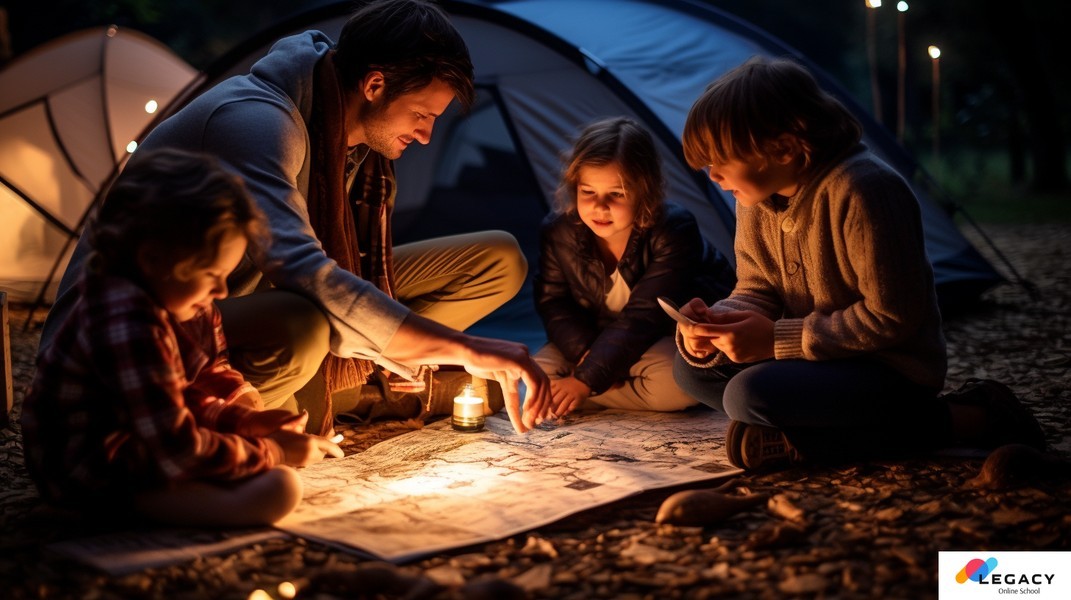
The allure of homeschool travel is undeniable. The promise of combining education with the thrill of exploration is a dream for many families. However, turning this dream into reality requires careful planning and preparation. A successful homeschool travel journey is not just about packing bags and setting off; it’s about creating a structured educational environment on the move. Here’s a detailed guide to help you navigate the intricacies of planning your homeschool travel adventure.
Selecting the Ideal Destinations: Aligning Interests with Learning
The world is vast, and the possibilities for travel are endless. However, when it comes to homeschool travel, the choice of destination plays a pivotal role. It’s not just about visiting popular tourist spots; it’s about finding locations that align with your child’s educational curriculum and personal interests.
For instance, if your child is studying Renaissance art, a trip to Italy can offer invaluable insights. They can witness the masterpieces of Michelangelo, Leonardo da Vinci, and Raphael firsthand, turning museums and historical sites into interactive classrooms. Similarly, if marine biology is on the agenda, the Maldives or the Great Barrier Reef can be ideal destinations, offering hands-on learning experiences amidst vibrant marine ecosystems.
The key is to strike a balance between educational value and the excitement of exploration. Research destinations, consider the learning opportunities they offer, and align them with your child’s academic and personal interests.
Integrating Travel Experiences with the Curriculum
One of the primary challenges of homeschool travel is ensuring that the travel experiences complement the academic curriculum. It’s about making the most of every journey, turning each adventure into a learning opportunity.
For instance, a visit to a volcano in Iceland or Hawaii can be seamlessly integrated into a geology lesson, offering practical insights into volcanic formations, tectonic movements, and the earth’s geothermal activities. Similarly, a trip to a bustling local market in Marrakech or Bangkok can be an excellent practical lesson in math, where children can learn about currency conversion, budgeting, and negotiation.
The idea is to view each travel experience through the lens of education. With a bit of creativity and planning, every journey, whether it’s a trek through a rainforest or a visit to a historical monument, can be turned into an enriching educational experience.
Budgeting Wisely for Extended Travel
While the idea of travelling the world and educating your child on the go sounds exciting, it comes with its set of financial implications. Extended travel requires careful financial planning and budgeting.
Start by listing down the major expenses, including accommodation, transportation, food, educational resources, and recreational activities. Research accommodation options, from budget hostels to mid-range hotels, and consider alternative accommodations like vacation rentals or even house swaps.
Transportation can be a significant expense, especially if you’re planning to visit multiple countries. Look for deals, consider budget airlines, and explore overland travel options like trains or buses, which can often be more economical.
Remember, many educational sites, museums, and attractions offer reduced rates for students or educational groups. Always inquire about discounts and consider investing in city passes or membership cards that offer free or discounted entries.
Additionally, factor in the costs of educational resources, including online courses, textbooks, and learning tools. With the rise of digital learning platforms, many resources are available online, often at a fraction of the cost of traditional materials.
Challenges of Homeschool Travel
The allure of homeschool travel is undeniable. The promise of a world-class education, combined with the thrill of exploration, is a dream for many families. However, like any ambitious endeavour, homeschool travel is not without its challenges. While the rewards are plentiful, families must be prepared to face and overcome certain hurdles to ensure a smooth and enriching journey. Here’s a closer look at some of the challenges associated with homeschool travel and strategies to navigate them.
Striking the Right Balance: Education vs. Exploration
One of the primary challenges of homeschool travel is finding the right balance between structured education and free exploration. On one hand, there’s the world out there, waiting to be explored, with its myriad of experiences, adventures, and discoveries. On the other hand, there’s the responsibility of ensuring that the child’s education is not compromised.
The key lies in flexibility. While it’s essential to have a structured curriculum, it’s equally important to remain adaptable. For instance, if you stumble upon a local festival or a unique cultural event, it might be worth deviating from the planned curriculum for a day to immerse in this spontaneous learning opportunity. Such experiences can offer invaluable lessons that go beyond textbooks.
However, it’s crucial to ensure that these detours don’t derail the overall educational goals. Regular assessments, either through tests, assignments, or discussions, can help gauge the child’s progress and ensure they are on track academically.
The Unpredictability of Travel: Preparing for the Unexpected
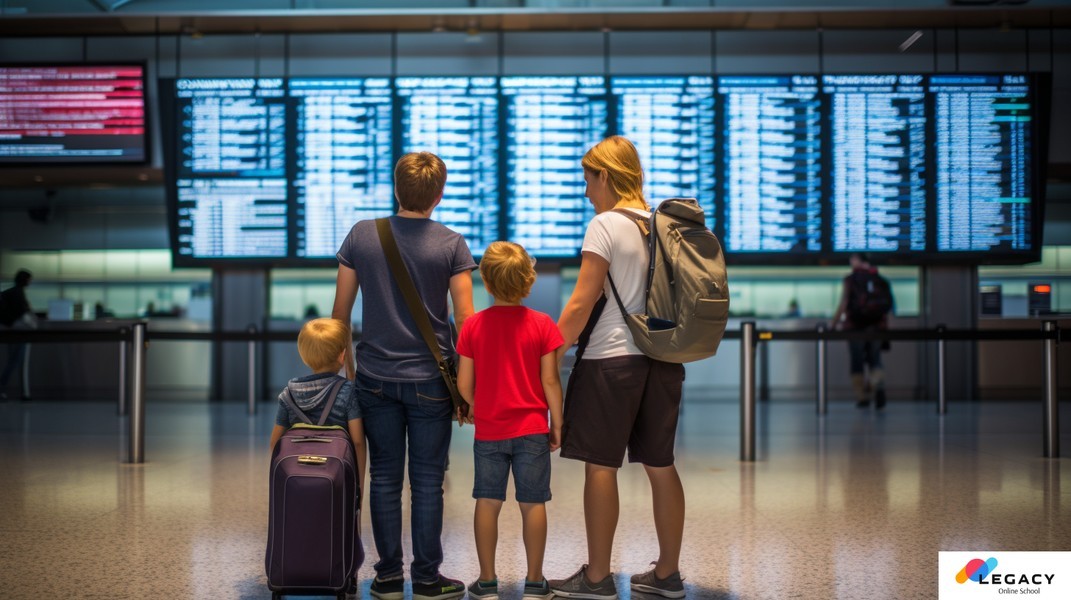
Travel, by its very nature, is fraught with uncertainties. Delayed flights, lost luggage, language barriers, or even a sudden change in weather can throw a wrench in the best-laid plans. For families on a homeschool travel journey, these challenges can be even more daunting, as they have the added responsibility of ensuring continuity in their child’s education.
Preparation is the best defence against such unpredictabilities. Always have a backup plan. For instance, if you’re relying on online resources for education, ensure you have offline backups in case of unreliable internet connections. Equip yourself with essential travel apps, translation tools, and local emergency numbers.
Moreover, use these challenges as learning opportunities. A missed flight can teach children about patience and problem-solving, while a language barrier can be an excellent lesson in communication and understanding.
The Emotional Challenge: Dealing with Homesickness
The pangs of homesickness can sometimes overshadow the thrill of exploration. Being away from familiar surroundings, friends, and extended family can be emotionally challenging, especially for children.
To combat homesickness, establish routines that provide a sense of normalcy. Whether it’s a specific mealtime, a bedtime story ritual, or weekly video calls with loved ones back home, these routines can offer comfort and stability in unfamiliar environments.
Additionally, create a portable “home” for your child. This could be a special blanket, a set of toys, or even a playlist of their favourite songs. Familiar items can provide emotional comfort and anchor them amidst the constantly changing surroundings.
Homeschool Travel Communities and Resources
The concept of homeschool travel, while exciting, can also be daunting for families taking the plunge for the first time. However, the good news is that they’re not alone. Over the years, a vibrant community of homeschool travellers has emerged, offering a wealth of resources, insights, and support to newcomers. From online forums to tailored curricula, families have a plethora of tools at their disposal to make their homeschool travel journey enriching and seamless. Let’s delve deeper into these resources and communities.
Virtual Gatherings: Online Forums and Support Groups
The digital age has made it easier than ever for like-minded individuals to connect, share, and learn from each other. Numerous online forums and support groups cater specifically to homeschool travelling families. These platforms serve as virtual meeting grounds where families can:
- Share their travel experiences, from the highs of witnessing the Northern Lights to the challenges of managing a curriculum on the move.
- Seek advice on various aspects of homeschool travel, be it visa regulations, destination recommendations, or educational resources.
- Find camaraderie and solace, knowing that they are part of a global community that understands and shares their passion for travel and education.
Platforms like Facebook, Reddit, and dedicated homeschool travel websites host these groups, making it easy for families to join and participate.
Tailored Learning: Curriculum Ideas for Traveling Families
One of the primary concerns for homeschooling travelling families is ensuring that their children receive a comprehensive education that aligns with their travel experiences. Thankfully, there are countless curricula designed with travelling families in mind.
- Geography-Based Lessons: These curricula focus on the geographical aspects of destinations, teaching children about the topography, climate, and ecosystems of the places they visit.
- Cultural Studies: Tailored to immerse children in the cultures they encounter, these lessons delve into the history, traditions, languages, and customs of different regions.
- Experiential Learning: Some curricula prioritize hands-on experiences, encouraging children to learn through activities like local craft workshops, cooking classes, or nature treks.
Many educational platforms and homeschooling websites offer these tailored curricula, often accompanied by resources like worksheets, interactive modules, and assessment tools.
Wisdom from the Road: Tips from Experienced Homeschool Travelers
There’s no better teacher than experience. Many families who’ve been on the homeschool travel journey for years have a wealth of insights to offer. From managing time zones to finding the best educational apps, these seasoned travellers have faced and overcome numerous challenges.
Blogs, vlogs, podcasts, and even books authored by experienced homeschool travellers serve as invaluable resources. They offer practical tips, hacks, and advice that can save newcomers from common pitfalls and enhance their overall experience.
Safety Tips for Homeschool Travel
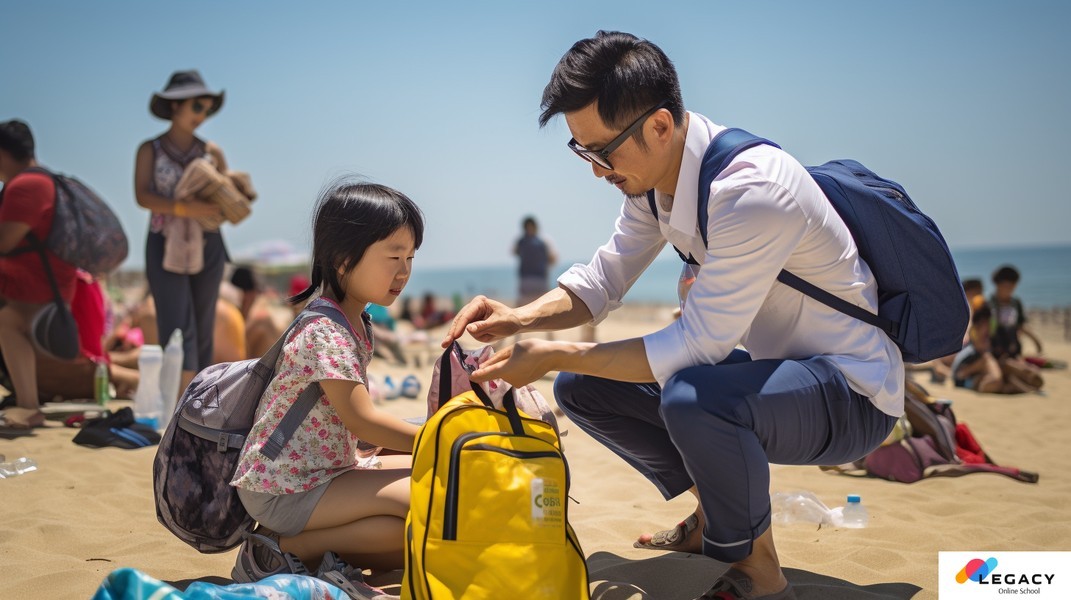
Travelling the world as a homeschooling family is an exhilarating experience filled with discoveries, cultures, and adventures. However, with the thrill of exploration comes the responsibility of ensuring the safety of your family. When you’re on the move, especially with children, safety should never be compromised. From health precautions to safeguarding essential documents, here’s a comprehensive guide to ensuring your homeschool travel journey is as safe as it is enriching.
Prioritizing Health: Precautions for Families on the Move
Travel exposes families to diverse environments, each with its unique set of health challenges. Being prepared can make all the difference.
- Vaccinations: Before embarking on your journey, consult with a travel doctor or clinic to ensure your family is up-to-date with all recommended vaccinations for your intended destinations. Some countries may also require proof of certain vaccinations upon entry.
- Awareness of Health Risks: Research potential health risks associated with your destinations. Whether it’s malaria in tropical regions or altitude sickness in mountainous areas, being informed will help you take necessary precautions.
- First-Aid Kit: Always carry a well-stocked first-aid kit tailored to your family’s needs. Include essentials like band-aids, antiseptics, pain relievers, and any prescription medications.
- Local Medical Facilities: Familiarize yourself with the medical facilities available in your travel destinations. Know the locations of the nearest hospitals, clinics, and pharmacies, and keep a list of emergency contact numbers handy.
Navigating New Environments: Keeping Children Safe
New environments, while exciting, can also pose challenges, especially when travelling with children.
- Stay Vigilant: Always keep an eye on your children, especially in crowded or unfamiliar places. Consider using child safety harnesses or wristbands for younger kids in bustling areas.
- Safety Rules: Teach your children essential safety rules tailored to your travel environment. This includes not wandering off, avoiding interactions with stray animals, and being cautious near water bodies.
- Emergency Protocols: Ensure your children know what to do in case they get separated from you. They should have a contact card with essential details and know how to approach trustworthy individuals, like police officers or other families, for help.
Guarding Essential Documents: The Backbone of Travel
Travel documents are the lifeline of any journey, and their safety is paramount.
- Organized Storage: Keep all essential documents, including passports, visas, travel insurance, and educational records, in an organized and accessible manner. Consider using a travel wallet or organizer.
- Digital Backups: In today’s digital age, it’s wise to have electronic copies of all crucial documents. Store them securely in cloud storage or on encrypted USB drives. This ensures you have access to them in case of loss or theft.
- Educational Records: For homeschooling families, educational records are as vital as passports. Keep detailed records of your child’s academic progress, including curricula, assignments, and assessments. These might be required for future academic transitions or even border crossings in certain countries.
Homeschool Travel: Real-life Stories
The concept of homeschool travel, while intriguing on paper, truly comes alive when narrated through the experiences of those who’ve lived it. Real-life stories of families who’ve taken the plunge traded traditional classrooms for the vast expanse of the world, and woven education into their travels are both inspiring and enlightening. Here are three such tales from families who’ve embraced the homeschool travel lifestyle, each with its unique flavour and lessons.
Adventures in Asia: A Tapestry of Cultures and Lessons
The Thompson family, comprising two parents and their three children, embarked on a year-long vacation through the diverse landscapes of Asia. From the bustling streets of Bangkok to the serene monasteries of Bhutan, their journey was a tapestry of cultures, experiences, and lessons.
The family highlights their time in Vietnam, where the children learned about the history of the Vietnam War firsthand, visiting historical sites and interacting with locals who shared personal stories. In Japan, traditional tea ceremonies became lessons in discipline, patience, and art. However, the journey wasn’t without its challenges. Navigating language barriers, adjusting to varied cuisines, and managing health in different climates tested the family’s resilience.
Yet, the Thompsons believe that the experiences gained, the friendships forged, and the memories made far outweighed the challenges. Their story is a testament to the richness of experiential learning and the bonds strengthened when a family explores together.
Roadschooling Across the USA: A Journey Through Time and Terrain
The Martinez family’s story is one of exploration on wheels. With their RV, fondly named “Wanderlust,” they set out to discover the vast landscapes of the USA. From the dense forests of the Pacific Northwest to the sandy beaches of Florida, their journey was a lesson in geography, history, and diversity.
The children, while on the road, delved deep into the history of the American Civil War as they visited battlefields and museums. The vast canyons of Arizona became natural classrooms for geology, while the vibrant cities offered insights into urban development, art, and culture.
The family emphasizes the importance of flexibility in road schooling. Rainy days became opportunities for indoor lessons, board games, and reading, while sunny days were reserved for outdoor exploration and hands-on learning. Their story showcases the beauty of learning at one’s own pace, driven by curiosity and the environment.
Sailing and Studying: Charting Unknown Waters
The adventure of the Rodriguez family is unlike any other. With a passion for sailing and a belief in homeschooling, they combined the two to embark on an oceanic educational journey. Their boat, “The Sea Scholar,” became both their home and classroom as they navigated the waters of the Pacific and Atlantic.
Marine biology lessons were conducted amidst dolphins and coral reefs, while astronomy sessions were held under starlit skies. The children learned navigation using the stars, maps, and modern technology. The vastness of the ocean taught them humility, while the rhythms of the sea instilled discipline and respect for nature.
The family faced challenges, from turbulent waters to maintaining a routine amidst the unpredictability of the sea. Yet, their story is one of courage, passion, and the belief that learning has no boundaries.
Homeschool travel offers a world of opportunities for families seeking a unique educational experience. By blending travel with learning, children gain a broader perspective, develop essential life skills, and create memories that last a lifetime. As the world becomes more interconnected, the possibilities for homeschool travel are boundless. So pack your bags, open your mind, and embark on the educational adventure of a lifetime.
Related Posts

Frequently Asked Questions
About author
Vasilii Kiselev is an influential figure in online and virtual education. He is a driving force behind the transformation of education. He is a co-founder and advisor at Legacy Online School. He leads the development of dynamic, interactive, and accessible virtual learning. Vasilii has a lot of knowledge in the education field. It spans from K-12 to homeschooling alternatives. He values using cutting-edge tech. It is to give great education to students.
Vasilii sees Legacy Online School as more than instruction. It’s a platform to inspire and empower. It aims to prepare students for a future where digital skills are key. His deep contributions to the industry show his unwavering commitment. He commits to improving homeschooling and online schooling options. He is making sure learners of all ages get a full, engaging, and flexible education.
Do you have any questions?

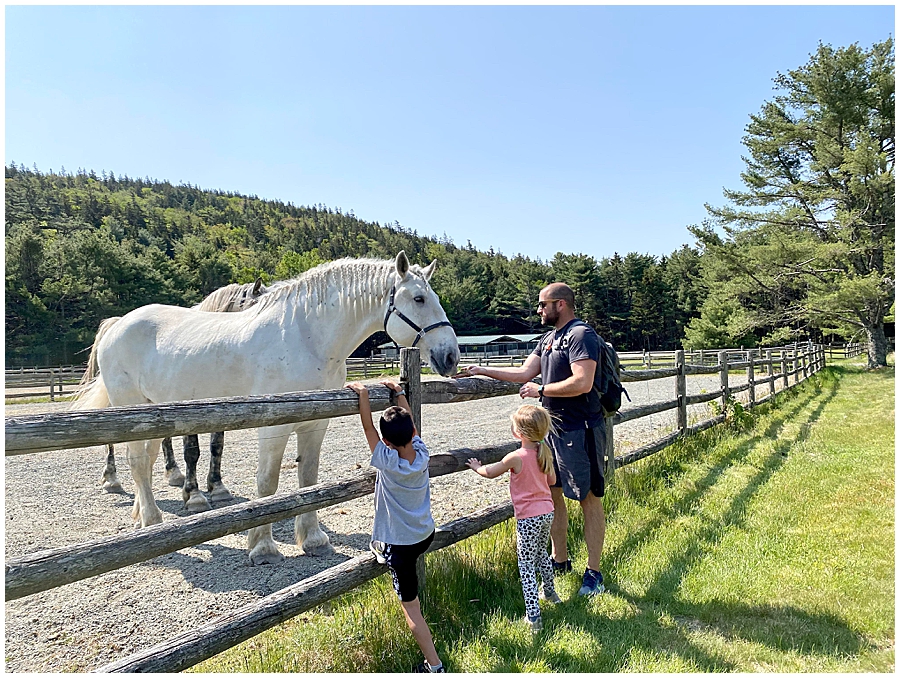
Unlocking the World with Travel Homeschool
If you are a fellow adventure-seeker and homeschool enthusiast you are in the right place! If you’re reading this, chances are you share our passion for education on the road and are looking to travel homeschool.
We are a homeschooling family who loves to travel, affectionately known as “roadschoolers.” Every year, we pack up our camper and journey south from the picturesque landscapes of New England to embark on an exciting adventure that combines learning with wanderlust. We also love to take week long trips to different countries outside of the United States, all while still homeschooling .
Today, we’re thrilled to share our experiences and insights into the world of travel homeschool . So, fasten your seatbelts, grab your notebooks, and let’s dive into the wonderful journey of “travel homeschool.”
The Freedom to Explore: Why We Chose Travel Homeschool
The beauty of flexibility, discovering the world, one road at a time, hands-on learning: a travel homeschool staple, travel homeschool: nurturing lifelong curiosity, final thoughts.
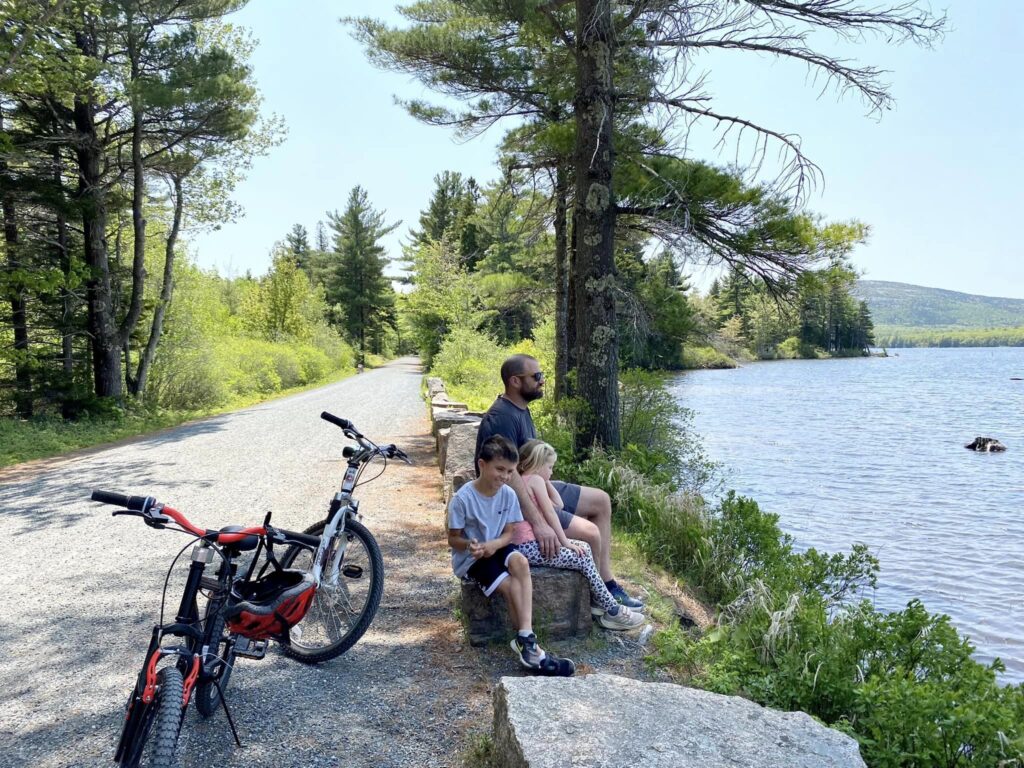
When we first decided to homeschool our children, one primary motivation stood out: the ability to travel anytime, anywhere.
The world is a vast classroom filled with endless opportunities for learning, and we didn’t want our kids to be confined to four walls.
This way of homeschool has provided us with the freedom to break away from traditional constraints and immerse ourselves in the richness of the world.
One of the most incredible aspects of travel homeschool is the unparalleled flexibility it offers.
Unlike traditional school schedules, we aren’t tied down to a strict academic calendar. Instead, we can adjust our learning adventures to coincide with off-peak travel times, avoid crowds , and even take advantage of unique local experiences.
This flexibility allows us to dive into history, culture, and nature at our own pace.
As “ roadschoolers ,” we cherish the beauty of the open road. Our camper becomes a mobile classroom, and every stretch of highway offers new learning opportunities.
Whether it’s studying geography by tracing our route on a map or delving into the science behind the diverse ecosystems we encounter, travel homeschool constantly exposes our children to the wonders of the world.
Travel homeschool isn’t just about reading textbooks or sitting at a desk. It’s about hands-on, experiential learning. Museums, historical sites, and local attractions become our interactive classrooms.
Our kids get to touch history, witness science in action, and experience culture firsthand. These memorable experiences make learning come alive in ways that traditional schooling simply cannot match.
One of the most profound benefits of homeschooling while traveling is how it nurtures lifelong curiosity.
As we explore new places, our children’s minds are constantly stimulated by the questions they ask and the answers they discover.
This intrinsic motivation to learn isn’t confined to a classroom or a specific grade level; it’s a journey that continues throughout their lives.

In the world of homeschooling, the “travel homeschool” approach has granted us the freedom to explore, the flexibility to learn at our own pace, and the joy of experiencing education in its most authentic form.
For us, being a homeschool family is synonymous with being a family of adventurers . We’ve embraced the open road as our classroom and have seen our children flourish in ways we could have never imagined.
So, if you’re contemplating the idea of travel homeschool, remember that the world is your classroom, and every journey is an opportunity to learn.
Embrace the wanderlust, follow your curiosity, and embark on a lifelong educational adventure that knows no bounds. Travel homeschool isn’t just a lifestyle; it’s a philosophy that celebrates the beauty of learning through exploration.
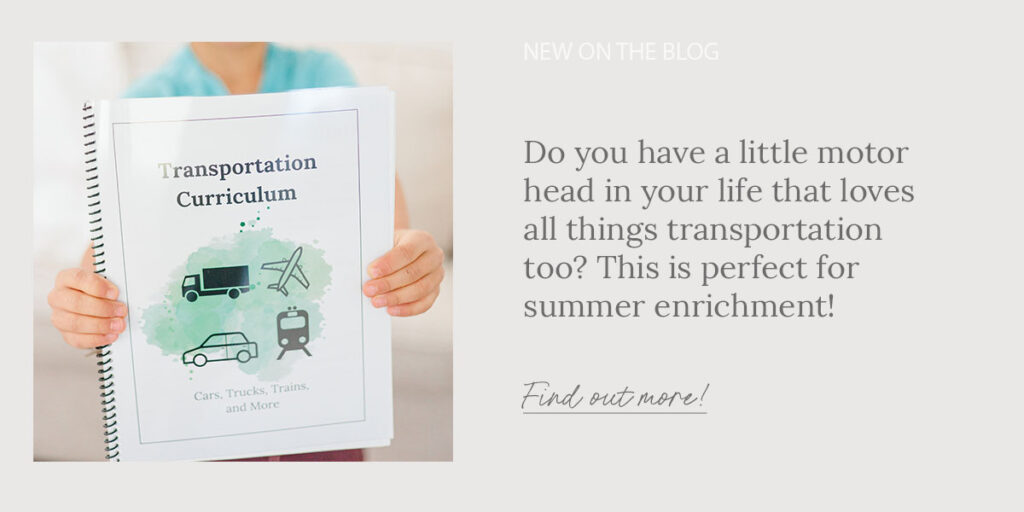
More Resources:
Worldschooling | What is it?
Amanda is a photographer and homeschooling mom who loves all things travel, hiking, camping, and all around adventuring. She adores taking her camper Callie on trips all over the USA. She is based out of New Hampshire but she travels south for the winter months. She created this blog to give you valuable insight into traveling, camping, hiking, and so much more.
Similar Posts

Montessori vs Homeschool | Pros and Cons
Montessori vs homeschool are two popular alternatives to traditional schooling. Both approaches offer unique benefits to children, but they differ significantly in terms of philosophy, structure, and delivery. Montessori education emphasizes independence, self-directed learning, and hands-on exploration. Homeschooling allows parents to tailor their children’s education to their individual needs and interests. Ultimately we chose to…
5 Best Homeschool Books To Shift Your Mindset
Should You Homeschool? Shifting my brain from a public school mindset to a homeschooling mindset took lots of intentional education on my part. I have put together the best homeschool books to help you shift your mindset too. I went to public school all of my life and then I become a public school educator….

Our Favorite Charlotte Mason Living Books
As a homeschool family with a passion for exploration, we cherish the journey of learning together. Just as we love to embark on real-life adventures around the globe, we’ve discovered a way to traverse the vast landscapes of imagination through the enchanting realm of Charlotte Mason living books. In this blog post, we’ll delve into…
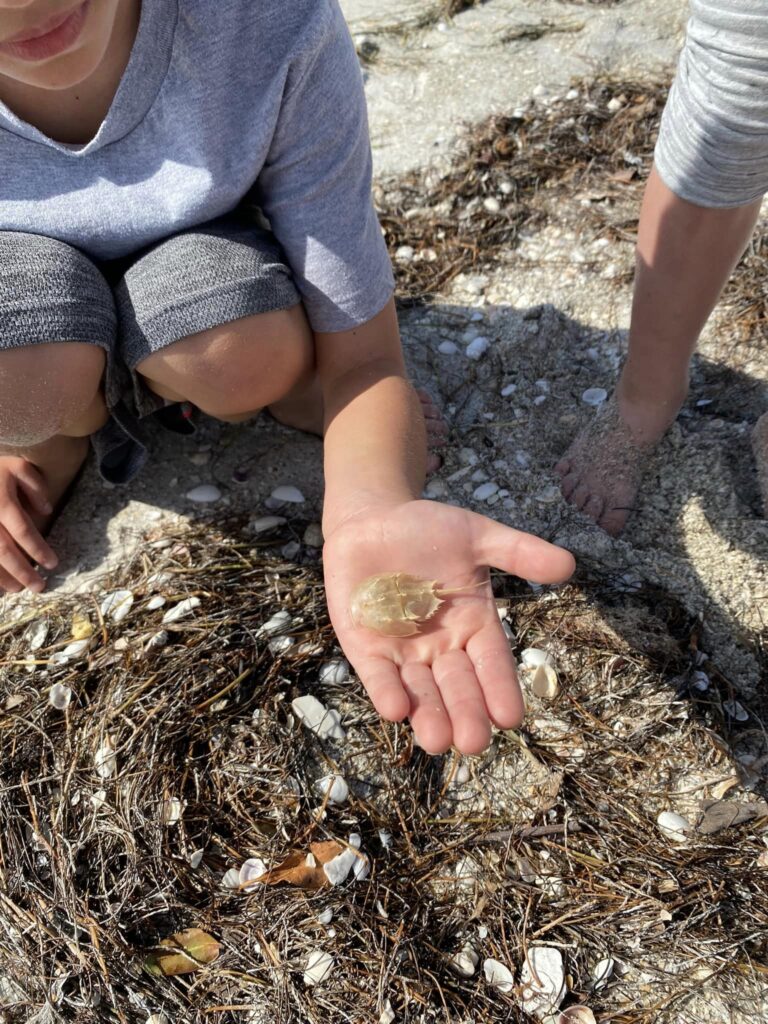
Worldschooling | What is it and how to start
When I was young, we learned about history and different cultures in the US and globally through textbooks. Nowadays, the internet is available for kids to learn about the world. While this has made learning a whole new experience, I feel like there is still a better way to educate children, worldschooling. Worldschooling is a…
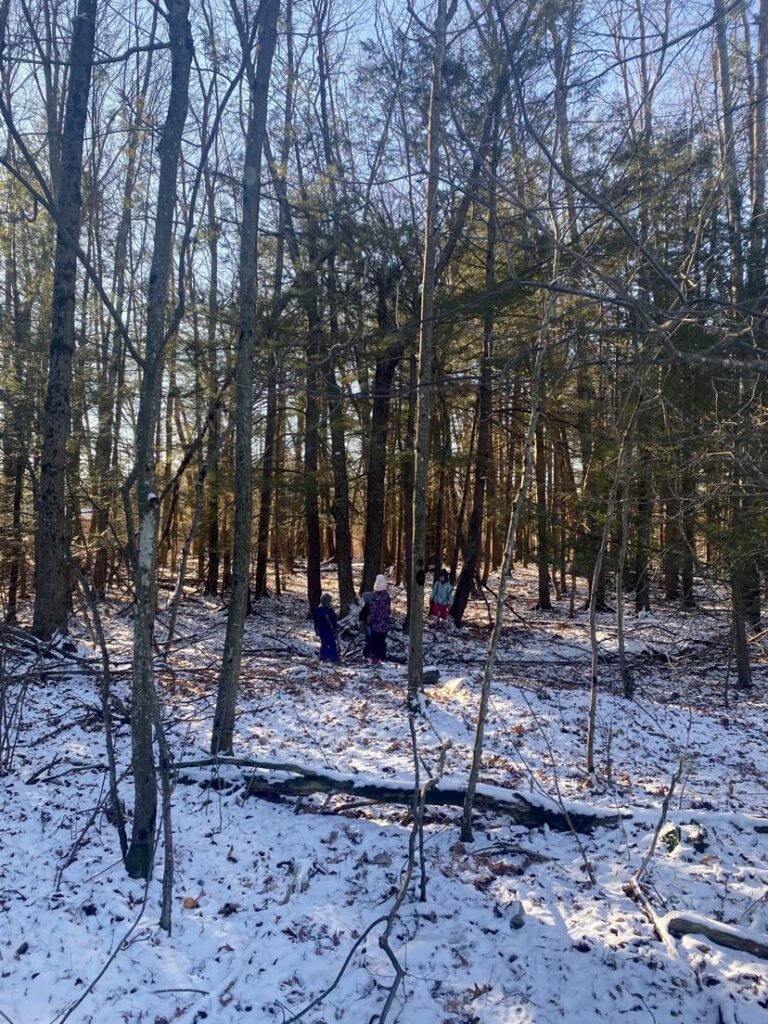
Honest Timbernook Review | Outdoor Play Program
As a parent, you want your children to have the best experiences possible, especially when it comes to their education and development. For this reason, I want to share with you my children’s experience with the outdoor play program and give you an honest Timbernook review. Timbernook is a nature-based program that offers outdoor play…

Homeschool A Day In The Life | Our Daily Rhythm
Before we began to homeschool I had no reference as to what a typical day could look like. I went to public school growing up and I was a public school educator. My son had been in a public school setting for two years and my daughter was in a preschool. It wasn’t until after…
- Top 10 Classic Road Trip Games for the Whole Family
How Gaming Can Promote Development and Education in Your Child’s Life
5 kids travel apps that’ll trick them into extra homework.
- Week 16: Southern Chilean Patagonia’s Fjords & Torres del Paine
- Week 15: Osorno, Lake Llanquihue & Puerto Varas in Chile
- Week 14: San Carlos de Bariloche and the Seven Lakes Route in Argentina
- Week 13: Pucon, San Martin de Los Andes & Magical Meetings
- Week 12: Conguillio National Park: Waterfalls, Lakes, Volcanoes & Hikes
- Google Plus

14 Traveling Homeschoolers Give Tips, Advice & How to Conquer Fears

THIS POST MAY CONTAIN COMPENSATED LINKS. FIND MORE INFO IN MY DISCLAIMER .
The decision to take children out of the formal education system with the intention of homeschooling can be pretty scary. Now add to that the decision to pack up your lives and head out into unchartered territories and it can be downright terrifying! You may be filled with self-doubt, worried that your kids level of education will suffer or that you will spend your days planning lessons and teaching. Well, worry no more! A couple of us traveling homeschoolers got together to give you excellent tips and advice on homeschooling while traveling .
Firstly, I think it is important to clarify some of the terms used in regards to various methods of schooling.
Homeschooling: At a basic level this entails teaching school subjects at home. The basic subjects such as science, math, history, geography and languages are covered, although the method of teaching can vary quite extensively from family to family. Some homeschoolers follow the exact school curriculum, do assignments, tests and final year exams, while others may use the subjects as a guideline and forgo any formal testing. There are numerous online classes and virtual classrooms that one can subscribe to.
Unschooling: This can be described as student-led learning, whereby children learn what they are interested in, without direction from adults. The adult’s role is to facilitate by taking note of what the children are interested in and then providing the correct environment and resources to enable the learning.
Worldschooling: This is the combination of education and travel, where the children learn history through experience, maths by converting currencies and languages through having to communicate with locals in foreign lands. Worldschooling families use whatever schooling method works for them from traditional homeschooling to radical unschooling. For those families doing slower travel may even enroll their kids at local schools while they travel.
Our Homeschooling Journey
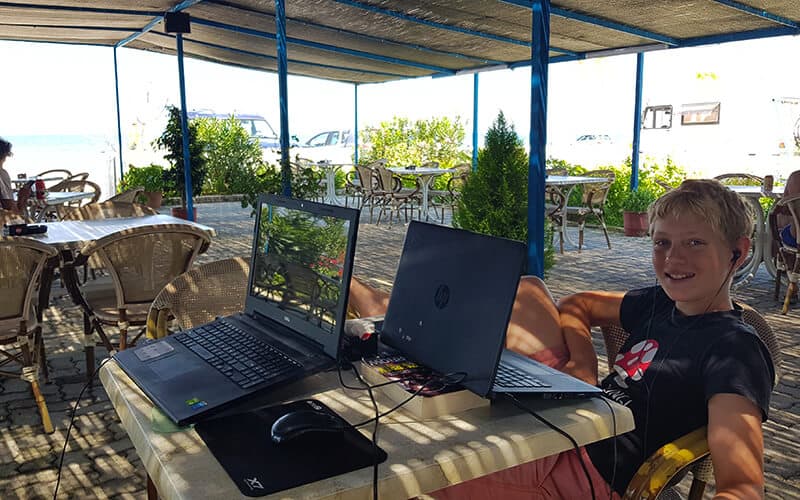
Q1: How long you’ve been traveling homeschoolers?
Tai and I started traveling in January 2017 so have been homeschooling for the past 2 years. We use Time4Learning and Khan Academy which are 100% online so no need to carry books or download worksheets.
Tai has ADHD and staying in the schooling system meant medicating him with Ritalin and having a facilitator by his side all day telling him to be quiet. For me, there was no choice. I had to remove him from the education system that was failing him and the alternative was to homeschool.
Q2: What was your biggest fear about homeschooling before you started and how did you conquer it?
- How much of my time would I need to dedicate to his studies every day? In Grade 4 we averaged one hour a day. Grade 5 required 2 hours a day. And my input was probably 30minutes per day! He just logged into the lessons and the videos and animations did all the teaching.
- Socialisation!! His peers at school were nasty to him, but on the road, he meets a myriad of people of all ages, with whom he interacts on a daily basis. That’s all the socialising he needs.
Q3: What is your top homeschooling tip while on the road?
Don’t make the kids do projects on each museum or place you visit. Rather let them enjoy the experience and then encourage fun discussions around what you saw and learned.
Q4: What advice would you give to prospective traveling homeschoolers?
Be flexible and adapt to where you are and what experiences are on offer. You can always catch up with lessons but you won’t always have the opportunity to hike over the Albanian Alps, ride a Hot Air Balloon in Laos, watch sunrises from temples in Myanmar or zipline across a canyon in Montenegro.
Don’t let fear stop you from experiencing this magical way of living. Your kids will learn so much more than it would ever be possible to teach them at school and they will be more grounded and well-rounded people because of it.
Click here if you’d like to sign your kids up on the Time4Learning platform
Homeschooling Tips from Nicky Williams of Go Live Young
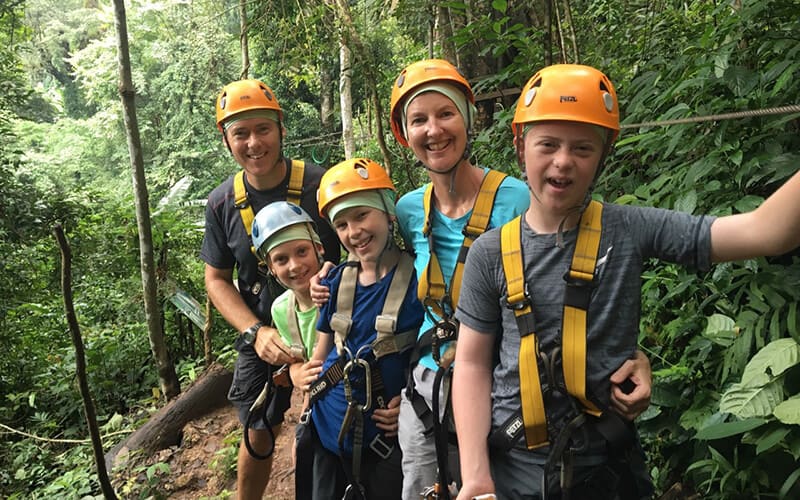
I’m Nicky, and myself and my hubby, along with our three boys, recently undertook a trip around the world. In 2016/17 we undertook a nine month round the world trip as a family of five. The boys were 8, 10 and 12 at the time of travel. Throughout this time we homeschooled our three boys.
As a teacher the homeschooling didn’t really worry me, it was more how we were going to fit it in while travelling the world. Our plan was to do a couple of hours each day to cover maths and literacy. The rest (history, geography, science and RS) would all be done through travel and the experiences we undertook. Once we started travelling we quickly realised that it worked best if we tried to schedule the learning first thing in the morning, before our day’s activities. We settled on two hours a day, five days a week. The boys quickly got used to the routine and structure and were much more ready to work first thing in the morning.
Follow a routine that the kids get used to. For us, this was two hours a day, first thing in the morning. This way the kids get used to it and it stops the moaning and groaning when the books come out!
Go for it. Travel brings so much learning in so many ways. Ours learned so much from travelling the world, learning from doing and seeing, rather than from books. They’ve learned how volcanoes and earthquakes happen, know more about Buddhism than most adults, learned about the war in Vietnam and the atrocities that occurred in Cambodia, and seen with their own eyes how people live all around the world. More importantly, perhaps, they’ve developed confidence, adaptability and communication, way beyond their years.
Read more about their travels at www.goliveyoung.com
Worldschooling Advice from Kendra Szudera of A(Broad) with Kids

I have 3 kids. We’re from Idaho, USA, and we’ve been traveling since July 2018. We have been housesitting since March 2018, starting with some housesits in our hometown. We’ve been homeschooling off and on since we began traveling, but it’s looked very different over the months depending on our location and what our learning priorities are.
I think I was pretty cavalier about homeschooling before I started, actually! I was fortunate that my older two kids were far ahead of their grade levels in regular elementary school, and both enjoy learning. I was most nervous about trying to teach my youngest, who would have gone into kindergarten this year, how to read!
Be flexible! Depending on your travel speed and how long you spend in each location, schooling opportunities can look very different. We are not tied to one method of schooling or curriculum, and decide what we want school to look like in each location based on how long we’ll be there, what local resources are available to us, and what our main learning goals are. For example, we spent 4 weeks attending a Spanish language school and considered that the extent of our schooling for that time period. We spent almost 3 months in Costa Rica and decided to send the kids to a local dual-language school to help them with their Spanish and to make friends. We’re currently in Puebla, Mexico, and hired a local Spanish tutor who comes 3 days/week. We also use a combo of online and other resources. We like Khan Academy for math for all 3 kids; the youngest one is using BOB books bought on Kindle for learning to read; we play card and board games, and they all take classes on Outschool.com. Most of their Outschool classes are their choice, with the exception of a middle school essay writing course, which I made compulsory for the oldest kiddo! There are some fascinating classes on Outschool, and the kids love browsing through and picking the ones that interest them. And, of course, we do lots of learning about each location.
If you feel at a loss for what to do for schooling, just start wherever is easiest and go from there! You could start with one of the resources I mentioned above (Khan, Outschool, local tutor, local school) or just start by learning about what’s around you. We’ve learned so much about each place we’ve been to by talking with locals and getting out and exploring. Also, go easy on yourself. Some days, homeschooling has been a total loss for us. Either the kids are too antsy, parents are too tired to be effective, or there’s something else we’d rather be doing. We go with the flow and try not to force it. There are just as many, or more, days where homeschooling goes so smoothly and easily that I feel like we’ve been doing it for years! (Uploaded photo is from a version of Scrabble with the 5 year old–spelling and math in one! 🙂
Read more about their travels at www.abroadwith4kids.com
Homeschooling Advice from Leanne Heggie of Cake and Eat it 3

Mum and Dad and Miss B (11) fulltime travelling Australia in our Motorhome and each year time roadtripping UK & Europe in our campervan. We have been homeschooling for two years with Miss B, since hitting the road fulltime. Our eldest (now adult) daughter has travelled multiple countries and Australia too. I did all my high school by correspondence and knew all the possibilities it provides.
Will it be enough? I think that as soon as your baby is born you ask yourself this question more than once a day. Am I doing enough, are they eating enough, are they growing enough…you get the idea!! So when you think of taking them from the schooling environment, of course, you are going to ask yourself this question. I learnt from an early age – if you want to learn, that is exactly what you will do irrespective of your environment and resources. I try to pass on to Miss B, not the expectation to learn but the importance and love of learning new things.
This will depend on what mode of travel and how much space/weight restrictions you have but I think the best tool we had was a whiteboard for anything from drawing, spelling tests, maths formulas/calculations. Encourage conversation of what their favourite thing that day was, every night – you will be surprised what is important to them and a great opportunity to google more info on their favourite things – always learning!.
Understand what your expectations are if it is a short say year-long trip, do not be too hard on yourself there are learning opportunities EVERYWHERE. Always ask at a monument or museum when buying tickets if they have any educational material or worksheets that you can use during your visit. If you are going for a longer period, download the curriculum for your country/state/region and save it as a pdf to refer back to to ensure you are covering relevant curriculum. Buy a year level relevant workbook or download worksheets to enhance learning. Check out our Educational Websites and Resources page which has hundreds of resources for schooling on the road and growing all the time!
Read more about their travels at www.cakeandeatit3.com
Conquering Unschooling Fears from Nadja of Eastern Heart Western Mind
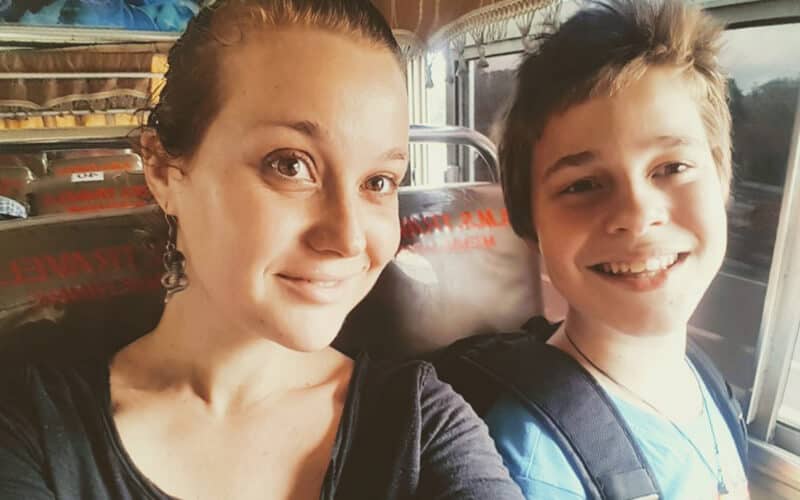
My 12yo son has been unschooling for over 6 years, with brief stints of homeschooling here and there. Two years ago, we left South Africa – I became a digital nomad and my son (and I!) started worldschooling. We have a blended approach to learning, some parts worldschooling, some parts unschooling, and some parts what we call skillschooling.
At that stage, the alternative was medicating my son for ADHD as per his preschool’s request, so the fear of what his life and future would look like if we *didn’t* dive into alternative education was far greater!
Of course, I’d lie if I say our learning journey since then have been devoid of fears: I’m a mother concerned about my child’s well-being and doing what’s best for him, but I’m simultaneously not immune to society’s predominant beliefs, which does *not* – usually – support making choices that deviate from the norm.
Thus, whenever I have dark nights of the soul about my son’s education, I do a mental checklist to put things back into perspective:
- What led to our decision?
- What would the alternative look like?
- How does this lifestyle and the choices we make daily match the key values I want to instill in my child?
- What is making me fearful, and is it a rational fear? If no, how can I work on my internal environment to quell this fear? If yes, what changes need to be made?
As a writer, I stay sane by writing about and reflecting on our lives. So when the going gets tough, I also make a point of revisiting past wins.
When all else fails, I turn to friends who have watched us unfold and blossom to remind me I’m doing the right thing!
Inflexibility and perfectionism: At the root of all unhappiness! When travel becomes a lifestyle and no longer just a holiday, the same logic applies as it did in our lives back home. There are good days and bad, great days and days you think will never end. Learning is no different.
Some days you’re on top of it and it makes you feel like you’re well on your way to conquering the world, some days you’ll feel like you’re failing miserably, and you question why you ever made such “stupid” choices as to dare self-educate your child/ren, and on the road, at that!
This, too, shall pass!
The reason we made this decision in the first place was to prepare our younglings for “real life” in the best way possible. Nothing gets more real than travel as a lifestyle!
Fear will always be there. Courage is not the absence of fear: It’s feeling them, and doing it anyway! Making decisions that you know deep down is right for you and your family despite what the world thinks is perhaps the bravest thing you could ever do. Take it from someone who’s done it, and thrives: It’s also one of the best things you’ll ever do!
Read more about their travels at www.easternheartwesternmind.com
Homeschooling Tips from Emma Burrows of Our Big Worldwide Walkabout

We are the Burrows family; Emma (blogger and educator-in-chief), Doug (cooker, cleaner and chauffeur) and Issy (an eight year old mischief maker). Doug and I have always travelled and when Isabelle came along we applied for her first passport at 4 days old. She took her first 4 hour car journey at 8 days old and we travelled from the UK to NZ with her at 15 months old. We started full-time travelling and homeschooling in April 2018 and haven’t looked back.
Ironically I genuinely didn’t worry about it before we started, I’ve worried about it ever since. At the beginning, I made loads of mistakes and I still do. After endless tears (hers and mine) I let go and for a month did nothing. At the end of it, I realised Isabelle learned more and was far more receptive if I just chilled out. Ironically I was following the system I wanted to escape.
If they miss a lesson or 50 it’s not the end of the world. Relax and let them enjoy the journey and you will all reap the benefits.
De-schooling is so important for you and your children. Before you can homeschool you need to unlearn everything that you’ve learnt whilst in school.
Read more about their travels at www.facebook.com/OurBigWorldwideWalkabout
Advice from Traveling Homeschooler Brandon Pearce of Pearce on Earth
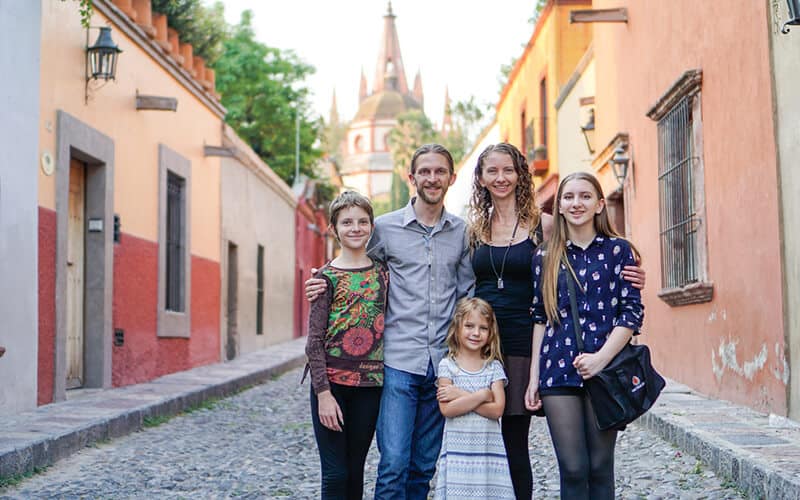
Our family sold our house in 2009 to begin traveling the world and learning together. Our three daughters are now ages 15, 13, and 7, and the youngest was born in Costa Rica. So far, we’ve lived in and visited over 40 countries.
Our biggest fear about homeschooling was that our children wouldn’t learn what they needed to thrive in the world as adults. As we gave them more freedom to direct their own education and support to follow their ambitions, our confidence has grown in seeing them develop themselves, their skills, and mindset in beautiful ways. Our oldest daughter now has her own video editing business, our oldest two have helped create a mini-school in Bali with other children, and each of our children is thriving in their own passions.
Our top homeschooling tip on the road is tailoring your travels to your children’s interests. For example, spend time in places where your children have the opportunity to participate in classes, learn from teachers, attend conferences or study environments that interest your kids the most and that will encourage them to grow.
It can be very difficult to travel and homeschool long-term without a supportive community. Get involved in the local communities where you spend time. Reach out to online homeschooling groups. And attend conferences like the Family Adventure Summit, where you can meet hundreds of other people who are doing this, who understand what you’re going through – and receive the opportunity to make new friends and encourage and support each other in the journey.
Read more about their travels at www.pearceonearth.com
Homeschooling Tips from Shannan Swindler of Captivating Compass

We love to travel and learn along the way. Our home base is now Scotland. We travel whenever possible usually to the places with the cheapest airfare.
I didn’t have any fears before I started. But once I was 100% responsible, they kicked in. I found a community of like minded homeschoolers for support. When we relocated to Scotland I lost that weekly community, so decided to start my own with a friend.
Plan to learn on location, by looking for engaging activities & use digital curriculum for subjects like math that you need to keep up on while away.
Remember that every day is a day for learning. So much cultural and like skill learning is happening that it’s OK to not always have a BIG learning experience every single day. Slow travel brings natural learning at an easy pace.
Read more about their travels at www.CaptivatingCompass.com
Homeschooling Advice from Astrid Vinje of The Wandering Daughter
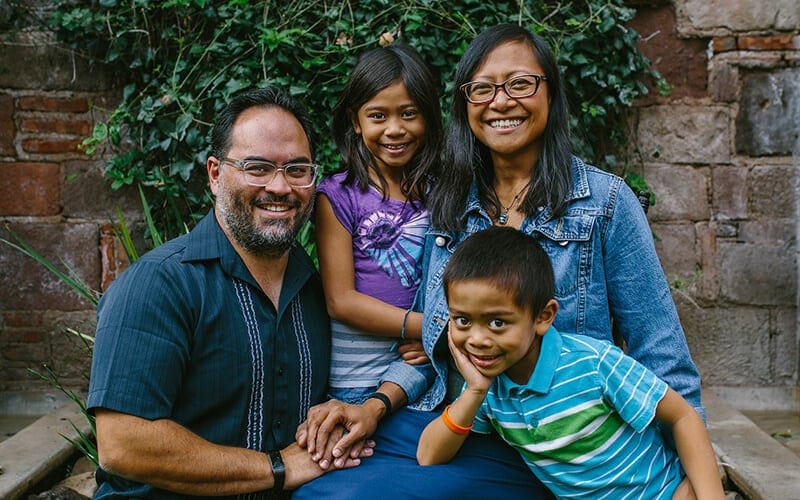
We are a traveling family of four, currently on a three year trip around the world trip. Right now we’re in Mexico, but we plan to travel throughout Europe, Asia, Africa, and South America during our trip. We’ve been homeschooling since July of this year.
My biggest fear before homeschooling was being able to have the patience to teach my kids. Now that we’ve been homeschooling for almost six months, I acknowledge that having patience is definitely still not my strong suit. But I’ve been surprised at how many learning opportunities we’ve had during our travels that don’t require me to sit down and do formal lessons with the kids. We go to museums, we watch videos about the cultures we experience, and we read about the different places we’ve been visiting. These have all been learning opportunities for the kids but in a more experiential rather than formal way.
Let your travel experiences guide the lessons you provide your kids. Dive deeper into your travels by incorporating your travel experiences into your kids’ learning.
Don’t stress about following a specific curriculum. Each child is different and learns in their own way. It’s okay to take a more relaxed approach to teaching and learning because your kids will learn so much just from their travel experiences. If you must focus on something, then focus on the fundamentals: reading, writing, and math. Every other subject is just an offshoot of those fundamental subjects.
Read more about their travels at www.thewanderingdaughter.com
Adapting to Homeschooling from Melissa Conn of The Family Voyage
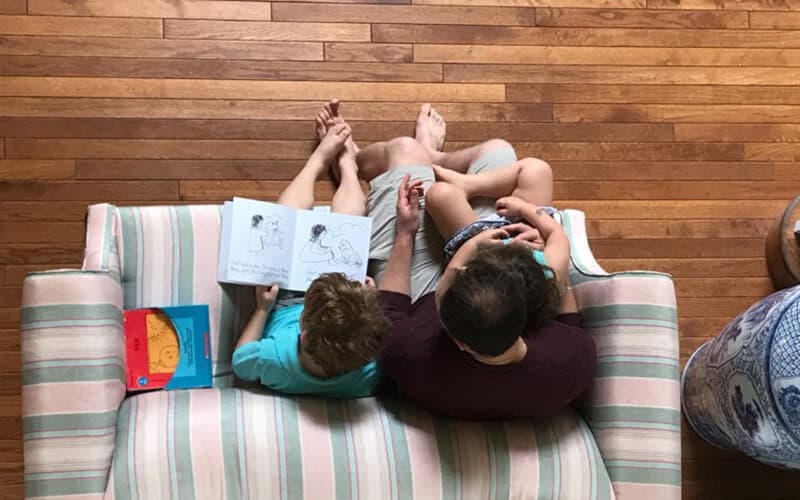
We have been homeschooling and traveling for 15 months
Our biggest fear was that our son wouldn’t keep up with his public school peers. Turns out that he kept up and will move ahead a grade!
For the early grades, just focus on reading and math in daily seat work – science and social studies can be learned in context during your travels.
Try to test out a few different materials before you go. We discovered that our son doesn’t do as well with online programs as with workbooks, so after banging our heads for a few months we changed our plans entirely! Workbooks are much heavier to lug around, but school has been much smoother for all of us.
Read more about their travels at www.thefamilyvoyage.com/family-gap-year/
Homeschooling Tips from Lori of Fitz 5 On The Go
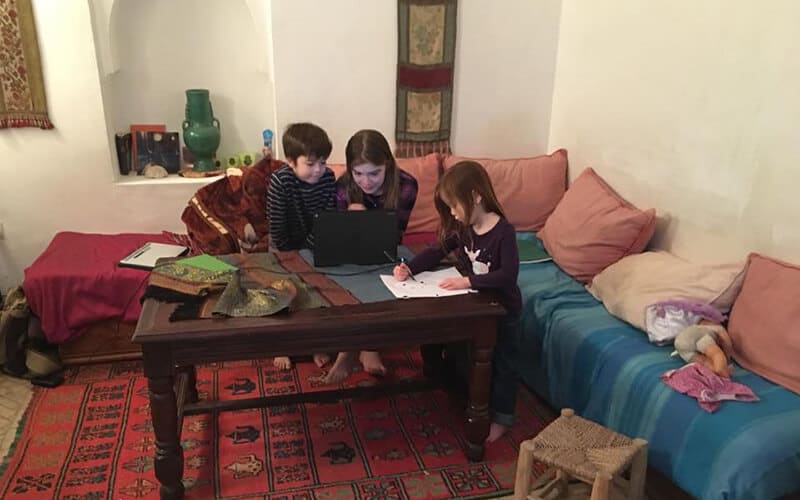
We took a gap year with our kid ages 3,6,10 and traveled to Canada, US, Costa Rica, Copenhagen, Morocco, Portugal, Spain, and Ireland. We just homeschooled the year we travelled.
I like having a lot of references and enjoy getting most of our books from the library. The books I liked the most were way too heavy to take with us. My oldest did a lot of reading on the Kindle and we carried workbooks. I would also say that it was really difficult to find other kids to interact with. Look for worldschool meet-ups and hang out at playgrounds.
Use what is around you to learn. We studied marine biology while at the beach, Geology at Crater Lake and in the mountains, and world history through many of the museums we visited.
Plan to stop in areas that already have steady groups of traveling families. Facebook groups can be a great way to find places. Otherwise, try and sign up for classes and activities with other kids.
Read more about their travels at www.fitz5onthego.com
Homeschooling Advice from Kirsty Bartholomew of Lost in Landmarks
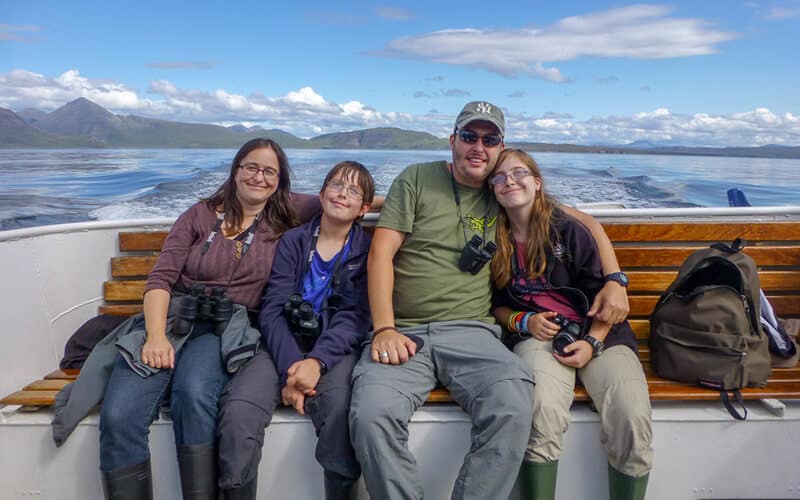
I live in the UK with my now 18 and 17 year olds. We’ve always homeschooled the kids, that is until this year! They’ve both gone on to college this year, Marcus has gone to learn body shop and working with cars and Alex is studying to get A-levels to get into University. We always wanted to travel and having the kids to be homeschooled was perfect for that. It took us until they were 11 and 12 before we managed to break free and give traveling a go. We bought an old campervan, loaded all our things in it and spent the next 6 months traveling around Europe and the UK. We came back for the winter and headed out again the following year, this time we traveled slower, renting apartments and housesitting.
It’s always been a worry about what others think. The only way to conquer that for me was to make sure I’d researched about it and when we decided to go for it, to do it with all our hearts.
There’s opportunities to learn in everything from the historic sites to watching the locals around a supermarket – leave the workbooks if you can and enjoy and open up to what it around you. I loved the opportunity to learn myself while out travelling and that in turn inspired our kids to learn as well.
Get the kids to keep a diary of what they did. It keeps some writing practice going while also providing a really nice snapshot of the trip from their perspective.
Read more about their travels at www.lostinlandmarks.com
Worldschooling Tips from Thais Saito of World Trip Diaries
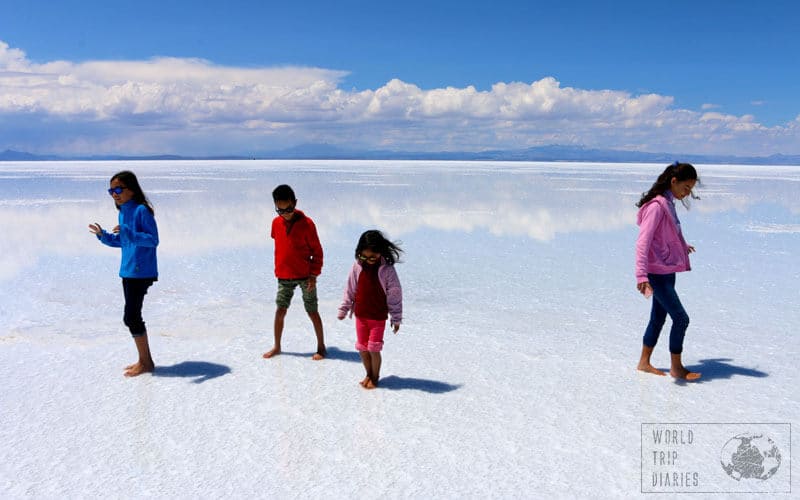
I have 4 kids. We’ve been homeschooling for 6 years, and we came back from a 30 months trip a few months ago.
There are many myths, like socialisation (this one’s big) and my lack of qualification, but with lots of research, we found out we’re enough!
Computers. They’re way better than tablets and there’s everything you need online. We used it for everything! And an e-book reader also makes magic!
Being on the road is a new level of homeschooling. Go, let the kids experience, see, smell and feel all there is around them! It opens up their minds and ours!
Read more about their travels at World Trip Diaries
Homeschooling Tips from Alex Palambo of Laska Baby Travel
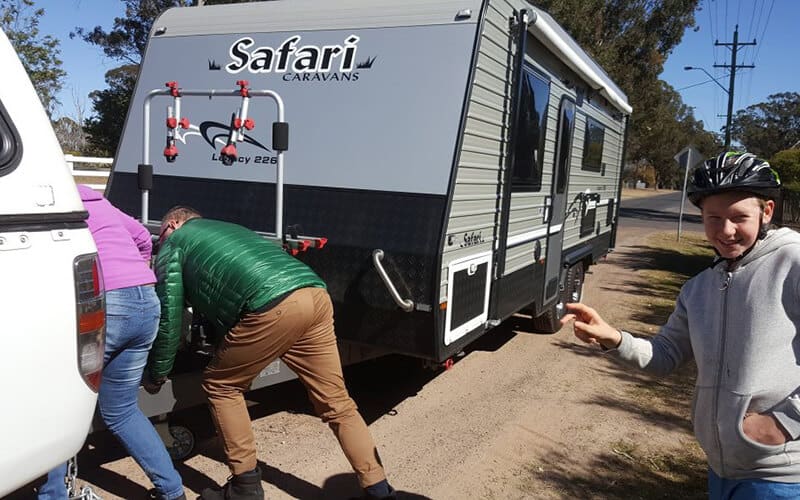
I’ve been homeschooling for over 4 years until May of last year when we decided to sell our possessions and leave in a van indefinitely.
Not being qualified to educate because I had no teaching experience or wasn’t even thinking of becoming a teacher (until then LOL). Luckily, I’ve met a lady that was a parent liaison officer at a DE school department, so her simple guidance made a difference, otherwise it’d be very daunting to start HS registration process without help or knowledge
Spend time researching and get insight knowledge from experienced HS families and then choose what learning style suits your children better – you’re the only one who knows them well!
Kids need practical experiences, they need life skills. Make those a priority, they can always catch up on the book work but not on the educational travelling time.
Read more about their travels at www.laskababytravel.com
Are you homeschooling, unschooling or worldschooling your kids? I’d love to hear your experiences!
Like It? Pin It?

Jeanne and her son Tai have been full time travellers since 2017. They are lovers of all things travel with an insatiable desire to explore every last corner of the globe. Homeschooling and working as they move from one incredible location to the next. Their goal is to use their travel guides and stories to inspire others to explore the world.
Related Posts
Thanks for putting this awesome collaboration post together. We’ve been worldschooling our now 5-year old for nearly two years which included taking the opportunity to meet the wonderful Heggie family in Bali and employing the Pearce’s eldest daughter to do some video editing! We’re currently back in NZ awaiting the birth of our second child (any day now!) and looking forward to returning to the road as soon as we get the newborn a passport!
Oh, how amazing that you’ve been in contact with 2 of the Worldschooling families on this list. Its things like this that make you realise what a small world we live in! Good luck with your new addition and when you’re back on the road maybe we can also meet up? That would be wonderful 🙂
Jeanne, Thank you so much for this post. It re-affirms once again that worldschooling is one of the best ways to raise our kiddos, who are going to know this world, love it, and make it a better place. From worldschooling part-time, we are now fully preparing for a family gap year, all inspired by families like yours and the ones in the post above. The change to homeschooling is my biggest stumbling block so far, but your post is helping so much to plan for it, and get excited about it. My oldest daughter has multiple special needs, including blindness and autism. There are school services in places, but it is liberating to finally decide by myself what is best for my child, and my family. Thanks so much for you story! Looking forward to following your adventures.
Hi Anastasia, Thank you for your wonderful comment. I am so excited for you as you embark on what will be a life changing experience. I was so nervous when we started but I just knew in my heart that mainstream schooling was not for my son and that I had to do something different for him. This journey has been unbelievably rewarding and Tai has grown in ways I could never have imagined. Good luck with your adventures and let me know how you are getting along on the road.
I love this article….I’m definitely a Worldschooler…. I like how nice and simple you explain everything!
Thanks for your message and go go Worldschoolers!
Thank you so much for this detailed article. I wish I’d had the courage to ravel and homeschool my son (now 15). I notice that most of the bloggers you’ve interviewed have kids who are younger than my son – I’d really love to know how homeschooling works once you’re into the rhythm of key school exams (GSCE/A level etc). You’ve definitely sparked (OK resparked) an interest for me, but it would be a huge step at this stge in my son’s education, so I need LOADS of info! Great post!
Hi Coralie. Thanks so much for reaching out. My son will be 13 next year so we are definitely getting to that higher level of education. I don’t see travel being an issue though. Tai’s online curriculum does not require exams for a few more years, but when we get to that stage I think we would just need to slow down the travels around exam time to give him the opportunity to study. My advice would be to find an online schooling system that works with your traveling lifestyle. We use Time4Learning as everything is 100% online, so no need to lug books around. The travel alone will be an incredible education for your son and he will gain more from one year on the road than anything he can learn in a book. Don’t be scared, just do it!
Write A Comment Cancel Reply
Save my name, email, and website in this browser for the next time I comment.
This site uses Akismet to reduce spam. Learn how your comment data is processed .
Type above and press Enter to search. Press Esc to cancel.
Resources for Traveling Homeschoolers
Last updated on June 24, 2023 by Shannon

During the 2011-2012 U.S. school year I homeschooled my then 11-year-old niece from the road. We based ourselves in Thailand and we explored Southeast Asia for nearly seven months before returning to our home-base in Florida. From this experience, I shared our story of what and how we homeschooled for a year-and-a-half, and by popular demand from readers I created this resource page as a starting point for deciding how you can begin planning your own homeschooling and travel adventure.
And while a year on the road with a kid does not make me an expert, there is a shortage of people discussing the travel-homeschooling combination and in response to dozens of emails I formed this page with the advice I learned over the past few years being a part of the non-traditional education movement. There are many education philosophies, and I’ll touch on the various options, provide outside resources, links, etc that helped me decide how to navigate that year+ of travel and school, and I’d love for this page to become a good resource hub for information that homeschoolers and world-schoolers can use to prepare for travels. If you have a question not addressed here, or some resources I overlooked, leave them in the comments!
Table of Contents
Your Main Options for Educating Kids on the Road
Great amounts of grey-areas exist between these two types of homeschooling and there is no exact science to either one.
Homeschooling
Generally involves subject-based learning in at least most of the core knowledge areas: science, math, history, geography, languages. The type and quantity of curriculum varies depending on the family. Homeschoolers based in one place may join co-operatives and take special interest subjects throughout the year in addition to their schoolwork. Some homeschool parents closely mirror the public school with grades, tests, and yearly benchmarks, others may eschew testing and grades but still school within a curriculum framework. Online classes (like what we did) are very much an online homeschool program with curriculum, assignments, and tests, but all is done through the internet and virtual classrooms.
Unschooling
Child-led learning; the children direct their education by expressing interest to their parents. Often the children are given access to deep subject-based knowledge when they’re interested in a subject, and new skills or knowledge areas are introduced at a pace dictated by the child’s interests. Often unschoolers are not involved in standardized testing, or any tests in general.
World-schooling
There seems to be a good deal of variety here and I believe many long-term traveling families who proscribe to a mostly unschool philosophy use this term to refer to the act of allowing real-world situations encountered on the road to guide children and act as a teacher. These children study history and culture at the sites of famous ruins, use math in currency conversions, and springboard their learning from the myriad of experiences that stem from frequent travel.

International schools
If you’re moving overseas to one place for many months you could even go the route of enrolling in an international school—English is often the default language for these schools and most use an accredited curriculum that transfers credits to westernized school systems.
And these are rough guidelines because a world-schooling parent may also throw in a math book to cover those basics on the road. You could formally cover literature and science but rely on history lessons on the road. Be open-minded when you’re researching different methods to find what works best for your child and your travel situation.
What did we do?
For my niece, I covered four core subjects à la more traditional homeschooling, but during our nearly seven months overseas we also took many history lessons from the temples, culture, and ruins of Southeast Asia ( outlined here ). Our schooling decisions were chosen with many factors unique to the fact that she was my niece, not my child, and thus we combined the wishes of my mother (who is her guardian), also with a mind toward an easy transition back into public school. One day, given my own children, my philosophy would closely align to how I taught Ana, but likely include more flexibility—I greatly jibe with this woman’s road-schooling approach .
Why Consider Long-term Travel and Education
This is a topic I care about and read up on often as new research and theories come out. Below you’ll find long-reads on the state of education, videos, documentaries, and anything else I’ve found interesting in this realm. It’s important to note that I am a prime example of how well the public school system can work; though we were poor I managed to attend a magnet high school, graduate with honors, and win a full merit-based scholarship to the University of Central Florida. This all though, now, as an adult fascinates me because I am intrigued by the possibilities of alternative education and I like to read about it. The hardest part of choosing how to school on the road is determining your own education philosophy. You know mine now, so here are some other things to consider:
- Waiting for Superman : A documentary on the current state of the US public school system with a strong look at how it’s under-serving minorities and our nation’s poor. It’s a great, engaging documentary worth watching. That link goes to Amazon, or it’s on Netflix too.
- How a Radical New Teaching Method Could Unleash a Generation of Geniuses : Great long-read on Wired about how some teachers are finding success in changing up their teaching methods.
- What we should have been taught in our senior year of high school : This is a comic from the Oatmeal, and it’s a fun poke at the practical application of what we have to learn in public school.
I love this talk by Sir Ken Robinson enough to embed it here to watch. He discusses shifting educational paradigms away from an age-based prescription of what children should learn. It goes on to discuss how formal schooling
I’ll update this with more soon, leave your favorite education reads in the comments!
Great Books About Transitioning & Curriculum Planning
- The Unschooling Handbook: How to Use the Whole World As Your Child’s Classroom by Mary Griffith
- So You’re Thinking About Homeschooling by Lisa Whelchel
- Homeschool Your Child for Free: More Than 1,400 Smart, Effective, and Practical Resources by Gold and Zielinski
- Books to Build On: A Grade-by-Grade Resource Guide for Parents and Teachers by E.D. Hirsch
On Documenting Education
For US residents, every single state has different education requirements; some states are very homeschool friendly, while others are quite strict and require stringent documentation. Research your state’s laws if you plan to pull them out of public school.
Florida is relatively lenient in homeschooling requirements, and by using our state’s online learning program (for us that is FLVS, others can find options here ) we were covered very well in proving equivalent education between what she learned through homeschooling and what she would have learned in traditional school.
Our second year though, we deviated from FLVS and state-law required that we keep a scrap-book (digital or otherwise) to record her learning benchmarks throughout the year. Our book had to illustrate that Ana made progress and advanced her knowledge in whatever topic areas we studied. We did this through writing samples, a list of the books she read, and photos of “field trips” with a mini description of what she learned. It wasn’t extensive, but our book had to have three samples for core knowledge areas: one sample for the beginning of the year, one in the middle, and one at the end.
This mostly matters if you plan to re-enroll after you return from traveling, you need to research state requirements so your child can easily advance to the proper year if this is important to you and them. And if you go the unschooling route, you still need to process paperwork to pull them from the system and file an intent to privately educate your child. This varies from state to state but was simple and took one day to complete in Florida.
Join local homeschool groups, you can find them with a quick online search, and use other parents to figure out your state requirements. You can also call your local school board, which is a route I took for the paperwork, then I used the homeschool groups for recommendations on who could review our book and sign off on Ana passing the school year.
High School
A big concern for many leaving while their child is in high school is a fear they will not get a diploma or enough credit to qualify for University admission. There are heaps of distance learning programs and options to learn on the road and still jump through formal testing requirements.
- Homeschooling Through High School
- Roadschooling Highschool
Further Research/Communities
This resource list should be used for sussing out where you stand and what approach you want to take. This is often the more stressful part of the process, choosing where you stand on the subject and which approach you want to take. This list generally goes from more structured to less structured educating styles, with links at the end to the major unschool online communities.
- This is a list of homeschooling families (as of 2015) . They would make good research and email contacts to see what they are up to.
- Road-schooling 101 : This road-schooling mom has a wonderful, detailed post on how she educated her children during very long-term, perpetual travel and has resources for every age level. She has a strong formal education bent, while diving deep into her philosophy on world-schooling as well. Lots of resources and her personal site is also great.
- What is unschooling? Earl Stevens shares a very well-thought perspective on precisely what it means to homeschool.
- The Pioneer Woman
- Penelope Trunk
- Facebook pages: here , here , here , here
- An Aussie homeschooling family outlines the how-tos for homeschooling Australians .
Of note too is that we aimed for secular curriculum when we could. Many of the great print course-books are conservative, so it’s difficult to find secular texts. The online courses are less religious, which then allows you to add in your religion where you see fit. There are secular homeschooling communities and forums that can help.
Building Travel Themed Lessons
A unique part of any trip, long-term or otherwise, is the ability to pull in amazing lessons and interesting local activities to aid learning and understanding. There are a myriad of ways that you can engage children of any age in the process of travel and help them look for the fascinating nuances in each place. I outlined a few of our ideas here. In general, you want to use pre-trip research to give them enough knowledge that your children can then build on that knowledge with further investigations. I love this piece on homeschooling in Morocco , they outline a clear itinerary that homeschool parents could use in the country to delve deeply. And their integrative ideas at the end of the post could easily be applied to any city or local level travel.
This post I wrote also delves into some of the things we did to investigate our time in Southeast Asia, with activity ideas and quests that my niece undertook during our months on the road. We looked at the local culture and tried to find activities that would engage us with the people, place, and culture. That meant respectful scavenger hunts at the Buddhist temples — we tried to find and document Buddha in all the different hand and sitting positions. Then we would return home to see what they meant. Things like this allowed my niece to interact with the local culture on a different level.
Tackling a Foreign Language as a Homeschooler
Learning a second language as you travel or live abroad is one of my favorite aspects of homeschooling. In most U.S. schools, the earliest a student can start learning a foreign language is about 7th grade, or 12-years-old — and in some cases they have to wait until high school. U.S. students are woefully behind the curve in learning second languages. Much of the rest of the world speaks several languages by adolescence. In Europe, this is largely thanks to close borders and a culture of traveling. In developing countries, children often learn a local tribal language, a national language, and English. That’s three or more by adulthood. When taking over my niece’s education we opted to immediately start Spanish. It helps that I speak Spanish, so I could assist with lessons and immersion on bus rides. We also took Thai lessons when we lived in Thailand, and she gained exposure to a tonal language and learned how basic communication with locals. It must be said that the lessons and subsequent attempts at bargaining in Thai were among her favorite parts of living there. So, foreign language can be a big part of traveling as a homeschooler.
Picking a foreign language
- If you speak a second language it may the most sense to start there.
- Are you moving abroad? Of course you’ll want to start there, that way they can more easily learn about your new culture and gain fluency faster.
- Spanish or Mandarin are the two most widely spoken languages besides English.
- Does your child have a preference? They may just be fascinated by French or Italian, why capitalize on that interest first.
- What is a common second language in your hometown. The U.S. is a land of immigrants, so picking a language they can use back home is useful.
My niece and I went with a combination of several of these. Spanish is widely spoken in Florida, our home state, she’s always wanted to learn it, and I speak with moderate fluency.
How to teach your homeschooler a foreign language
- There are heaps of free or low-cost resources online. Some are gamified, others are more classroom-structured. It only depends on what will work best with your travel and teaching schedule.
- Consider software like Rosetta Stone , free language resources , online classes , hire a private tutor via Skype, use free sites like DuoLingo , take classes on the road. There’s help out there at every price and intensity level.
- I like this piece on teaching your student passive skills in a language. Even if you can’t fit in a full curriculum as you travel, this is a great way to lay the groundwork for a new language.
- I subscribed to Audible while we were on the road so that she could listen to region-specific audiobooks (or fun ones too) while we were on long bus rides!
- This list of the best educational podcasts might spark some new ideas and opportunities.
Curriculum by Subject
Alrighty, let’s assume you are going the curriculum route and not unschooling. First, does your state offer free online curriculum ( research on K12 )? If you have free online resources, you can sample what works for you and potentially lessen the other curriculum you need to buy, or get help in a subject you’re not confident in teaching. Our second year schooling I mixed free online classes from our state with some textbook learning for math and science. Internet is very prevalent, so if you plan to travel slowly you can likely handle the accountability of online classes.
Below you’ll find links to recommended curriculum and/or online resources and games within that subject. The options are endless here, but many of these listed are online or have digital books to lighten your load on the road. This is a sampling of the ones that have crossed my path and most of these have some fees attached.
Each resource has a letter beside it to indicate the general education level. E=elementary, M=middle, H=High, C=College, A=All levels.
General or Multi-Disciplinary Resources
- Free resources to learn and read nearly anything
- MobyMax (E, M): This is a complete personalized learning system and comes highly recommended. It’s free and their standards tend to be higher than U.S. standards. If you’re student is testing on-level, they are actually ahead. A great way to check keep track of how your student is doing against peers/school standards.
- Khan Academy (A): Anytime there is a math subject I don’t quite understand, my niece and I headed here for a better explanation. Fantastic tool to help troubleshoot learning areas.
- The Great Courses (H, C)
- Always Ice Cream and Clever Dragons (E, M): Games-based learning that has a heap of gamified learning. Very well done and my niece and nephews both enjoyed it immensely.
- BrainPop (A): This is used by many schools for games and learning reinforcement. It’s not cheap, but it does have a lot to offer.
- Fun Brain : Free games in various disciplines for grades K-8.
- IXL (A): Great practice games for all levels and most subjects.
- Free or lost-cost coding resources for kids .
- Teaching Textbooks (M, H)
- Right Start Math (E, M)
- Kinetic Books online (A)
- A Plus Math (E)
- Comparison of science curriculums (A)
- Kinetic Books online (A)
- Radiolab podcast (A): My niece and I both enjoyed listening to these on the road.
- How Stuff Works podcast (A)
- Nasa for Students (A)
English/Literature/Spelling
- WordBuild (E, M): Highly recommended; your student may not love it, but it works. And it’s only 15 minutes a day. It helps with reading comprehension and they will have a strong knowledge base of words and their roots that will serve them well throughout higher grade levels.
- Excellence in Writing (A)
- Explode the Code phonics (E)
- Brave Writer (A)
- Books by country (A)
- Spelling City (E, M)
- Grammaropolis (E, M): Fantastic way to teach and reinforce grammar. My niece and nephews learned a lot and enjoyed this site and the games and learning tools.
History/Geography
- Social Studies options (A)
- History course options (A)
- Kids Gov (A)
Foreign Languages
- Rosetta Stone
- Free language resources
- Hire a tutor via Skype
- Take classes on the road
Did I miss a resource, blog, or community you love? Leave comments here, link to any of your own relevant posts, and let’s create a thorough launching points for traveling parents! :)
24 thoughts on “Resources for Traveling Homeschoolers”
Great read!!! Thanks for sharing such a great blog, blog like these will surely help each and every homeschoolers in homeschooling the children in best way.
Hello! I have a very unique situation. I divorced the father of my 3 children a little over 4 years ago. Since then we have both remarried. My new husband also has 3 children of which he shares custody with their mom. All 6 of our kids get along great. My ex and his new wife have one child of their own. Up until school got taken into the home because of COVID, my kids were living with their dad during the week and attending school there. During the soft closure we switched off every other week, and my kids expressed that they were not getting the support they needed at their dad’s house on the weeks they were there. I recently discovered that my ex wants to take our 2 younger children (B-13, G-8) on the road and home-school them. I am not here to ask about custody agreements and whatnot, I know how that works. I would like an outsiders’ impartial view, because my first reaction is “I can’t believe you would take them away from their mother! And how do you expect to give them a good education when the last few months of school you did horribly?” So, in an effort to really look at this from all angles I would appreciate any advice/insight. Thank you for your time!
Hi Natalie—that’s a good question. Online homeschooling is usually very different than the emergency online classes schools have done across the States, at least from what I have seen with my nieces and nephews. In my experience, I chose to use Florida Virtual School to homeschool my niece while we traveled, and in that case she had a completely remote-based curriculum that was administered by FL certified teachers. She had 5 classes in the 4 core subjects and Spanish, and 5 teachers. She had a curriculum that was structured in remote-based classrooms (which are not like Zoom classrooms, but instead are internal learning environments that progress through a specifically-built online curriculum). Through this system my niece had online tests, and an entire system of education—and educational support—through the online classrooms. We had monthly check-ins by phone with the teacher, my niece could join online tutoring with her teacher, and it was truly a more school-like environment specifically built online.
During the pandemic, every single one of my nieces and nephews (and there are 15 of them in various states and various schooling systems) have had makeshift in-person classwork that the teacher accepted remotely—printed worksheets, “instruction” through Zoom”, and other assignments that needed a lot of parental involvement because the activities were designed for the classroom but then the teachers asked parents to do them. This is very different—they took in-person curriculum and tried to have parents teaching and supporting it. Homeschooling is not always that. It CAN be that, but there are completely online schools that are more like what I discussed—the teachers have been taught how to build remote curriculum and how to support children remotely. They don’t choose labor-intensive assignments that require parents, but instead build game-like learning environments and online creative assignments appropriate to the age group.
My suggestion is that you help decide how your kids will school online. Look at https://www.k12.com and see what is already available (maybe even for free) in your state. If your husband says he plans to do homeschool workbooks and teach them from the road, that doesn’t sound like it will work very well as that would require him as the teacher, the work enforcer, and the director of what they learn. The 8-year-old is the more vulnerable of the two because that level will always require a bit more help, but my niece was 11 and 12 when we homeschooled through FLVS and once I had helped her learn the system, and learn how to be accountable to her assignments, she was able to thrive.
I wish you the best of luck! I think travel is a great education for kids and with how well online schooling can work, you kids would not necessarily fall behind by traveling with your husband.
Great read!!! Thanks for sharing such a great informative blog, these resources are really helpful for those people who travel a lot with their families. This will surely help them, keep sharing such a great blog.
Hello! I have a question. My husband is on deployment so we have decided that I will travel with our kids until he gets back. The question is, I won’t have residency anymore in the state we are currently in(va) by the time school starts as we will already be in Japan. I plan to enroll them back into school next year, but we will be living in Northern California, not sure of the exact city yet. Which state should I comply with homeschooling laws since I plan to enroll them back into school next year? Thanks!
Hi Rosalyn! You may have solved this already, but this is a tricky situation. I would hazard a guess that you should technically file a homeschool form with VA, since that was the state that last considered them students. You can pull them from public school there, and then they would be under that state’s purview until you had a legal address in California and could enroll them in over there. I could see it going the other way too, being in limbo for a year and then filing in California, but when I did it in Florida we had to formally withdraw from public school in order to make the home schooling official, so I would guess you’ll want to do that somewhere (and California will be tricky since you’ve not had a legal residence there).
I hope that helps give you a place to start asking questions and getting this sorted! Best of luck!
I have this same question! My husband is also military but about to retire and we’re planning to spend a year traveling the world with our kids. In true military fashion… we are officially Florida residents, currently live in Colorado (that’s the state the kids will finish the school year in before we start our trip), and we’re thinking — but not certain — that we’ll settle in Tennessee after our year of travel. So Florida, Colorado or Tennessee? … lol.
Not sure if you figured it out yet, but I’m in Japan and about to move to California. From what I’ve gathered is that from the time I pulled my daughter from school here til we move, she is under overseas military jurisdiction so I don’t need to file anything or submit any records (just had to let her school know she wouldn’t be there this year). However, the moment we report to California I have to follow California laws though our official residency is Oklahoma. Unfortunately all the things in place so spouses don’t have to keep changing driver licenses and stuff doesn’t apply to homeschool location. Now if you are planning to visit various places in between but not live there, you shouldn’t have to do anything different than you would if your kid was enrolled in a public school. You wouldn’t change your kids’ school just because you took a 2 week vacation. I would think that if you have an established residency or permanent address somewhere while visiting various locations, you could use your permanent status as your kids’ location for homeschooling. And when in doubt, contact your command’s legal office. They can possibly help with sorting out what the exact laws are saying (that’s kind of their job lol).
For families who worldschool, or aspire to worlschool, check out the Family Adventure Summit!
The Family Adventure Summit is an in-person gathering of 400+ inspiring people intent on living with purpose and adventure. It’s a super fun, high energy, and family-focused event to celebrate family connection, life learning, long-term travel, community, creative living, and enjoying life to the fullest.
The Family Adventure Summit also donates 100% of its profits to organizations and projects that support the local communities where the event is held.
Great Blog!!! Thanks for sharing such a great blog with us. The curriculum is also too interesting and very useful for any homeschoolers. Thanks keep writing such great blogs.
Glad you found it useful Chris!
This is an incredible resource of information! I’m just starting to research how to educate my 12 year old when we do a 6 month international trip next year. I’m so glad I found your site and really appreciate all you’ve put into the details of schooling abroad. Thank you!!
So glad you’ve found it helpful Ashley! Six months is going to be an incredible adventure, and your child is the same age my niece was when we traveled—it was a great age and we had a wonderful time integrating the fascinating places we saw into our writing and history work. Best of luck and let me know if I can help with anything! :)
Thank you for sharing your experiences and all of the resources contained within this post! I am just wondering how you, and the other families who have replied here, have funded these excursions? I have a son with an interest and talent for photography and film. I would love to offer him opportunities to capture the splendor of some of the world’s most beautiful destinations. However, this seems beyond our family’s financial resources. Are you aware of any grants, scholarships, or other sources of funding for travel schooling? Thank you, Heather
Heather, I am so sorry I never saw this comment until now. I hope that in the interim many months that you have found some programs for him. If not, I know that some high schools, church groups, and things like that will offer international trips where the students work together to fundraise a large portion of the funds.
Besides that, I would look at instead of the entire world, which interesting places are most accessible from where you live. So, for me as a Floridian, I decided to take my nephews to the Yucatan for a monthlong trip to see Mayan ruins, cenotes, and Mexican culture. Flights were incredibly cheap (less than $250 roundtrip per person). Flights from Florida to Colombia are also affordable from Florida, so this would be a natural consideration for me if I were looking for an affordable overseas trip. The plane flights are a huge part of the expense, so you could look into which airlines have affordable flights from your hometown to Central America or elsewhere (if you are on the West coast, sometimes you can get to China for a bargain).
Travel hacking is a popular way to accumulate points from your credit card that you could then use to buy flights for your family (look at the Chase Sapphire to start) — you spend a couple of years accumulating enough points to buy the flights for mere pennies (this is how I regularly travel across the Atlantic to Europe for 30,000 points and just $50). If the entire family can’t afford to go, perhaps you could make it a treat for your son and one parent, or a graduation present, etc.
I hope that helps give you some ideas that you can use to help your son explore the world!
Hey All. We are a bit in confusion as to which road to go. My wife and I both are from a small Ohio town, married with 2 children (10 & 13), and moved to the neighboring small town. Recently my Wife went back to school and is finishing her degree. She has already been offered a job upon her graduation this June ’18. At that time we are to report to Atlanta, GE for 3 months then spend up to 18 months at up to 3 different locations before she will get to choose her final facility anywhere in the U.S. We anticipate all of us traveling with her as it is an option and the company is paying everything u through the final move, including her salary (proof that hard work and perseverance really does pay off). We have been scrambling to find answers on how to handle the children’s education during this travel period. I even emailed the Ohio Dept of Education asking for information. The reply was insultingly shy of 3 whole sentences. We think that we would like to have them do online public school during this time, rather than bouncing from one public school in one state to another. I imagine once we settle they could very well go back to public brick and mortar. A possible problem is that to attend a states online public school, you have to have an address in that state. All other online public schools are very costly. We have spent some time performing google searches only to be several pages drifted from the original search with no clear direction.
Tonight, I reworded a google search and found this page. I intend to scour the entire article and links in their entirety. Yet I ask for your opinions, recommendations and suggestions. Any information as to which direction we could possibly go.
That is so frustrating that they haven’t responded and helped you. I am sorry for the delays getting back to you, but I wanted to be sure I can give a thorough answer. Good question. It really does sound like online school is your best bet to keep them from being shuttled around and doing the dreaded “new kid” mid-year. Out of state online tuitions are pricey, so the trick is to keep you on one system for the entire time. If the youngest is in middle school, then you have even more options as most online programs are more flexible with middle and high school students versus elementary.
I looked, and Ohio does have OHDELA as its state version of free public school. This is the route my niece and I went, and it worked even though she wasn’t technically in the state (or even the country) for more than seven months. Her legal residence was still FL, so she was a legal FL homeschool student with rights to our public education system. If you have family in OH, then perhaps you can use their address while you are temporarily in these other states, so there is a place for the mail and a place to legally “reside.”
You are a resident of your current state until you register your student elsewhere. So, you can usually “move” to another state for a few months, but so long as your residency is in your home state (like the address from which you are registered to vote and where your U.S. taxes and mail get sent), your child should remain under the school(and homeschool) laws of that state. This is important, because homeschool requirements differ between states, and you wouldn’t want to face legal action if one state considers you a resident since you are there temporarily. 18 months is a very, very long time to claim temporary residence, but I would think that if you have family or some continuity in OH, then it might work so long as you were there.
One thing that I found really confusing at first was that I could enroll my niece in FLVS (our virtual school in Fla) as a public school student, but it lacked flexibility, or I could register her with the state in a “homeschool” program and she still had the right to take classes for free at FLVS, but I could pick and choose whether to have her in a full load or not — we had to do homeschool, then enroll in FLVS that way. It was a weird glitch and technicality that no one could explain or really understood at first, so be sure to ask when enrolling what will allow you to best serve your kids’ needs, and if there is a difference if they are public students enrolled in the VS, or homeschool students enrolled in the state VS.
Or you might have to move to each new state, and re-enroll in that state’s new virtual school, but because it’s already online, you would surely be able to have them finish them semester/school year before changing registering them as a student, then an online student, in each new state. If you discover one move is just six months, then sticking with your current online school makes more sense, whereas if you know you’re getting placed for 18 months, you can easily “move” schools during the next summer.
Does that help generate any thoughts on how you can make this work? So long as you are a resident, then the state’s are fine with your students being in the free public school systems, so your real task is to figure out how to maintain residency in the state or states where you want your kids enrolled.
Interesting Shannon! I think we have the most experience worldschooling through travel, since we have been on an open ended world tour for the last 8 plus years to 46 countries on 5 continents to raise our child as a fluent-as-a-native trilingual global citizen. Our reason for our world travel is just to educate her and have more time together and it has been an amazing blessing and I think best education in the world. How many kids get to travel their entire primary years, have deep friendships in 3 languages, endless time exploring the world with both parents and feel at home everywhere?
Like you, we think travel is key to education, so we started when she was 2 weeks old ( started her Mandarin and Spanish education when she was in the womb…despite being monolingual parents) but didn’t start our world tour until she was 5 and reading well. Starting at 12, she began her own entrepreneurial business teaching her 3 languages to adults and kids on 3 continents and writing a series of books about each country she has visited…so homeschooling middle school and high school ( she is already taking high school and college classes) looks like it will be even more fun around the world!
You can’t really know another culture without knowing the language, so I think that is one of the greatest benefits of long term travel with a child. What a wonder it was to go to China with a blond child who could talk to everyone and read everything…helped us all connect so deeply! MIT Linguist Pinker’s quote, ”One free lunch in the world is to learn another language in early childhood.” is sooo true and now she is already reaping the benefits and will for life. Soon we are back to France and Tahiti as she adds French and she can already test out of the Mandarin and Spanish AP classes for both high school and college credits!
Our daughter is a gifted musician/singer/songwriter, so we’ve also managed to do our world tour with a piano and violin and recently added a didgeridoo and guitar! At 12, she recently finished an advanced senior year in high school music theory course through Johns Hopkins Univ.’s CTY program with an A ( a magnificent organization that she has done many courses through in math, science, literature, writing and more…so add to your homeschool resources). She also just got paid for her first singing gig…singing in Mandarin at a huge Chinese wedding in Asia…the only Caucasian there ..again.
We are primarily homeschoolers, but have also purposely dipped into local schools in 3 languages and 3 countries for short periods, which has really added so much to her educational experience, community/cultural connection and lifelong friendships around the world. As you know from meeting her in Jordan, she is a very social child, so we made up a system with many “homes” around the world that we return to often which helps her keep up long term friendships.
She recently was the youngest presenter at the Global Education Conference and said that soon many would have primary years like hers and I think that is true. Our 21st century kids NEED the benefits through travel, culture and language immersion in our shrinking world! So good on you for sharing the experience with your niece and leaving resources for others too!!
This kind of homeschooling leads to full scholarships to places like Harvard and Standford and they will be tomorrows leaders with a better understanding about just how connected we all are!
Oops, sorry about the typo…twas late here. So happy to see your passion for this topic ( as clearly it is one of mine too).
You three have been on an amazing journey these past years! I loved meeting your daughter in Jordan — she is such a bright and happy child. It’s wonderful you have been able to so specifically tailor her life experiences toward future success. Coupling the travel with such early language and music learning is incredible, and I know she is super creative and passionate with those skills she mastered at such an early age.
I will definitely add the CTY program to my resources, and I’ll look at programs my niece might like on there! Hellos and hugs to Mozart, and hope you guys are doing wonderfully! :)
I totally agree with this. Our daughter is only 6 months old but we are already on our journey. We are a 3 language household, so our daughter is already learning English, French and Icelandic and we have bought a house in Sweden which will become our home base so she is learning a fourth naturally. I don’t think there is a better gift you can give to your child than travelling and spending time with them. When we thought about having children the one thing we didn’t want to do is look back and regretted all the long hours we spent working when she was little. Myself and my husband both hated the shackles of school though both played the “game” well and got straight A and I have a Phd and he has a Masters. However, we both want to teach our daughter the joy of learning and creative thought things which traditional schools does not. When we have told friends and relatives our plans people have been very negative towards “unschooling” so I am glad to have found like minded people online who don’t think we are throwing our daughter future away.
I think the life you are building for your daughter sounds wonderful Ashley! You will give her a gift so much greater than just structured knowledge. And it’s hard for other people to accept that children are natural learners and can be guided into brilliance without the formal schooling system. Like you, I thrived and excelled in school, but I also saw firsthand how my niece was able to absorb so much from the world around her. Best of luck!
Shannon this is so great. I use a number of these, but many are new to me and I look forward to checking them out when I find some decent wifi. thanks very much!
Hi hi! Glad some look useful, a few are fun and worth the signup fee for maths and whatnot if you have internet to make it useful to have time on them. Ana and her brother really dig the game aspects. Hello to the kiddos from us both! :)
Leave a Comment Cancel reply

Worldschooling adventures: Our kindergarten homeschool curriculum
This post contains affiliate links, for which I may earn a commission if you make a qualifying purchase.
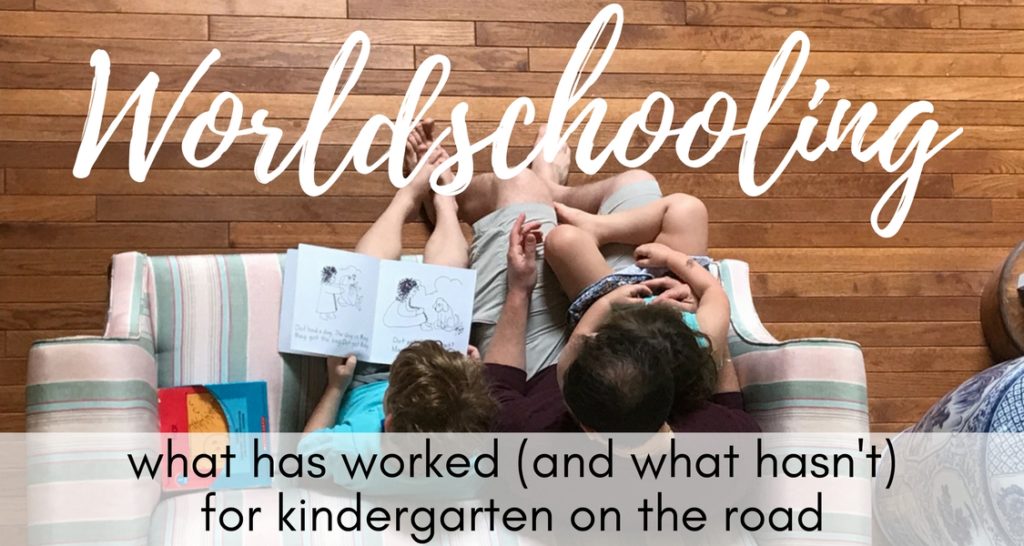
Sharing is caring!
There’s more than one way to skin a cat and there’s certainly more than one way to educate a child – and there are huge benefits of homeschooling for traveling families no matter how you do it. We are not professional educators, so the timing of our family gap year was in part motivated by feeling that we could handle Jacob’s kindergarten homeschool needs better than subsequent grades. We’ve now been homeschooling/roadschooling/worldschooling for almost the entire school year and have gleaned so much about what works for him as a learner and for us as parents. Read on to find our kindergarten homeschool curriculum (such as it is) and our successes and failures in homeschooling while traveling.
Kindergarten homeschooling curriculum goals for traveling families
Our primary concern in crafting our kindergarten homeschool curriculum was readiness for 1st grade in a traditional school in the US. While nothing is set in stone as of this writing, that has seemed like the most probable next step for our family and we wanted to assure him a smooth educational transition. As such, we focused our roadschooling efforts on the cumulative core subjects: reading, writing and math. For all other subjects, we assumed that our worldschooling adventures as we travel the world for a year would expand his young mind more than any classroom experience could. For context, our son attended preschool for several years before our family gap year including pre-k.
Our goals for reading were the same as for any kindergarten curriculum. We want our child to read age-appropriate books with fluency and joy. There are so many great resources available, which we’ll share below, that helped us quickly get Jacob from letter recognition to fully reading. A further goal was to work on reading comprehension skills.
At the start of our family travelling around the world, Jacob could recognize all of the letters but couldn’t necessarily write them well. Our curriculum goals were to improve handwriting and eventually get him writing independently (and with some depth) about his experiences. We hoped that he would enjoy documenting a kid’s world travel experience.
We didn’t establish a fixed math curriculum goal, but assumed that by the end of kindergarten he should be able to add and subtract two digit numbers, tell time and count out payments and change. When you’re homeschooling while traveling the world, so many of these skills come into play in daily life!
If I had to label our science kindergarten homeschool curriculum, perhaps I’d call it “understanding the world around us”. Kindergarteners have a natural curiosity about animals around the world and their habitats, so we planned to lean into that to also teach the kids about climate change, geology and more.
Social studies
Let’s be honest: worldschooling is the best social studies education money can buy. We didn’t have a fixed plan (perhaps this qualifies as “unschooling”?) but relied on exposing the kids to various histories, cultures, languages and more as we traveled across so many countries and continents.
Just like in traditional school, art is an important part of any curriculum. Our goal was just to encourage continued creativity. Jacob’s preferred medium is watercolor paint, so we brought his travel painting kit and watercolor book along with colored pencils.
Seven months in: our favorite kindergarten resources for homeschooling while traveling
My sister-in-law gave us her kids’ old BOB Books for our roadtrip and I quickly understood why! These books are absolutely perfect for beginning readers, with lots of repetition and slowly increasing length and difficulty. There are five sets in all, and we ended up purchasing most of them on Amazon since we didn’t want to drag the physical copies with us. I’d say that the first few sets of BOB Books are equivalent to the more common level 1 and early level 2 readers, though their sequential, cumulative nature makes them better for instruction. The fourth and fifth sets get rather complicated and long, more in line with harder level 2 readers and early level 3 readers. I initially thought that the illustrations and storylines wouldn’t be compelling to our very 21st-century child, but he stuck with them and really appreciated the sense of accomplishment he felt every time he finished reading a book. These were our favorite tools as traveling homeschoolers! Get your own set here .
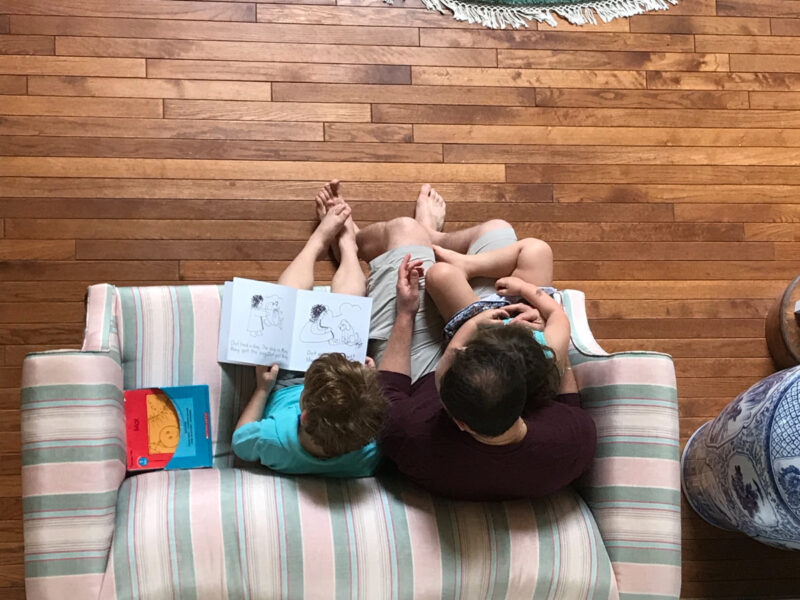
There are a variety of resources available for readers of all levels:
“Step into reading” books
For kids who have gone through at least the first few sets of BOB Books and have a solid foundation, the ubiquitous “step into reading” series is a great next step. We love that they have content that young kids know and love, including lots of Disney/Marvel tie-ins ( see the full list here ). There’s a decent amount of variation between books that are supposedly the same level, but any reading is good practice! Nearing the end of kindergarten, level 3 works well for Jacob. We always keep his Amazon Fire tablet stocked with a few options – check prices here . He has read too many of these to count, so here are a few favorites at each level:
Check out these sight word activities to help your kindergartener along!
Kindergarten workbooks
I know workbooks seem woefully out-of-date, and we were shocked and how well they worked for our family. We really appreciate the structure and sequencing, and the old-school pencil-and-paper methods worked well for Jacob compared to learning apps (more on those below in our “fails”). We found a workbook especially indispensable for working through letter formation, which he hadn’t learned well enough during pre-k. We bought workbooks in New Zealand and I literally bought the only relevant ones the discount store had for the subjects we needed (despite the stated age ranges not necessarily matching). The plan worked.
It is easy for us to assign a few pages of each subject for each day and we receive almost no push-back. Depending on the topic (new or review) we can decide how hands-on we need to be during each day’s session. They’re also great while we’re traveling so much, as we can do school work on planes and trains even without an internet connection. We restocked our workbook selection in Australia and will continue using them going forward until the next school year begins (and surely in future summers).
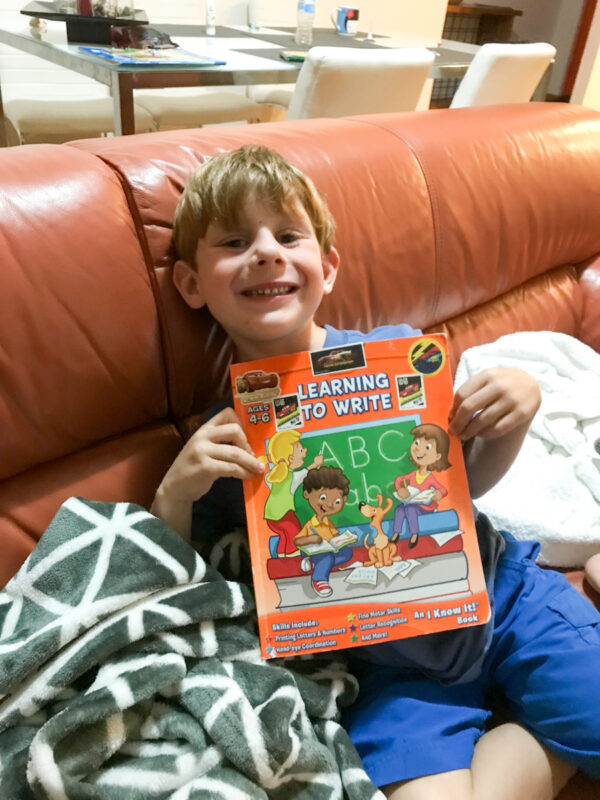
Amazon now carries the series we purchased in New Zealand , and we definitely recommend them! The graphics aren’t as important to us and the relatively low density – we did see some other choices that looked like they would overwhelm a young learner. We also prefer single-subject books for a few reasons: they’re lighter, and we can tailor the level to our child’s needs. He was simultaneously working through a handwriting book for ages 4-6 and a math workbook for ages 7-9! Note: my mom taught handwriting for years and STRONGLY recommends this book .
A word to the wise: pick up a good pack of mechanical pencils, lead and eraser refills… we spent the first few months constantly sharpening and re-sharpening low-quality novelty pencils, but finally picked up this set . And don’t forget the stickers for positive reinforcement! Here are some similar kindergarten workbooks available in the US:
Wild Kratts videos
PBS Kids Wild Kratts videos are some of the best TV shows for kids available today! The hosts, Chris and Martin Kratt, focus on one animal in each episode. Kids learn facts about the animals, but also about their habitats, threats and neighboring animals. So many times during our trip we have prepared for an animal encounter and the kids have already known more about the animals than we do! They have especially great coverage for Australian animals and various sea creatures. You can access some episodes of Wild Kratts for free with your Amazon Prime membership , or get all of PBS Kids through the new Amazon Channels service ( try it free here ).
Check out this science experiment you can do at home to learn about density!
Race the Wild book series
We spent a ton of time driving around New Zealand and Australia and wanted to avoid the kids being on their tablets all the time and hoped to inspire their sense of adventure. We decided that some read-aloud books would be a great choice, and to get us geared up for the region we picked Scholastic’s Race the Wild chapter book series (probably good for 2nd grade and up to read independently). The six books follow young Team Red as they compete to win a game show focused on both outdoor adventure and wildlife knowledge. They visit the Amazon rainforest, the Great Barrier Reef, Alaska, the African Savannah, the Australian Outback and even Nepal! Each chapter ends with either a “creature feature” or another fact-filled section about the local habitat, but learning is also integrated non-intrusively into the main text. If there were more books in the series, the kids would have been happy to continue reading them together.
Other travel books for kids
We’ve tried to read the kids books related to some of the places we’ve been visiting. Aside from the Race the Wild series above, we found some great kids books to get our children in the mood for some of our destinations:
Hear me out: LEGO has to be one of the best teaching tools in our arsenal. There have been plenty of days when the kids spent HOURS working on their creations (since we’re pretty laid back when it comes to site seeing… and waking up early). The ubiquitous and sharp-underfoot bricks help them develop great engineering and spatial reasoning skills and get the creative juices flowing when it comes to the building process and how they play with the fruits of their labor. There’s a lot of storytelling that goes on, especially with favorite themes like Ninjago and Friends. The kids seem to like those sets best because they provide more unique pieces and stronger character associations than either the plain “box of bricks” or City sets. How much LEGO are we dragging around the world? It’s almost embarrassing. Roughly one gallon in a ZipLock bag, weighing in at close to 2kg (what’s that about traveling light?). And they even received a few more very small sets over the holidays! If you want to keep your LEGO lovers happy on a long trip, sneak some of these tiny sets in the bottom of your backpack to dole out along the way. Shockingly, there are days when the two kids are both building and they seem a little low on bricks… and then there are days when we feel like we need one of these .
Your kid isn’t into LEGO? Check out these other great enriching hobbies that will grow their young minds.
Hands-on experiences and conversations
There’s not a good way to quantify this one, but getting out into the world to see different people, places and foods up close has been one of our most valuable teaching tools. Travel is an amazing educator! This part of our family’s curriculum falls under the “unschooling” model. The kids have met many people from indigenous communities around the world, and we’ve followed it up with discussions of European colonialism and the challenges facing those communities today. They’ve seen first-hand the impact of anthropogenic climate change on glaciers in New Zealand and on the Great Barrier Reef . We talked about military juntas in South America and Buddhism in Thailand. They’ve seen endangered animals in remote wildlife sanctuaries. We go on regular hikes to learn about different plant and animal life and how the earth can provide natural resources if we take care – and also just to appreciate nature’s beauty without commentary. There are so many aspects of the world that don’t resonate with kids unless you’re in the place . While we’re sure some of the details have gotten lost over so much travel, the broad strokes remain and will be a good starting place for future conversations.
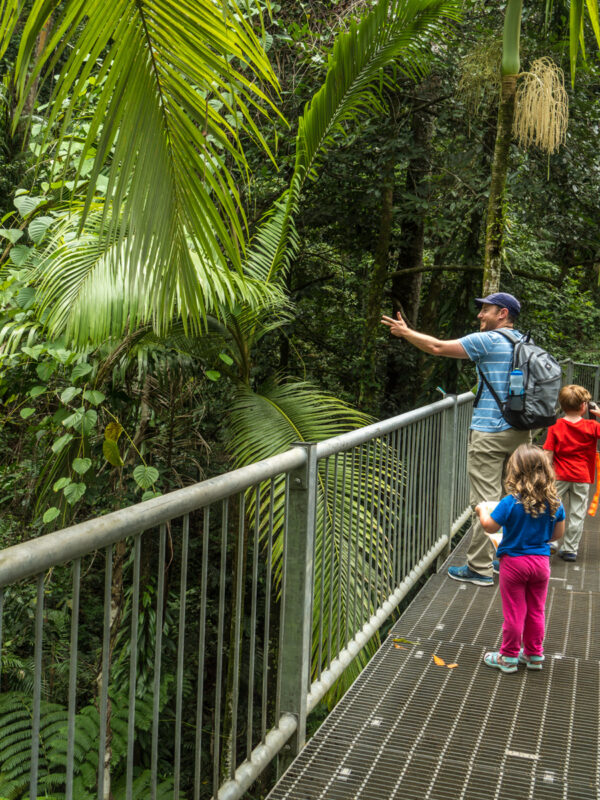
Our worldschooling fails
We tried a few things that didn’t work for our family! They may work great for other families, but we tried them and Jacob just wasn’t in a space to learn from them in the way we wanted. One of the huge benefits of homeschooling and worldschooling is that you can adjust your approach based on how your own child is responding, because we all know that kids are different!
Travel journal
This was our most disappointing fail! We tried from the outset to take a less formal approach to writing with Jacob by having him keep a travel journal. A great idea I read for kids his age was for the initial journal entry to be written by me (with him dictating) and for him to then hand-copy an increasing number of lines. We did it some, but it was like pulling teeth . We realize now that we were putting the cart before the horse – the kid was struggling to write individual letters, but we were asking him to write paragraphs! The dictation element worked fine and helped him work on his storytelling skills. Now that writing is less of a struggle, we may revisit the travel journal idea as we know that daily writing is part of many primary school curricula today.
Check out this cool downloadable kids travel journal !
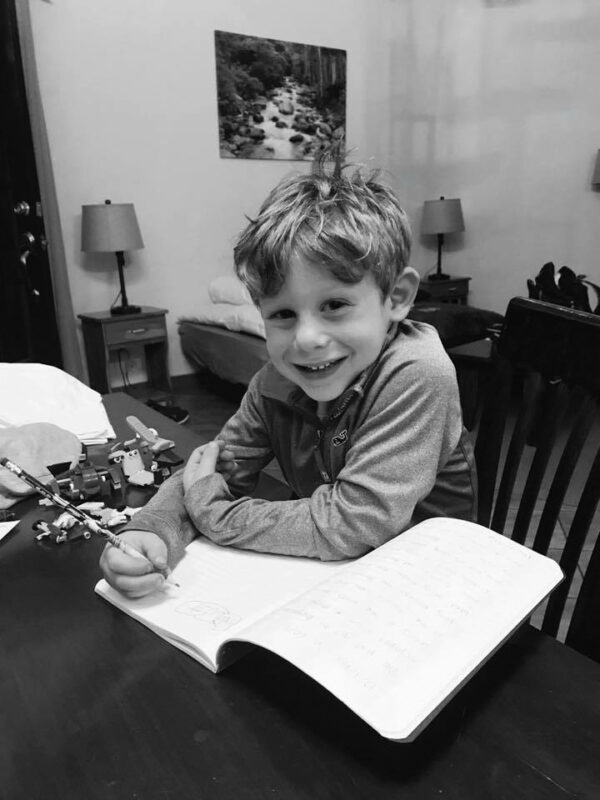
ABC Mouse review
The popular online learning website ABCMouse.com places ads everywhere and it seemed like it was worth a try – it offers activities for preschool through early primary school, so both kids would be able to take advantage of its offerings and families have the option to either follow the set “learning path” or choose activities based on their child’s needs. Kids earn tickets as a reward for completing each activity. First, what we like: ABCMouse does a good job of playing to different modalities of learning, with a combination of games, videos, stories and more to teach and reinforce each concept. Some of the activities are really very good for reinforcing concepts!
Unfortunately we now feel like the website has more shortcomings than advantages, and it’s been months since we’ve used it. Why? One of our biggest complaints, which we’ve heard voiced by other parents, is that the tickets begin to overwhelm the actual learning activities. We didn’t find a way to keep kids out of the section to buy junk with their tickets without sitting over their shoulders at every moment. Our other more serious gripe is that, while we paid extra for the assessment center, that tool was not at all integrated with the learning path! That’s just silly. The early stages of the kindergarten learning path had topics like letter identification that also appeared on the learning path for our 3yo. One of the benefits of homeschooling is the ability to follow each child’s individual pace, but that isn’t possible on ABC Mouse. We’d love to see tighter integration between the assessment center and the learning path, and even the ability to skip learning path modules with the parent password.
Our other challenge was that there’s virtually no functionality available without an internet connection, even if you’ve downloaded the app – not ideal for a family travelling around the world. The only available module is letter bubbles, which isn’t very helpful for a child working his way through chapter books. Sometimes the app didn’t work even with WiFi.
We actually preferred the preschool curriculum offered in ABC Mouse. It goes through all of the building blocks with lots of different activities to reinforce concepts like letter recognition and counting. Check out a free trial of ABC Mouse today to see if it’s a good tool for your family.
How we fit homeschooling into our family travel schedule
Every family integrates schooling into their travel schedule differently, and we constantly change things depending on what country we’re in and how busy we are. As we’ve been traveling longer and slowed our pace of tourist activities, we’ve taken to doing schoolwork in the morning before going out for the day. Our schedule in Argentina was jam-packed, but the flights every few days provided a good distraction-free environment to work on reading. In New Zealand and Australia, where the massive cost of food kept us eating at home most nights, schoolwork fit in nicely during dinner prep. In northern Thailand, where we had lots of early morning activities planned to beat the heat, we’d spend some time before dinner cleaning up, relaxing and doing some work (school for the kids, writing for me!).
Staying organized is always one of the biggest challenges, whether you’re worldschooling or working an office job. Check out these awesome planners to help mom and the rest of the family stay organized.
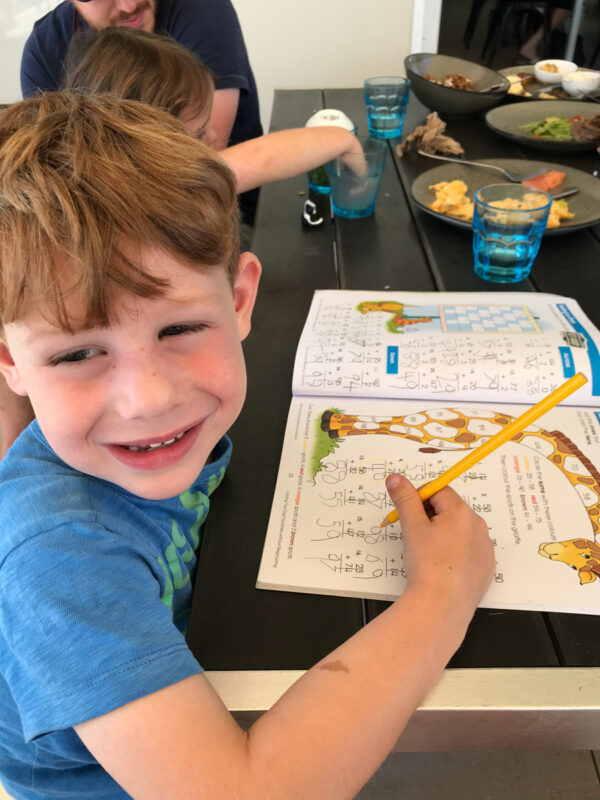
So how long do we spend on school work? Some days we spend an hour on Jacob’s core subjects and some days none at all. We probably average thirty minutes per day on formal workbooks and reading practice, but immeasurably more time on informal education! We practice reading menus in restaurants. We learn history and see culture as we stroll through a city. In that sense, you could consider that we average a solid six hours per day on educational ventures.
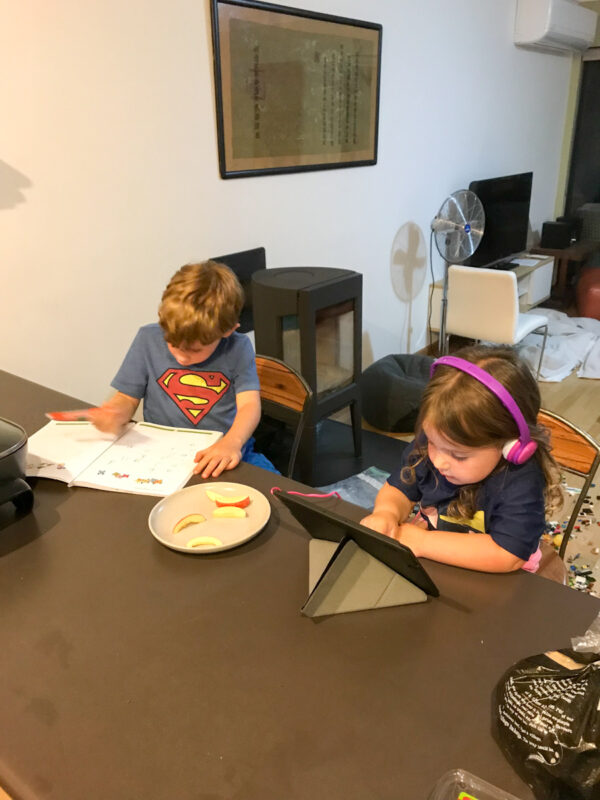
Practical tips for roadschooling
-Document your kid’s work! If you’re using workbooks, that’s obviously easy to manage. We sent some back to the US already and will probably send back more as we go to continue lightening our load. Documentation is important if you plan to re-enroll your child in a traditional school in the future.
-Find a teacher to talk with now and then if you have questions. I’m lucky to have connected with a primary school teacher online, and she’s been helpful when I’ve had questions about how to approach certain topics and making sure we’re on the right track.
-Read the mood and don’t feel constrained by the “regular” school schedule. There are days when I can tell that it’s going to be a really productive session and we’ll get through a ton of material. And there are days when that’s not going to happen, so we just go through the minimum we need to do to keep momentum and make sure the material stays fresh. We love having the flexibility to roll with the punches, and we fully expect to continue learning at some pace even through the summer. So we may cover some material like writing more slowly, but we’ll keep going right up until the start of the next school year.
-Adapt to fit the location. After all, travel is the best teacher! We didn’t talk about science at all in northern Chile, but spent a lot of time on 20th century history. We flipped when we got to southern Chile and learned about volcanic and geothermal activity.
Are you a homeschooling/roadschooling/worldschooling Family? Share your tips below!
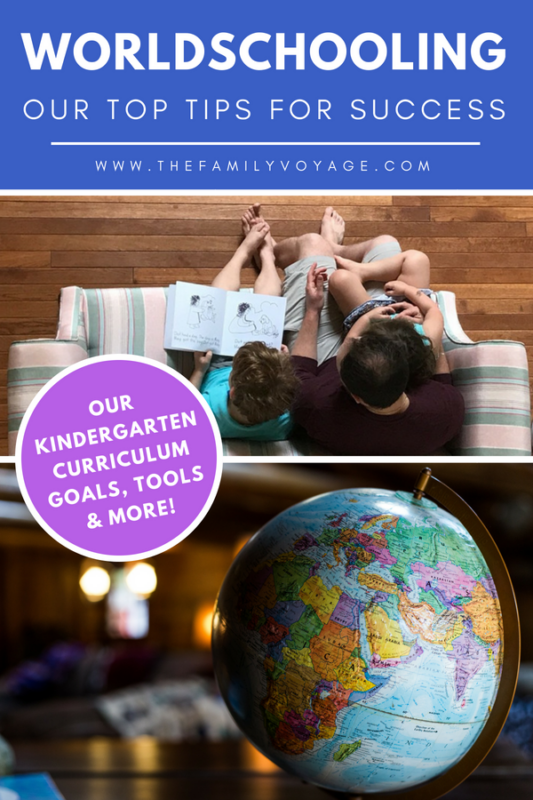
What to read next
5 thoughts on “worldschooling adventures: our kindergarten homeschool curriculum”.
Wow — I didn’t read carefully enough the first time to realize that we’re actually REALLY similar in the books we’ve chosen! Norah’s first readers were the BOB books 😉 (Of course, they made me want to stab my eyes out, but … all’s well that ends well, I guess?) I’ve gotten her one of the “Ride the Wild” books for when we’re in Costa Rica this summer — the Amazon one, but I figure it’s probably about the same and if it’s a good book, at the right level, it’s probably a win! And I just bought some of the math workbooks you recommended. Thanks!!!
We failed at the travel journal too … just getting him to draw a picture was like pulling teeth! Will try again next trip! It worked easier when I was able to work one-on-one with him, but with a 4 year old at my side constantly, my 6 year olds concentration was with what his brother was playing with!
Glad we’re not alone!!! It’s a nice idea ?
What a great post! My husband and I have been deciding on the when, where, and how for our year abroad. My daughter will be kindergarten age and my son 3 when we set off. The information in this post is incredibly helpful for me see what homeschooling while traveling abroad might look like. As a seasoned traveler, I agree that there the world is the best classroom! Thanks for sharing your experience.
My pleasure! Hit me up if you ever have any questions 😊
Leave a Comment Cancel reply
Save my name, email, and website in this browser for the next time I comment.
This site uses Akismet to reduce spam. Learn how your comment data is processed .

Homeschooling On The Road | Benefits & Challenges
THIS POST MAY CONTAIN COMPENSATED LINKS. FIND MORE INFO IN MY DISCLAIMER.
Home » Homeschooling On The Road | Benefits & Challenges
Traveling the world as a family is an incredible way to raise your children. However, while you’re discovering new cultures and landscapes, you may also need to explore homeschooling on the road.
Children need to learn while they grow, but there are more ways than one for them to do this.
And while schools and classrooms have been designed to teach kids in an organized way, traveling homeschoolers have a different approach to preparing children for their futures.
Tip: Check out our Kids Travel Journal and Travel Activity Book here .
Homeschooling on the Road
Here are some of the benefits of schooling children while traveling , as well as a few challenges you may come across.
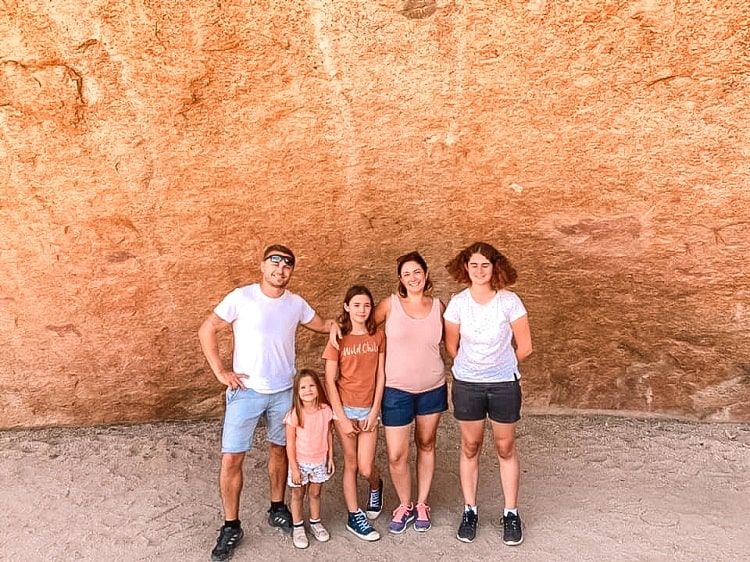
6 Benefits Of Homeschooling Abroad
The great thing about starting to homeschool on the road is that there have been parents before you who have done the same.
They’ve figured out what works for them and what doesn’t, and they’ve seen all of the benefits that this approach to teaching has brought.
1. Unparalleled Experiences
Children who learn on the road experience a lot more than those who remain seated in a classroom each day.
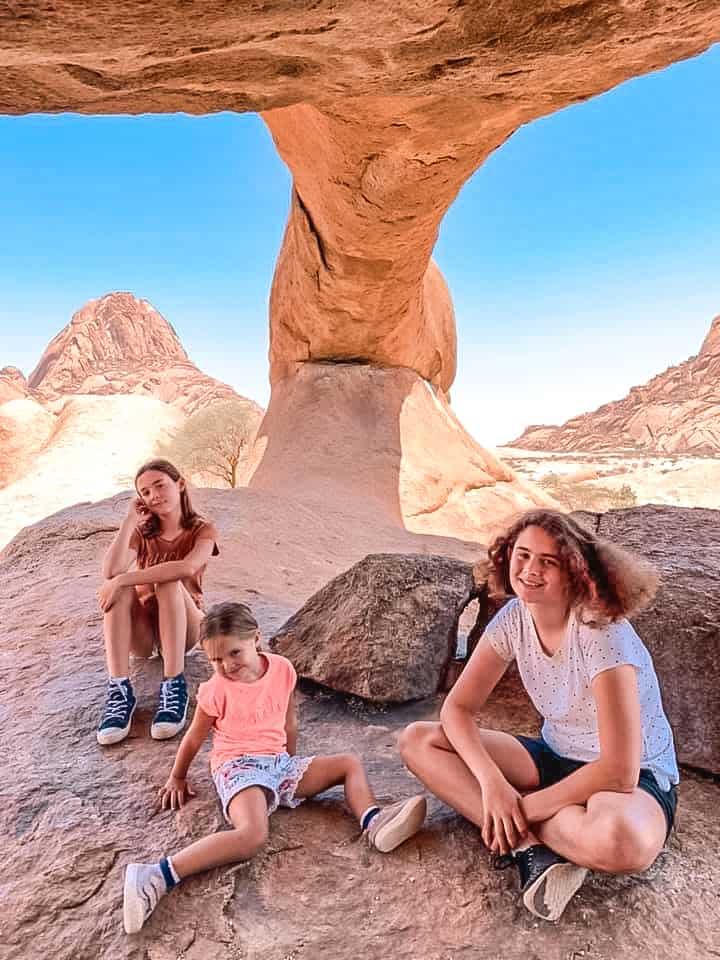
Most kids will learn about the world from books and screens. With worldschooling, children can learn about these things first-hand.
You may choose to spend 3 months in Amsterdam, cycling into the countryside for lunch, or take a quick trip to Iceland to experience the Northern Lights.
The great thing about traveling and homeschooling is that you’re not bound to school semesters.
You have more freedom in your days, weeks, and years. And this freedom can be enjoyed together as a family.
3. Real-world Skills and Lessons
The world contains all the lessons that are taught in a classroom. Where better to learn about the Roman gladiators than at the Colosseum?
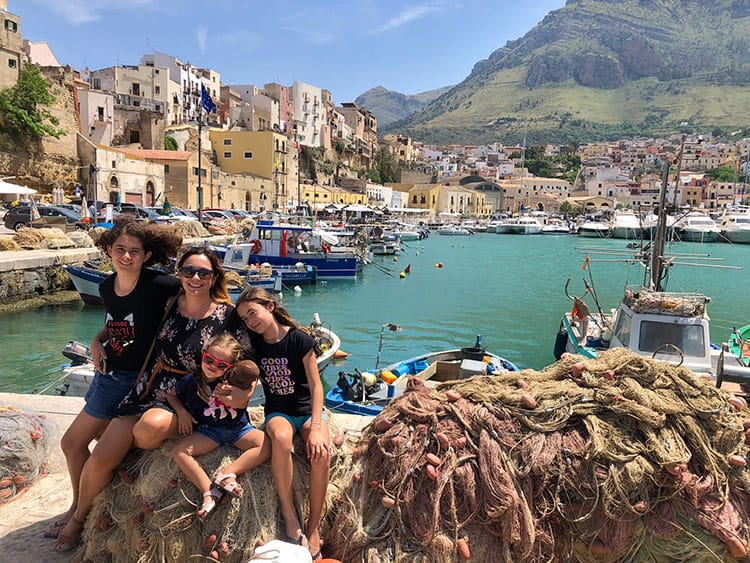
There’s no better place to learn about the Great Wall of China than in China itself. And what could be more inspiring to young children interested in art and history than browsing the museums in Vienna?
4. Tighter Family Bonds
After a few months of spending 24/7 with your entire family, you’ll start to notice the strong bond forming between each member of the family.
You’ll have real conversations with your children, learn more about them as people, and create unforgettable memories together. Not every day will be smooth sailing.
But there’s bound to be a lot more laughs around the dinner table after a day of learning about wild animals on a real African safari .
5. One-on-One Attention For Your Child
In a classroom, your child will have to share the teacher’s attention with a group of other students. But when they’re being taught at home, they are able to receive individual attention.
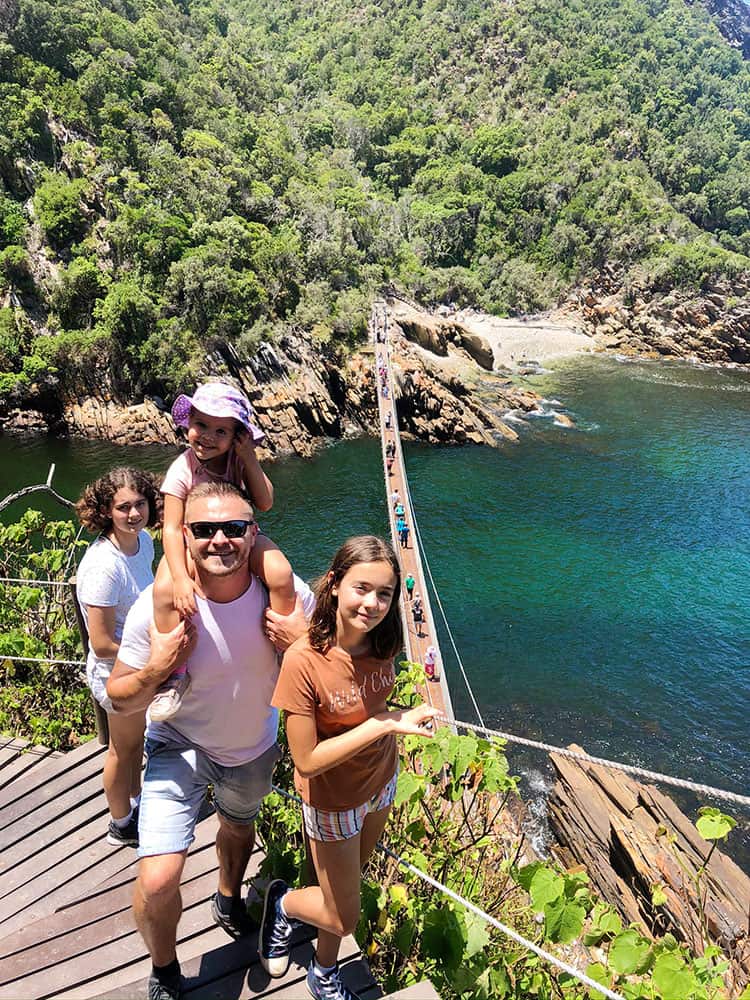
This can be extremely beneficial for children who need a little extra help with subjects. Allowing them enough time to enjoy their work and develop their interests.
6. Friends All Over The World
Most homeschooled children are thought to be lacking social skills, and when you’re traveling long-term with kids it may seem like they have no contact with other kids their age. But it’s really not true.
Roadschooling allows children to make lifelong friends all over the world!
7 Challenges Of Homeschooling While Traveling The World
While homeschooling for traveling families can be an exceptional experience for all involved, it comes with its own set of obstacles to overcome.
And to be honest it can be draining on the parent that is mainly responsible for the teaching. A great way to stay uplifted and motivated is to pop a few homeschool memes in your diary. I like to switch these out on a regular basis.
1. Sibling Conflict
We mentioned family bonding, which is a great benefit of homeschooling around the world. But there’s no denying that at times, siblings are not going to be the best of friends.
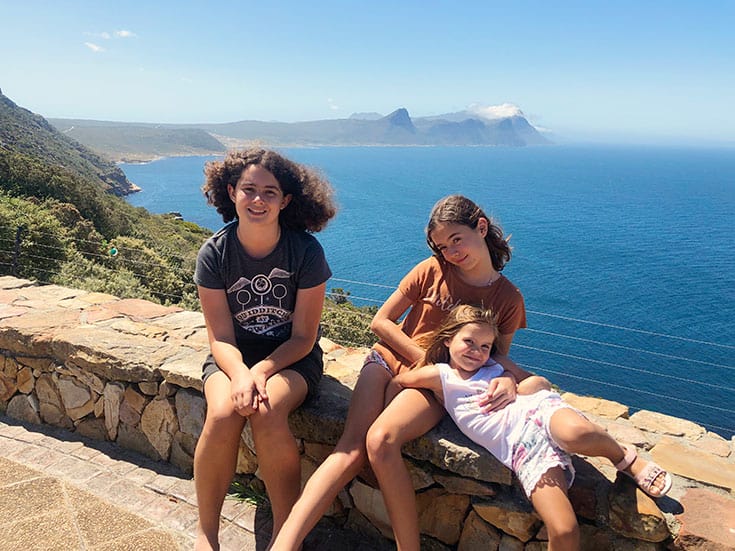
Giving each child some of their own time and space can help with the bickering.
2. Time Constraints
It may seem like packing up and traveling the world would give you more time to do the things that matter. But when you have more than one child and you’re also working, time can be short.
You’re also traveling for a reason – to see the world. So you don’t want to be stuck inside doing algebra while you could be exploring the city of Rome .
By scheduling your time to fit exploring, schooling, work, and family time, you’ll ensure fewer hassles for the whole family.
3. Battling Lack of Motivation
While at home, kids may not be motivated to do any schoolwork. This can be frustrating, but you have the freedom to give them a break and switch up their schedules. Or offer them something more fun to learn for the day.
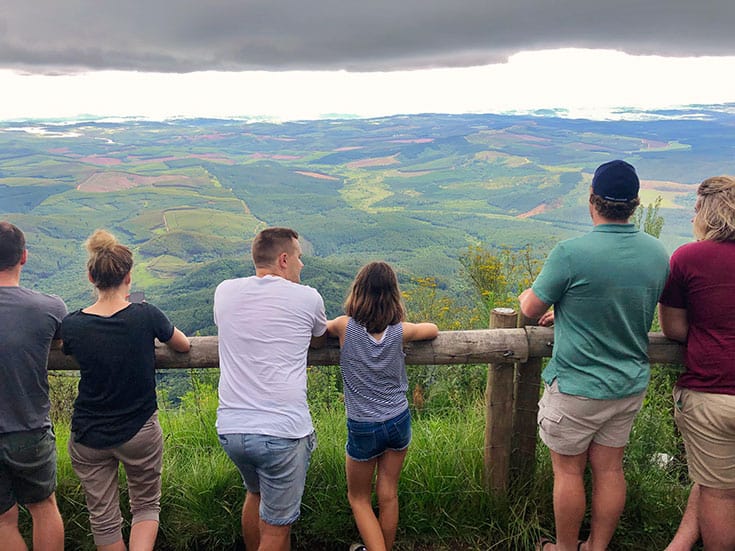
4. Higher Costs
Depending on the curriculum you chose to use to school your kids, the costs may actually be higher than sending them to school.
There are, of course, many free resources available on the internet, and an abundance of support as well. Before making the commitment to homeschool, it’s wise to research the best options for your budget.
5. Lack of Facilities
The real world is full of educational opportunities, but there are facilities that your kids will miss out on the road. Things like sports fields, science equipment, and gyms.
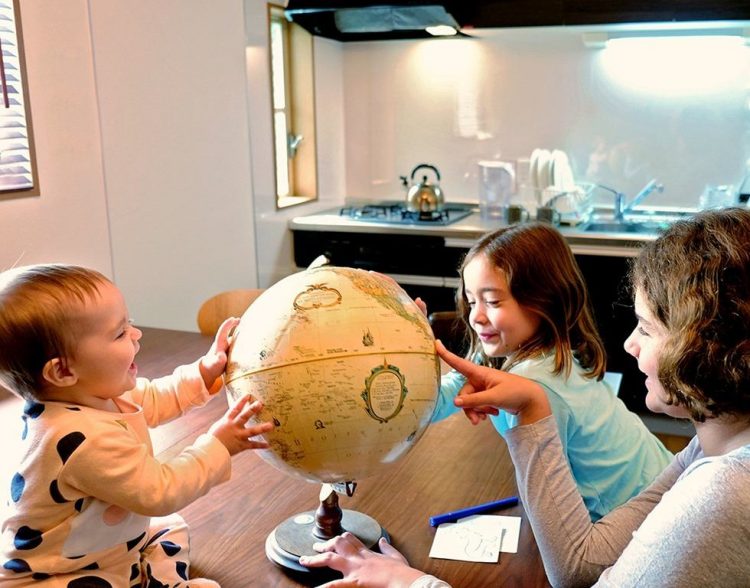
Thankfully, with a bit of preplanning, you’ll easily find facilities to rent or use wherever you are. And if you don’t, you can always improvise.
6. Finding a Healthy Balance
Finding a balance between school and fun can be hard. It’s similar to working from home, where work never really leaves. Likewise, it can be hard to get kids to focus on school while on the road.
Scheduling your time effectively and having a ‘schoolwork space’ can help create a more balanced lifestyle for everyone.
7. Family Concerns
When you announce that you’re going to be homeschooling your children, your friends and family will likely have mixed reactions. There may be some concerns over the kids’ wellbeing and future.
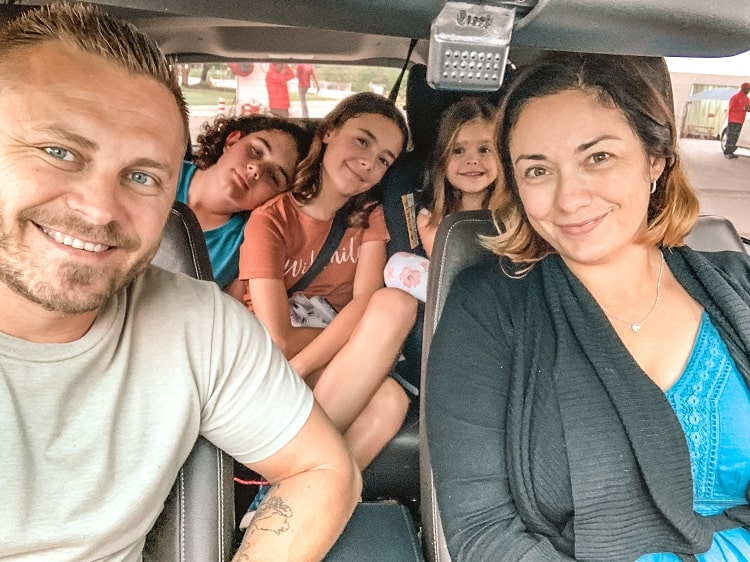
Thankfully, we live in a time where quite a few families have done this before us. So it’s easy to show examples of how children have excelled at university after being homeschooled . Or how having friends all over the world make up for not seeing your classmates each day.
Don’t let the (usually well-meaning) opinions of others affect your decision.
Roadschooling – Is It For You?
If you do want to see the world and let your kids travel, homeschooling is a great option.
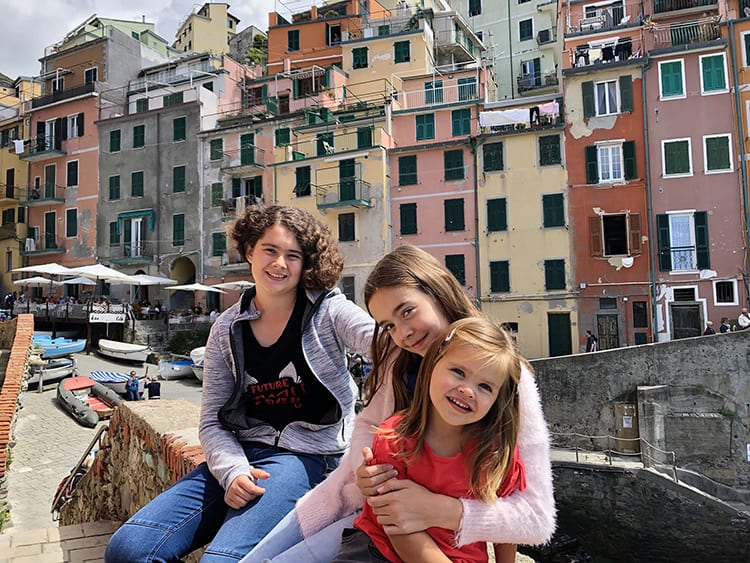
If you have homeschooled your children from the start, then traveling the world while they learn is most likely a natural progression.
For kids who have been in mainstream schools and then change to homeschooling, it may be more of an adjustment.
It’s important to remember that what works for one family may not work for another, and there is no right or wrong way to worldschool.
Figure it out as you go, find other families and connect with them, and most importantly, have fun.
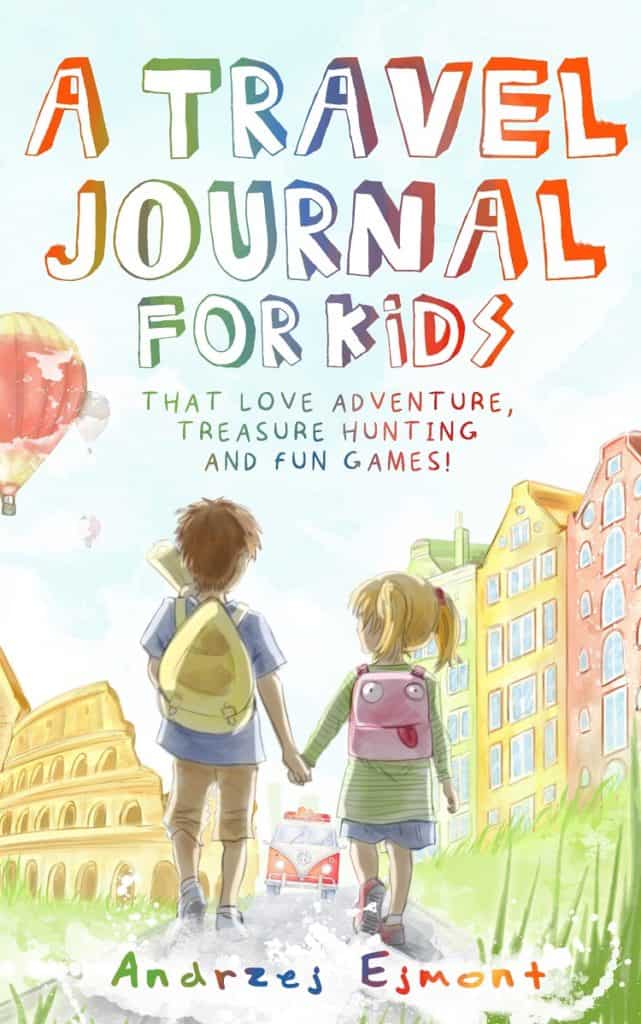
Click the button and get your copy of the “A Travel Journal for Kids” on Amazon now:

Andrzej Ejmont
2024 - Wanderlust Storytellers. All Rights Reserved.
About Us | Contact Us | Work with Us | Privacy Policy | Disclaimer
* Disclaimer: Wanderluststorytellers.com is a participant in the Amazon Services LLC Associates Program, an affiliate advertising program designed to provide a means for sites to earn advertising fees by advertising and linking to amazon.com and other Amazon sites.

World Schooling. One Year of Travel. Homeschooling Highlights
This post may contain affiliate links.
This post was written after our first full year of homeschooling around the world. We continues homeschooling worldwide for another 6 years until lockdowns forced us to stop home or world schooling. This is our year end wrap up after homeschooling in Sri Lanka, Laos, Thailand, Malaysia, the UK and many more countries. We even took a homeschooling cruise and found many educational oportunities there. The following is what I originally wrote at the end of 1 year of homeschooling in the world.

“It’s really hard to quantify learning. The knowledge the boys have acquired through our 1 year journey, 4 continents and 12 countries, is immense, quite staggering really. Here are some of our homeschooling , or, if you prefer, world schooling or unschooling, highlights.
We didn’t just try worldschooling for a year, my kids’ whole education has revolved around worldschooling, but this post was written at the end of our first 12 months of travel. Find out more about around the world travel with kids here. This post should give you an idea of what and how much kids can learn out in the real world, instead of confined to classrooms.
I’m not talking about the personal qualities and emotional development here, nor the book learning, just the things that most people would recognise as “school” that the kids have picked up naturally through global strewing without having to attend. That is almost what is called unschooling, it is worldschooling or natural learning.
Unschooling is by definition fully child lead learning. There are a lot of definitions in the homeschooling world, we mostly ignore all of them and just do what works for us.
These are just the highlights, the things that spring to my mind right now, a taster if you like. There is so much more. If you’re anxious about taking your child out of school to travel, please, don’t be. Just read and get a feel for the sort of learning travelling kids pick up. It’s pretty phenomenal.
If then you want more, try our guide to world schooling.
This post was written when both boys were under 10. I think I had a 7 year old and a 9 year old. Now I have a worldschooling teenager in his high school years and an 11 year old. Their unconventional education and interesting nomadic lifestyle is still keeping us all happy and the knowledge flowing. They and we are very happy with our choices.
The Learning Travelling or “World Schooling” Kids Pick Up. A Taster
Countries, continents, oceans and seas..
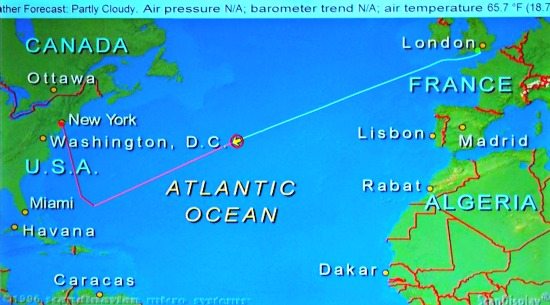
They’d beat most adults on this!
They’ve crossed the Atlantic twice and sailed through the Sargasso Sea. They’ve visited the Mediterranean, the Gulf of Thailand and the Indian Ocean.
They know where Laos is and what it’s like. Plenty of adults don’t.
They know that Central America is part of North America. (same)
They’re good.
A lot of our Geographical learning came from our favourite Explorers book that we read over and over again in Thailand. There is a link to the book in this post.
Blogging and Computer Skills.
Both of them can now use the WordPress interface, write and publish a blog post. That’s not a school skill, it’s a job skill.
They also made a video post, planned, produced and scripted themselves. Boo interviewed his brother. His blog is called Boy Around the World and it was on wordpress.com, a free blogging platform. If you are interested in setting up a real blog or website, like this one, you can find out how here .
Photo Editing Skills.

They can crop, enhance, re-size, add captions and effects. More importantly, they love doing it. This is one of Boo’s efforts for his blog.
They know a decent amount of Spanish and words of greeting in many languages. It’s a good start.
We’ll continue with our Spanish over the summer, maybe work on our French too. They know why so many countries speak Spanish and that there are many variations on the language.
My 7 year old can convert between Baht, Laos Kip and Dollars faster than I can!
Basic arithmetic comes easily and naturally, particularly when they have plenty of practice.

History has been huge. You can’t escape history as you travel and learning history from the real world is absolutely the best way to understand and discover.
The Spanish conquest of Central America has been a big topic.
They know everything they need to know about the Mayans thanks to 7 weeks in Central America and an amazing guide at Tikal.
The Mayans are still around today, we stayed in a Mayan town, heard their language and watched them worship.
The spice trade, ancient conquests and trade routes cropped up over and over again.

The history of the USA, slavery and the civil war was something we re visited.
We learnt more about World War II history in Kanchanaburi , at the bridge on the River Kwai and related museums.
Vietnam war history in Laos was inescapable, we saw that the effects of the American cluster bombings still continue today.
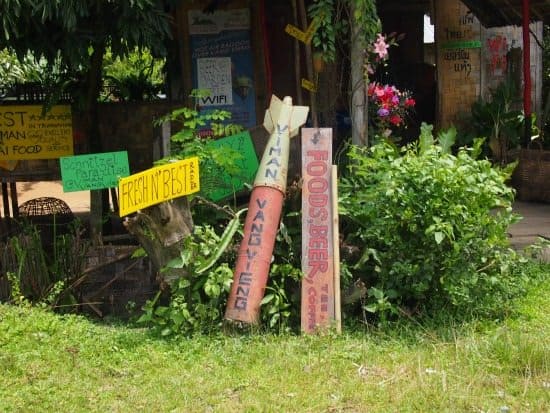
This post was written after just one year of worldschooling, one year of full time family travel. We continued this journey for many more years and have other posts on travel as education on this site.
Music and Dance

We have watched classical Kanyan dance in Sri Lanka along with flamenco, jazz, Latin and jive on a cruise ship .
They have seen tribute bands perform Elvis, Katy Perry, Frankie Valley, and the Beatles. D got up on stage to sing with the Fab Four and sang 80s karaoke with his team of lovely backing singers several times.
We have car-sung our way around the USA, seen live jazz and blues performed on the streets in New Orleans and really got to grips with the development of music in the South from slave days to Elvis.
We sang Christmas carols for pensioners on a wonderful evening with the vicar and her crew in Wales. Our travel has brought endless musical opportunities. I’d take this over learning to play the recorder any day.

The boys have seen hundreds of works by Salvador Dali at his Theatre Museum in Figueres, Catalonia and watched his movie collaboration with Walt Disney in the art gallery on Norwegian Getaway.
They have briefly visited London’s National Gallery to see the Van Goughs , we ‘ll be back for more.
They know something about Islamic art and why it is as it is and they’ve visited The Tate Modern several times.
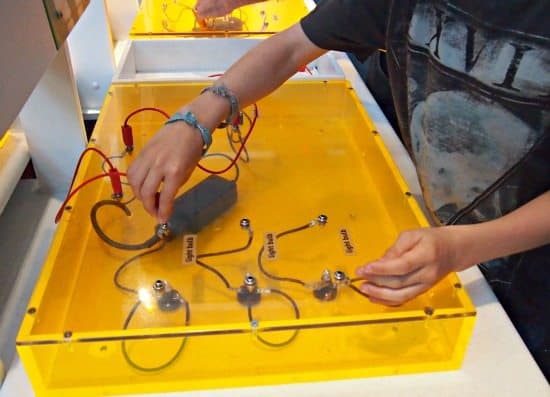
We spent just 3 hours at London’s Science Museum and recapped simple machines, Newton’s laws, magnetism, electricity generation and circuits. I watched a few dads fail to set up the circuits correctly, we got it right!
We visited Petrosains, another science museum, in Kuala Lumpur, it focussed more on the petrochemical industry. (This would be one of the best places to take kids in Kuala Lumpur )
The kids helped care for injured turtles in Sri Lanka. They already knew about the dangers of marine pollution thanks to our work with Tangaroa Blue , but this brought it home even more strongly.
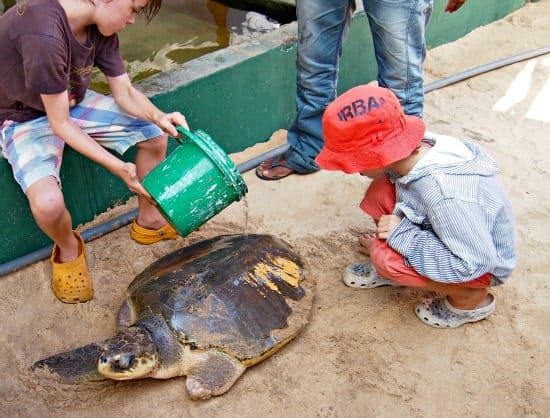
We’ve talked about flower structure and function on a tea plantation in Sri Lanka.
We’ve addressed pollinators and pollination, crop rotation and farming methods.
Is all this science or geography? the division is blurry, it’s great that we can approach subjects as a whole not put them in boxes.
Sports and Games
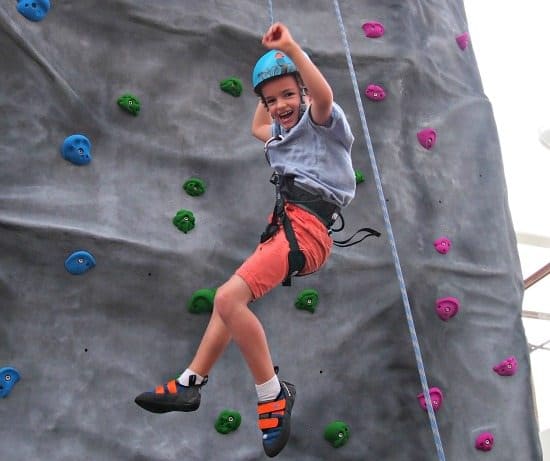
The boys are now good at pool and darts, D even won a certificate for darts in Malaysia. They’re happy to take on adults and have done, often. Say what you will, both games are good life skills.
On both cruises they have played team and individual games with other children in kids’ club.
They became proficient kayakers on Ko Phangan , D is as good as us and just as confident on the water.
The kids tried real archery in Kuala Lumpur, something they’ve been desperate to try since a friend produced home-made bows and arrows for them back home.
As a family we have played boules, Laos and Thai volleyball.
Tested their physical skills and bravery through tubing, caving and kayaking in Laos and taking on huge climbing walls on both cruise ships was great for them.
I will never forget them both dancing standing on kayaks as we floated down the rapids while new Korean friends sang Gangnam Style for them.
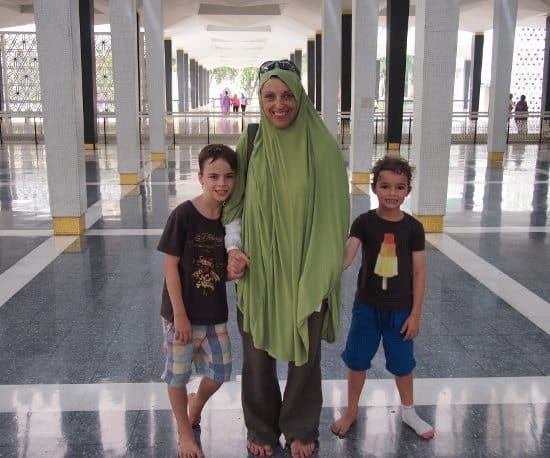
These children of mine have visited Cathedrals, Churches, Buddhist Temples, Mosques, Hindu temples and seen ancient Mayan religious practices.
They know which religions belong where on the globe and they know all that they need to know about Jesus , the Romans and Christianity after spending Easter in Guatemala.
We visited with the Amish in Pennsylvania .
They know that you have to dress in a certain manner and respect different religions, each in their own way.
Heck, they even know all about voodoo!

Hover and click, add this to your Pinterest collection. This photo was taken at a science museum in Kuala Lumpur and you can find out all about it in our Kuala Lumpur with Kids post. It’s a worldschoolers’ dream of a city!
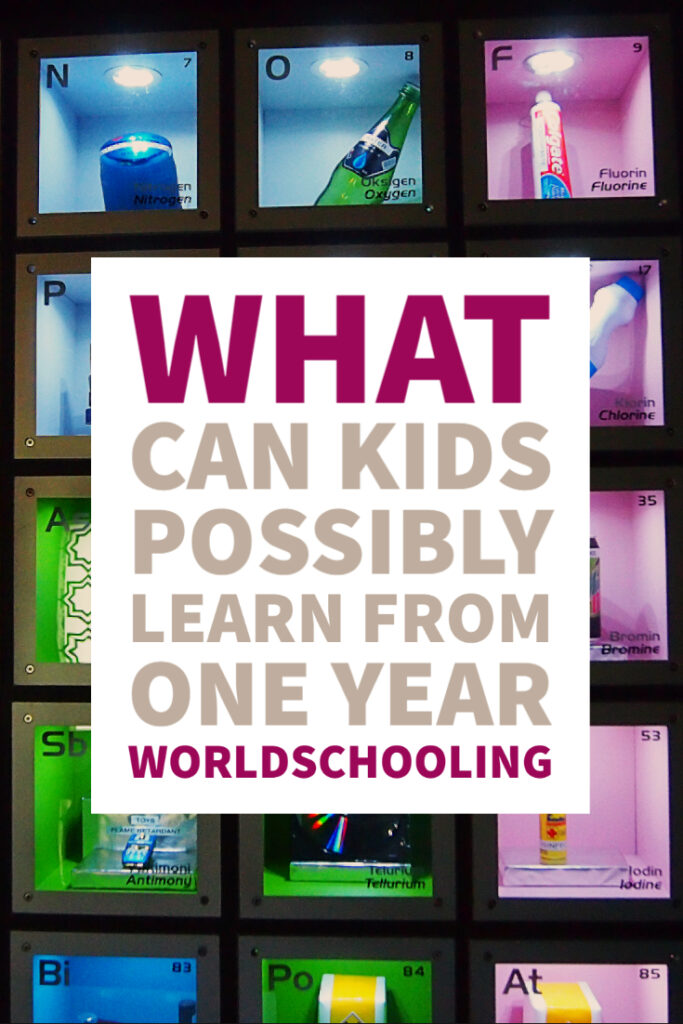
Health and Hygiene
Vaccinations , immune reactions, personal cleanliness and health risks crop up again and again.
My scientific background is very handy here, I’d say they were on high school level already.
Homeschooling Around The World For A Year – Other Learning
Sorry, I forgot to mention a few things the kids learned from homeschooling worldwide.
- The Smithsonian aviation museum in Washington DC where the boys tried their hands at flying planes, learnt about the Wright brothers and saw the Enola Gay, sparking questions about the end of the war. They saw their favourite explorer’s actual flying suit and know what an incredible woman Amelia Earhart was.
- The New York Natural History Museum, the Night at the Museum one, where they got a taste of Indiginous North American peoples and their lives. They saw totem poles for the first time and then saw more on our day in the Everglades .
- They watched a solar eclipse.
- We saw a rocket launch at Cape Canaveral and toured Kennedy Space Centre for the second time, there’s not much they don’t know about space exploration. They met an astronaut!
- We’ve compared and contrasted climatic zones and ecosystems. We saw our first sub-tropical rainforest and how different it is to those we know well from living in the tropics, the tropical sort.
- Adaptation of plants and animals to their environments were big topics. We saw a live octopus in a rockpool, blue whales and mongooses in Sri Lanka and black squirrels in Canada.
- They have seen chocolate being made, silk worms and weavers at work to make fabrics, watched craftsmen make every kind of wooden or woven object. The kids owned a Laos violin for a while and busked with it, just for fun. They have seen that there are many, many job possibilities in the world beside teacher, fireman or doctor.
- They’ve seen the variation in staple foods around the world and seen the effort that goes into their production.
So what do you think, have I convinced you? I can’t post photos of the friends they’ve made, from all cultures and countries and of all ages, but there are many, some, I hope, we will see again. What do you think, school or travel ( world schooling) ? Which gives kids the most extensive and amazing education?
If I haven’t convinced you, let me know, I’ll keep on trying. This is an old post written during the boys’ first full year of travel. We’d only been worldschooling for a year. What they have learned through travel and exposure to the world ( alongside conventional online tools and books ) has been quite phenomenal. If you’re looking for information on what one year of worldschooling costs or how to afford worldschooling , that information is also on our website. We also have a post on equipment you need to worldschool. Sign up to follow and share with your friends.
- Facebook 777
- Pinterest 2011
If you'd like to hire a car during your stay, use this car rental comparison tool to find the best deal! We also suggest you take a look at this company to get a quote for all kinds of the more tricky adventure or extended travel insurance. Try Stayz / VRBO for an alternative way to find rentals on homes/apartments/condos in any country!
Related Posts:

Alyson Long
The crappy bits from 1 year of travel – travel lowlights, why visit hawaii, 60 thoughts on “world schooling. one year of travel. homeschooling highlights”.
Sorry it is so late thanks for replying
It’s mid-morning here 🙂
I’m not an adult yet or a parent but I think this sounds amazing and when I do have kids would love to do this
That’s good to hear Jessica. When I was younger I always wanted to homeschool, but when my kids came along there was a lot of peer pressure to conform and put them in school with all the other kids. It’s hard to break free of what everyone else is doing and a lot of people will dislike you for it. But stick to your guns, believe in yourself and in your kids. I have the proof and the outcome right here. Don’t be a sheep.
I found that travel is by far the most educational experience I’ve ever had, so no need to be convinced. I am at the moment grappling with basics. How does one set up an “area” where kids can keep up with more traditional curriculums like math? I am prone to chaos and disorganization, so I find that my first concerns are: How will I keep things tidy? Where will I store stuff? And…how will I provide a clutter-free, designated space to work?
So you’re talking about worldschooling not homeschooling right? If you choose to do formal learning like that ( which most don’t it’s not necessary) you’ll be doing it in hotels , cafes, bars and restaurants. Wherever you can sit quietly at a table for an hour or so. You just have a couple of books in your bag and a laptop or three, so there’s no mess consideration at all. There’s no ” keeping up” because there’s nothing to keep up with. You’ve left the system. You have to carry your gear, so you keep it minimal. Online tools such as Studdy Ladder, Khan Academy, there’s loads, plus either a note book or work book each and some pencils. But I’m telling you for a fact that kids pick up the basics of maths without any teaching required at all and once they get to high school level the content isn’t relevant to life. So you make a choice. Are the kids going to continue to learn formal maths for the purposes of passing exams…and that is the only purpose. Or do you leave them free to explore subjects, topics and elements of life that they enjoy – which could be maths- but more likely something they will create their future income around.
YES! I love this so much! There is SO much to learn in the world and your kiddos are getting a first hand account! Keep doing what you’re doing!!
Thank you Taryn. And that was only year 1 !
This is so amazing!!! I love this blog! The best!!! We are starting our one year world tour April 1st 2020!!! as well. We are NV residents. They are homeschool under that law. Its easy no state test etc requirements unless I want to test them. I’m excited for my girls! They are 11 & 8 they will continue gymnastics, dance and volunteer work on the tour.. I learned so much from your blog!!
My question is this… What country are you originally from? Who regulate it? Nevada , USA isn’t strict so that’s the good news!
I want to be compliant… I guess! You seem to have tons of knowledge!
We do have 9 subjects. I need that structure because I have a Mobile Ministry and two companies!
Thank you in advance! Please don’t laugh at my ignorance on this matter!!
We are British Taryn. The UK has great homeschool regulation. Parents simply have to provide their kids with a quality education. They can either do that by employing a school or some other way. This is a very, very old post, maybe 7 or 8 years old. I’m surprised you found it. I’ll need to re-read it and see what’s in it.
This served as an inspiration for our family. We are embarking on world schooling slowly.. ????????
Hi Alyson, I too, like the many of us applaud your approach, choice, life. Your children will look back and owe so much to these years of sacrifice. I am comparing your journey(s) with my plans…. We live in the US, but My family is from Suriname and I was born in The Netherlands. I am no longer willing to send my daughters to a substandard public school, instead I am planning to take them to meet and learn more about their family and culture. and I am already experiencing so much negativity….I’m sure I don’t have to go down the list… reading the many comments have encouraged me more and I am now determined to do this! I would like more information about how you manage to fund everything and what your opinion is on doing this as a single mother, perhaps you know of single parents already engaged in this wonderful life style….?BTW, I am really excited about finding your site and I hope that we can exchange experiences and information. Thank you! -Monique (Mother of a 8 and 10 year old)
Hi Monique. If you go to our money section, under categories, you’ll find posts on how we saved for a year, spent $30K in our first year and now fund our further travels through blogging and some casual work. Try here https://worldtravelfamily.com/category/money-to-travel/ All the very best of luck, sounds like a wonderful plan. I know two single mums, both bloggers, Lainie Liberty of Raising Miro and Project Worldschol and Ruth Johnson of Explorermum and Explorerson. Catch you later!
Hello! I just stumbled across your blog and was curious to know if you and your family are still ‘on the road’? We recently embarked upon a similar journey, and I am curious about your methods of teaching. I, too, am home/un/world schooling (whichever you want to call it), and I wondered how you plan your days. Do you schedule your days/weeks/months in advance, based on where you are, or do you just see what each day brings and make a learning opportunity out of it? I have 3 children (10, 4, and 2), so they’re all learning at very different paces. We’ve been on the road for 4 months now, but I don’t quite feel like we’re in a comfortable place where we’re maximizing our opportunity to learn about what’s around us. I appreciate any feedback! I can’t wait to read more of your posts!
Yes we are. We’e in Nepal, just returned from Everest region. Too much information to put in a comment, sorry. Maybe I can write a post for you or put this question on Facebook. Did you sign up to follow?
Lovely. Nepal is definitely on our list of places to visit.
Thank you for your reply. I do believe I went through all the subscription steps. You are welcome to post my question on Facebook. I will try to find you on there to follow as well.
Looking into taking a year off of public school and travel with my sixth grader (will be 11). We have traveled all over Europe but will be heading back to the states this year. Do you work while you ‘world school?’. I am a teacher but will be taking the year off and I’m trying to figure out how to finance this and make it a reality for my kid. I do have some money saved but was looking for helpful advice.
I’m a professional travel blogger April. My work brings in maybe enough to fund 1 person on the road. Mostly we live off savings. But while we travel I hardly focus on work, there’s just no time unless we stop somewhere for a month. I work from 4am, while the kids are asleep, but in India, with mostly no in-room wifi, that has been impossible. There are lots of posts about money on the blog. Try here https://worldtravelfamily.com/6-ways-change-life-become-free/ or here https://worldtravelfamily.com/cost-breakdown-1-year-travel/
Hi Alison, We’re also from Queensland! My main concern is, if our children choose to attend UNI how is that done without any proof of ‘conventional ‘ schooling and a certificate? Our children are 12, 12, 11, & 4. They love travel and are constantly asking when are we off again. We are wanting to go abroad for 12 months, the children have no anxieties about leaving it all behind for a year long adventure, I however, have no idea where to start!
There are many alternate pathways. Some attend TAFE and go in via that route. You need no proof of schooling, no record, that is a misconception. You could just go back to school for the final year and do the exams, some do open unversity courses and get in that way, some get in through their own merit, through portfolios of whatever it is they are passionate about. I don’t know the Australian system well, I’m British, mine will be using the UK system. May I suggest you find Homeschool Australia and ask there, you’ll get more knowledgeable responses from parents, and grandparents, who have already been there. There are many reports and studies online reflecting how universities give preference to homeschooled kids because they are there because they want to be, not just following the herd. Entry requirements are similar to those for mature students, ie. different.
Hi, I just wanted to say WOW! This has been my dream for so long, and after falling pregnant unexpectedly, I thought that was it. Your blog has completely opened my eyes! I will definitely be following your blog from now on and hopefully starting to plan for our own escape! Thank you so much! Sophie
We are Aussies travelling the world with 3 kids aged 3, 6 and 9. I am a teacher but I am in a phase of “are we doing the right thing??” I was really pleased to stumble across your blog. I would love to contact you personally to ask a few questions and just make contact with a like minded person. Do you mind emailing me please? [email protected]
I hope to hear from you:) I am dreadful at finding the blogs I visit after having visited them:-)
Thanks, Nicola
My kids keep asking me when am I going to stop working so I can stay home and teach them! I think they learn an amazing amount of life skills and knowledge about our world on our adventures. I love your post.
I’ve lived a similar life. It’s interesting and builds a lot of personality. Really important at a young age and most won’t realize it’s benefits until they get to a certain age of appreciation. Thanks Alyson
Thanks for sharing this! We have loved the idea of traveling with kids (hope to one day with our kids) and you guys are such a great example of how this can be done! Kudos! Your kids will never forget their time traveling! We have loved the quote “I don’t want to know how much you know but how much you have traveled.” Because this is really how you learn about life! Thanks for the post!
So fascinating!!
I ran into som Germans also when travelling and they were shocked that I could just take my kids out of school with just an email to the school board.. My high schooler did his courses online, he is still not back in school but when he returns in September he will be one credit ahead and hopefully he will be finished high school a half year early so he can go to Asia for 6 months with us (we are Canadian and he is just finishing grade 9 and we go to grade 12 here). I have three that are school age and each of their schools were supportive of them leaving school to travel, funny how different countries see it so differently! One couple from England said they would be fined if they took their kids out even a day early for vacation…so odd! Your giving your kids a great education!
You’re right, in the UK you’re not allowed to take kids out of school during term time. They cracked down after so many parents did just that to take advantage of cheap package holidays. But that grand word “travel” is a totally different animal. Taking them out of school and registering them as homeschooled is also completely different. Homeschool registration in the UK is very simple. I met a German dad once, a teacher, who was travelling full time specifically so that he didn’t have to put his daughter in school, he didn’t want that for her so he’d voted with his feet.
Awesome-that is all!
The definitive post on #unschooling #travelschooling #worldschooling. Bravo!! And yes, it takes a lot of time, energy and effort to enable the degree of engagement you have been able to facilitate for your boys. Well done you and Chef. I often think unschooling can be a lot more work for parents than traditional homeschooling. I am so looking forward to relinquishing the cares of a home and traditional domesticity when our rental tenancy is up later this year. Have you found the freedom away from such things to be a bonus, during your past year of travel? And as always, thanks for sharing everything. You guys are such an inspiration!
They definitely pick up so much when they’re fully engaged, and travel is a great way to turn that engagement on. The teachers at school ask us all the time if we teach our kids at home and we don’t – we just go places, see things, answer questions.
What a wonderful year for the boys. My 2 kids are also homeschooled and every year I think what have we done this year and am then super amazed when I put together their end of year reviews. We live near Washington Dc and travel when possible (mainly I the USA).
Hello Alyson, I think you are doing a wonderful job, and I firmly believe that only by travelling the skies, the crescent becomes full moon! (some arab philiosopher said this once.) However, I do wonder how long you can unschool/worldschool your kids. Eventually they may need/want a college degree of some kind, no? And some of the skills you need to obtain a degree are basically taught … at schools. I don’t want to make you doubt – on the contrary, the twow unschooled kids I know who wanted to go to college (one to become architect, the other to start a horticultural degree), went to senior high school when they were 18 … and got their high school diploma (baccalauréat) in one or two years. They both tried to do the baccalauréat without any “traditional schooling”, but they lacked the basic methodology to succeed. What do you think?
I’m sure the kids won’t be travelling with us at 18! It’s 9-10 years away, I’ll be almost 60. No, they don’t necessarily need any sort of high school certificate to get into university, there are alternate entrance criteria, in Australia they can go in via Tafe or Open University style qualifications, which they can start younger than 18 if they want to. Or they could do those school exams if that’s their choice in a couple of years which makes a joke of all the years the other kids spend in school. I’d be perfectly happy for them not to go to university, it’s only really useful if you have a particular career in mind, I know my degree was , career-wise, a waste of time and many of my peers ended up drifting into teaching because they just couldn’t think of anything else to do with their degrees. Loads of others went into things like retail management, my 2 best friends became secretaries after getting degrees. I’m not sure what skills you mean to get a degree, writing an essay is very formulaic, research is a million times easier than it was in my day, there wasn’t much of that at degree level anyway, that only really started when I was doing my masters, don’t know, sorry. An excellent memory and writing fast were the best skills I had, but these days I think they type everything. I hardly even turned up and still got honours, I just read the text books. I reckon Boo will be running several companies by the time he’s 12, he’s an entrepreneur, like my brother ( incredibly successful business man, started his own company not long after leaving school at 16). D wants to work in a book shop. We shall see! That said, university was amazing fun for me, but that would be spoiled these days because the grants have gone so kids have to get jobs and they all end up in debt for years. Another reason not to go. I’ve told them since birth not to be doctors, so not much chance of that happening I don’t think! I don’t know Talitha, I’m rambling a bit, but the short answer is, no, I’m not worried. Another thing I wanted to say, in conversaion with a high school teacher the fact that so many more kids pass exams at high levels came up. She said “Yeah, it’s because of all the project work, their parents help them.” I showed my disgust, she said ” Yeah, well you’ve got to give the less able kids a chance”. Makes a mockery of the whole thing really.
I admire you, Alyson, I really do. I tried homeschooling, but it was a total disaster for me (it turned out I had no patience whatsoever with my own kids) – our kids have certainly learned as much from our travels as they have at school. But in my eyes, it’s 50/50. Then again, my kids have until now done very well at school, they are quite happy to go actually … so that makes it easier for me to see the good sides of the school-system (they did a Theatre-highschool, a Sports-high school, and the youngest is learning Japanese and in autumn will be going to Japan with her school) . I have the feeling (but this may be just an impression) that here in France you have to be able to show some kind of degree if you want to work in certain fields. My oldest is training to work in the equine-tourism-industry, and without the proper diploma, she can never get a job in that sector. Maybe I’m just terribly conformist and narrow-minded?
Talitha, I have no answers. If my boys got to go to a great school, as I did, I’d have no problems. But the school D went to actually sent him backwards, so it was a no-brainer to take him out. For now, homeschooling is absolutely the best choice for us, but in 6 months, a year… I don’t know.
Is a diploma a university qualification? I think not, but in France would it be?
Diploma’s come in all sorts here in France, and university is not my favourite option (though if you’d want to be a doctor, for example, it’s the only option.) You can get diploma’s from the age of 16 onwards – and there a quite a few alternatives to mainstream education. I think I would not have kept our kids at school if I had felt they were suffering, or if they had been sent backwards, like D. I think it basically all depends, doesn’t it? If your kids are thriving (like they seem to be) what would you need school for, right now?!
This was really helpful Alyson, I see what you mean now. Maybe there is not so much to fear after all 🙂
Nothing to fear Erin, but you do need to be pro active about it, I put a heck a lot of effort into this level of unschooling. I hope it’s working!
This is awesome Alyson! They have learnt soooo much. We didn’t need convincing that Unschooling is the best choice for our kids, but you have just sealed the deal that travelling IS the best way to Unschool 🙂 Thanks, love ya work!
Thank you Gina. But obviously, we travel with education in mind, we seek out these experiences, It’s not going to work so well on a beach holiday!
Love it! Book learning and school excursions just try (and fail) to replicate the real world. Love that you picked up on the overlap between science and geography (I have a BSc in Applied Physical Geography – much overlap!).
I know Ingi! as a biologist, I talk about physiological and structural adaptations to environment in both plants and animals constantly, you can’t separate that from the physical geography around you. Another thing I should have mentioned is all that geography stuff about natural resources, why ports are where they are, why towns grow around them, we see that stuff all the time. And now I ‘ve just remembered all those lovely fossils we found and the rock formations and layers we saw. It just goes on!
I am also finishing a school year and traveling with my 12/13 yr. old son (he just turned 13). I love how you summarized you learning experiences! We will have to do it officially for the school through which we are doing independent study. It was a great year, and although we didn’t do much pen and paper work, so much learning, adjusting, relating, and understanding happened! I wish we had crossed paths along the way!
In total amazement people knock homeschooling/ unschooling!
We are homeschooling in a country outback town in Australia. I would love to make the world our classroom. We have visited Bali and amazed with what the children were exposed to and the interesting questions our children asked plus how they compared Australian cultural differences and Bali cultural differences along with currencies…to name just a few
It’s hard when you’re stationery Julie. I know my boys know a lot about our tropical environment back home, but they’d got just about as much as they could out of it, it was time to move on. Otherwise you’re left with book and internet learning and that’s a. often inaccurate and b. terribly dry.
Amazing, isn’t it?? I can’t wait to hit the road. We got our house for sale. It will be soon. 🙂
All that in ONLY 1 year!!! And that doesn’t include all of the academic stuff you do too (like helping with their reading etc). BRILLIANT stuff…. when you put it all together you can see how rich their year has been 😀
Hope you never doubt how awesome unschooling and world learning is ever again! You’ve proven how great it is!
Wow this is so inspiring alyson! That is far more than they would learn in school and isn’t even covering all the little things that travel teaches to about dealing with so many different people and cultures. It sounds like lots of fun too! I’m bookmarking this so I can send it to others when they no doubt question our choices in years to come.
Thank you Heidi, deeply, thank you.
Oh I love how you summarized this. We will be homechooling, unschooling whatever it is called this next year. This is so helpful and you even taught me about the Sargasso Sea! I had no idea there was a sea in the Atlantic and I am from the US! So sad. I should really document all we have learned in the past 21 months too, being based in Spain. It is nice to see it in this format. Thanks!
Anyway, we love you guys and so glad we are internet friends Alyson. Can’t wait to meet you guys one day. I am in the middle of writing up a post answering a reader question about “what are you doing about the kids education while you are moving around Asia?”, so I may link back to this one for support!
This is an amazing and formidable list but I’m sure they have experienced so much more too. Their knowledge and awareness of other people’s way of life, their beliefs and customs not to mention all the geographical and historical knowledge they have is wonderful. They are very fortunate to have parents with the get up and go to make it all happen.
Wow! That’s impressive, the French schools our kids go to would take 5 years to cover all that, not one! Keep going, am dead jealous x
Thank you Sonia. I need a bit of reassurance on this one, there will be so many doubters.
Is this awesome or what! My dream is to homeschool my kids, but it is against the law in Brazil. How stupid is that?!?
Really? Brazil too. I’ll add that to the list. So far I only know about Sweden, Croatia and Germany. Terribly sad.
Hi there! We are so envious of you guys and can’t wait to do the same soon. Update your list of ‘illegal-to-homeschool- counties to include Germany, Greece and Greenland too 🙁 Much love x
Hi. I have enjoying following you just over the last couple of weeks and this caught my attention – no home schooling in Brazil. Wow! We are a family of two boys planning to move from New Zealand to Brazil in May 2015!! Just because we can. My husband plans to work at an International School so we have a school option there but I plan to work from home on my online business/blogging (all new to me) and spend more time with the kids. Oh well, the life of travelling has some hiccups along the way and this non-home schooling is one. You learn to roll with it I guess. No doubt I’ll touch base with you along the way if that is ok. Many thanks!
Just do it anyway! Who is going to tell on you? There are so many street kids that don’t go to school and the government is not enforcing the law. I am from Brazil heading that way soon and I will be homeschooling my kids. There are a few families already doing it in the country.
Leave a comment Cancel reply
Save my name, email, and website in this browser for the next time I comment.

Let’s Be Friends!
Popular posts of the month.
The World In Four Days
A Travel + Lifesyle Blog
Worldschooling · March 14, 2022
Homeschooling options for families who travel

Are you a family that loves to travel? Do you find yourself constantly planning trips and dreaming of new places to explore but don’t want the kids to be behind in school? Have you heard of homeschooling and or road schooling? There are many different homeschooling options available, and each one has its own set of benefits.

So, how do you decide which option is best for your family? In this blog post, I will explore the pros and cons of homeschooling, the different methods you and your family can try, as well as enjoy the experience of traveling without taking away their schooling.
Let’s get started!
The Pros and Cons
When you think of homeschooling, do you think that it always has to be at and or in a “home” aspect? That doesn’t always have to be the case. A pro to homeschooling is when traveling, you are not always bound by local restrictions. With regular schooling, you are having to miss school because of your travel schedule. Leaving your kid behind on their studies as well as gaining an absence on their record. With homeschooling, your child will be on their own time and never be absent. A con is that the kids miss out on opportunities that take place at a regular school. Like enjoying interacting with other kids or in school activities.
Different homeschool methods
Parents who homeschool their children often do so because they want to provide them with more personalized education or feel that the public or private school system isn’t meeting their child’s needs. And while there are no hard and fast rules for traditional homeschooling, most parents follow a general curriculum that includes reading, writing, math, science, and social studies.
There are several different methods to try if you want to explore homeschooling your kids. Let’s explore some of your different methods!
Traditional Homeschooling
Traditional homeschooling can be similar to traditional school. Typically schooling takes place online or at home and parents focus on the four core subjects, Math, English, Science and History. There is usually some structure and parental oversight.
One key difference with homeschooling vs the other methods we’ll cover is traditional homeschool parents can be hands off if they choose to homeschool through a charter school or an online school like ASU Prep Digital. These types of programs are set up just like public schools where online learning takes place online with real teachers and often include other students. They utilize pre-made curriculums, a mix of textbooks, worksheets, videos and can also include field trips.
Unschooling
With unschooling, it is a child-led approach to education that allows kids to learn at their own pace and in their way. Some structure and parental oversight are sometimes included in unschooling, but it’s typically much less rigid than what you would find in a public or private school.
Eclectic homeschooling
Eclectic homeschooling is a term used to describe a homeschooling approach that incorporates a variety of methods, philosophies, and materials.Eclectic homeschoolers may choose from Charlotte Mason, Unit Studies, Classical Education, Waldorf Education, Unschooling, or any number of other approaches. They may use traditional textbooks or unschooling methods. They may follow the principles of one specific method or mix and match different ideas to create their own unique approach. Eclectic homeschoolers believe that there is no one “right” way to homeschool and that diverse resources and approaches can be combined to best meet their individual families’ needs.
Homeschool Co-Ops and Hybrid Programs
A homeschool co-op is a cooperative of homeschooling families who join together to provide educational opportunities for their children. Co-ops can be as informal as a group of parents getting together to swap ideas and resources, or they can be more formal with scheduled activities and a designated leader. A hybrid program is a school that offers both home instruction and traditional instruction. The home instruction may occur in the student’s home, in a public school classroom, or online. Traditional education may arise in a public school, private school, or home with a tutor.
World schooling
World schooling is an approach to education that allows students to learn from various cultures and experiences. Students who are world schoolers may travel the world and live in different countries for varying lengths of time to gain an education. Some people might choose to homeschool their children and take them with them on their travels, while others might enroll their children in local schools in the various countries they visit. There are no set rules for what constitutes world schooling—the important thing is that the student has access to various educational experiences.
Road Schooling
As I mentioned earlier, Road Schooling is a term used to describe the practice of homeschooling while traveling full-time in an RV. There are many reasons people choose to road school their children. Some people do it because they want their children to have a more immersive learning experience, while others do it because they want to travel and see the world. Still, others do it because they don’t think traditional schooling fits their child. No matter why you choose to road school your children, there are some essential things you need to keep in mind. First, make sure you have enough space in your RV for all of your children’s school supplies and materials. Next, create a schedule that works for both you and your children. Finally, investigate the available resources for homeschooling while you are on the road. Not all curricula are adaptable to a mobile lifestyle, so it’s important to find one that works for your family.
Don’t take the fun out of traveling!
Schooling doesn’t always have to be exhausting or time consuming. Turn travels into learning about travel. Incorporate games in their curriculum that involve the whole family while out exploring the world. Even better, have them learn about the places you’re going before arriving at said location! This could fall under the history subject and, to kill two birds with one stone, reading as well.

There are various homeschooling methods available to parents who decide to educate their children at home. Some families choose traditional, formalized homeschooling, while others opt for more relaxed approaches like eclectic homeschooling. Whatever your particular philosophy, it is important to find curricula that align with your beliefs and give you the flexibility you need to homeschool your child. Lastly, don’t forget to make this new way of learning fun for your children!
Get on the List
You’ll also love.

Gift Ideas For Dog Lovers | Mr&Mrs Paw
Latest on instagram.

- Privacy Policy | Cookie Policy | Terms & Conditions
Copyright © 2024 The World In Four Days · Theme by 17th Avenue
Sharing is Caring
Help spread the word. You're awesome for doing it!
- Skip to primary navigation
- Skip to main content

Traveling Homeschoolers
Where will we learn next?

Join us on our adventures in the United States and beyond!
Create memories.
Travel with us and create lasting memories with your family.
TRIPS & EVENTS
We coordinate group trips to Disney, Universal, Washington DC, Boston, and other cities, and enjoy road trips, rail journeys, river cruises, international trips, and more. Come join us!
FRequently Asked Questions
New to traveling with us? Visit our About page to learn more about us and get answers to our most frequently asked questions.
where we’ve been
We’ve enjoyed rail journeys, road trips, cruises, international trips, camps, retreats, sleepovers, and virtual field trips.

Connect with us!
Like us on Facebook , follow us on Instagram , reach out via email , and subscribe to our newsletter .
Upcoming Events
Join us for these upcoming events!

Washington DC

Walt Disney World® Resort

Paris to Normandy River Cruise

Egypt River Cruise

Danube River Cruise
Subscribe to our mailing list for news and updates. Subscribe!
I refused to let my travel dreams die when I became a mom. Here's how I budget to keep my family of 4 traveling the world full-time.
- Beth McCarter and her husband pulled their kids out of school to try "worldschooling" three years ago.
- They maintain a modest budget by renting out their home, spending less, and embracing slow travel.
- She gets criticized by her in-laws but has no plans to stop homeschooling and traveling the world.

"Look, kids, the shark is right under the boat!" I shout, pointing at the disappearing fin. My 7-year-old pinches her nose and dives in.
"Wheee!" my 5-year-old screams, already halfway down the boat's ladder. I snap a quick pic and scramble after them. I'm just as eager to see the shark up close.
It's Tuesday, and technically, we're "at school." Instead of drawing out different ecosystems while sitting in a classroom, today's lesson plan includes snorkeling off the coast of Tahiti to observe black tip reef sharks in their natural habitat.
Although not your average school day, that's been the usual fair since I left my teaching job to homeschool my kids over three years ago. We've since traveled across Europe, Mexico, French Polynesia, and most of the southern United States, all on a modest budget.
Traveling was always in the plan
Our transition to worldschooling was a long time coming.
Back in college, before I got married, I told my now-husband I'd never be happy with settling down . "Alright, let's travel the world!" he said.
Travel did not begin right away, as we took a few years off to have kids and get started in our careers. But after teaching in Texas for 7 years, gun violence and the school system's disregard for staff's well-being prompted me to speed up what had always been my plan.
After my husband landed a job that allowed him to work online, I quit my job, we pulled the kids out of school, rented out our house, and moved to France for three months.
Adjusting our lifestyle
We learned the hard way that financing worldschooling is easier when you don't have much debt. Our first trip was planned without tackling this issue, as at the time buying plane tickets sounded much more appealing than paying off old credit cards.
These days, we look out for the the best travel deals before deciding on a plan. Our biggest find was when we paid less than $200 a piece for tickets to France from the US, including our pets.
To enjoy worldschooling without the stress of worrying about money, we have to balance being financially responsible against our desire to travel.
We began downsizing early on and have tried to embrace minimalism whenever the kids let us.
Choosing what to do with our car and house was another big piece of the puzzle. Now, we rent out our house so that we can still accrue equity while someone else pays the mortgage. We keep our car at my parents' house and also bunk with them when we're in town in exchange for helping out on the farm.
These days, our family is constantly on the move. We take road trips around the US and make it a point to venture abroad at least once a year. We homeschool and work full-time from our laptops on the road.
Related stories
To keep our lifestyle sustainable, we're constantly tweaking our budget. Back when we were teachers, we used to go to the mall and end up blowing our budget. Now, we know how much we enjoy having travel experiences over mindless shopping and eating out. We thrift whenever possible, and we're always looking for ways to increase our income online.
We've found that balancing frugal living and quality of life is key to living out our worldschooling dreams while maintaining financial stability.
Our new strategy
Our ability to keep traveling hinges on a combination of strategic choices.
We embrace slow travel . This means spending extended periods in each location to minimize transportation costs and taking advantage of long-stay discounts. When we were in Europe, we were surprised that renting a car for a couple of days cost more than an entire month's lodging.
We opt for free pet-sitting opportunities when available. One time, we spent the Christmas holidays in a house next to Disney World for free in exchange for watching a couple of slobbery bulldogs.
When it comes to international travel, we select our next destination based on ticket affordability. While we would love to go back to Asia and Europe, our budget often means we have to explore closer to home for the time being.
A passive income stream, such as selling a digital product, can help. I wish I had learned about passive income earlier. The only downside is that it can take a while to develop. I've put several years of work into this project, but I now earn a small amount of income every month from blog posts I've written about both travel and homeschooling that include links to affiliate products.
Worldschooling isn't a never-ending vacation
There have been a lot of mishaps along the way — my kids both caught COVID-19 in Tahiti and I sprained my ankle in a rabbit hole in rural France. We've also faced criticism for our choice to travel. My in-laws are especially disapproving and are openly against homeschooling.
The biggest setback of worldschooling has been the lack of "adult" time. Finding personal space is hard when you're staying in hotels or small Airbnbs.
I did it for my inner child
Worldschooling, for me, is also about fulfilling my childhood dreams. I travel for my 11-year-old self, who spent countless hours dreaming of traveling and watching "House Hunters International." My current lifestyle is in many ways, a heartfelt celebration of my inner child's dreams.
In that way, it's about setting an example for my children. I believe that it's essential for kids to witness their parents, especially their mothers, pursuing their own happiness and fulfilling their dreams.
My own mother sacrificed everything to be able to homeschool me and my siblings. Since becoming a parent myself, I've realized that giving everything up for the sake of your children is not healthy for you or them. By living out my travel dreams, I'm showing my children, especially my daughter, that your dreams shouldn't die when you become a mom.
Worldschooling isn't just about education and exploration; for me, it's a journey of self-discovery and setting an empowering example for my children.
Beth McCarter is a certified teacher and the creator of The Homeschool Graduate.
Got a personal essay about living abroad or parenting that you want to share? Get in touch with the editor: [email protected] .
Watch: This mom travels the world with her two kids and they love it
- Main content
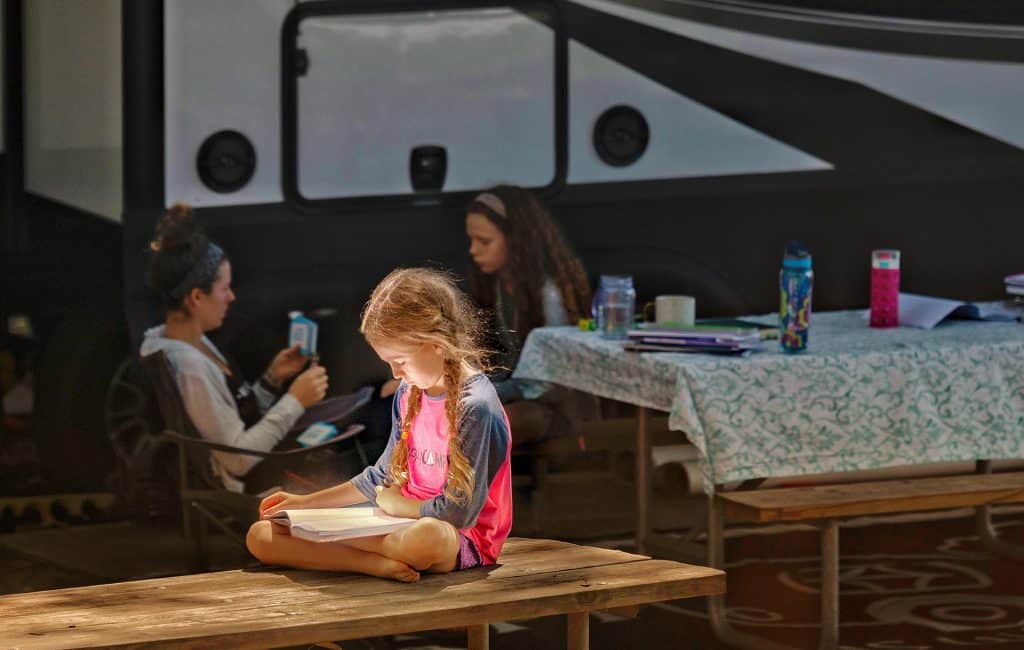
16 Proven Roadschool Ideas For Traveling Homeschoolers on the Road
How do you educate in your roadschool? Traveling homeschoolers have boundless opportunities to learn from resources around the world. Some students learn through homeschool travel abroad, while others are living and homeschooling in an RV.
What exactly is roadschool? Malinda Fuller of @thefulleradventure , who combines RV travel with homeschool, explains it best: “Full-time nomadic families use the term ‘road-schooling,’ which means an education that utilizes local or regional resources.”
“‘Educating’ is less about getting through a curriculum and more focused on full immersion wherever you are…Rather than learning every subject from one (or a handful) of teachers required to teach from textbooks, nomadic children have the opportunity to learn from adults who are either passionate about what they are sharing or have specialized education.”
Homeschooling on the road is often more memorable and impactful because the students see, touch, and interact with what they’re learning instead of reading about it in a book.
Roadschool also looks different for every family. Some traveling homeschoolers use structured curricula or virtual education to frame their learning. Others take a more relaxed approach and allow their travels, experiences, and people they meet to guide their lessons. No matter where you journey or how your family learns, here are some ideas to engage your traveling students.
Roadschool Ideas
Roadschool idea 1: hiking.
Exploring trails is an opportunity to teach various lessons. Cara Cherry of @chasing.cherrys used hikes in Yellowstone National Park to study North American birds with her children. It’s a great way to learn about wildlife, plant life, ecology, and geology up close. Kristin and Tony Faiola ( @thefaiolas ) teach their children survival skills outdoors. As a bonus, hiking is also a great physical activity.
Roadschool Idea 2: Homeschool on RV Travel Days
Heather and Matt Averill ( @the.airstream.family ) found a clever way to make even mundane travel days a learning opportunity. They homeschool while driving their airstream RV. Lessons include “reading signs on the road, calculating miles on driving legs, planning routes, reading maps, and planning for weather.”
Roadschool Idea 3: Workbooks
There are countless educational workbooks that make it easy to homeschool while you travel. Workbooks are also an excellent tool for travel days. Some of Dani Barber ( @the.wild.seekers )’s favorites include Sylvan , Brain Quest , Scholastic , and Daily Practice .
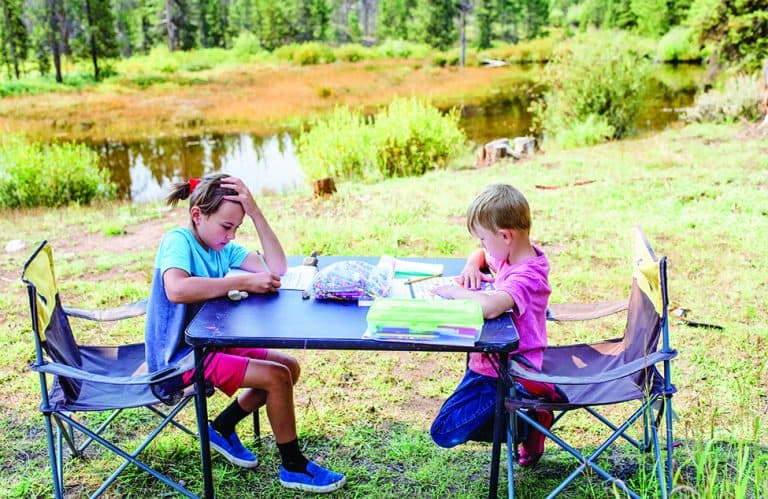
Roadschool Idea 4: Farms
By visiting farms, kids can learn about agriculture, animals, where our food comes from, and practical skills. Families that RV travel and homeschool can even leverage a Harvest Hosts membership to stay at farms. Kristin and Tony Faiola ( @thefaiolas ) had a memorable roadschool experience through this membership: “We learned the entire process of raising sheep for milk, cheese, and meat while staying at a Harvest Host farm.”
Roadschool Idea 5: Create Art
Nurture your kids’ creativity. Encourage them to paint, draw, build, write, and create art wherever they go. Enroll them in art classes along the road to learn new skills. Visit art museums, galleries, and artists around the world for inspiration.
Roadschool Idea 6: National Parks & Junior Ranger Programs
The US National Parks are an education goldmine, especially for families who RV travel and homeschool. In addition to the major National Parks, over 400 National Park Service units offer on-location roadschool lessons in science, history, and more.
The National Parks are one of Malinda Fuller ( @thefulleradventure )’s favorite places to explore and learn, especially thanks to the National Park Service’s Junior Ranger program:
“Our kids get educated about wildlife, ecosystems, the park’s history, as well as the people who helped build it. They earn badges for completed activities, but before they can be ‘sworn in’ as junior rangers, they have to interview a staff member, asking questions and recording answers. While it seems like a fun activity, they can be very involved and time-consuming. Our kids love the program and look forward to earning new pins for their ranger vests.”
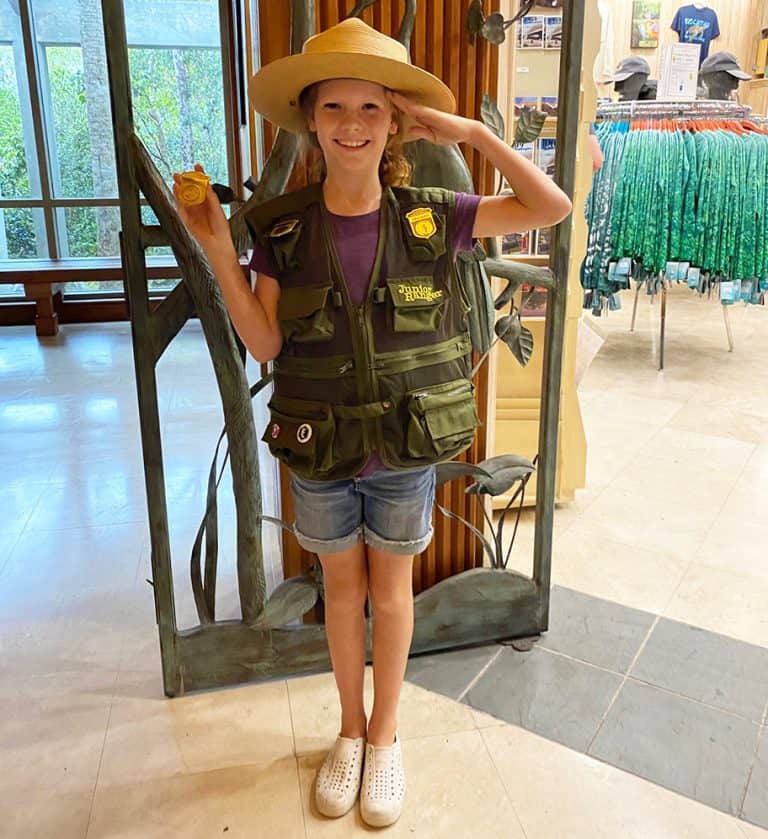
Roadschool Idea 7: Virtual School & Web Classes
For traveling homeschool families who want to leverage the knowledge of external teachers, virtual school and web classes are a great option. Kids can experience more structured school lessons by remote learning from their RV or anywhere in the world with an Internet connection.
Don and Vanessa Renyer (@ campfiresandfireflies ) use a virtual school for their daughter’s, education. “She logs into Zoom for two hours a day Monday through Thursday with other virtual students and her teacher,” they say. “It allows her time to socialize with peers and provides a general overview of the concepts she’ll be learning through the week. For the rest of her schoolwork, she has a chart of what’s expected to be completed weekly and she can finish it in her own time frame.”
Dani Barber ( @the.wild.seekers ) also utilizes online homeschool programs while living and homeschooling in an RV, including Easy Peasy All in One Homeschool , Seterra for geography, and ABC Mouse and Adventure Academy .
Roadschool Idea 8: Fitness Classes
Trying different fitness classes on the road is a great way to teach kids healthy habits through activities that suit their interests. Cycling, yoga, climbing, skiing, swimming, sports, and dance are a few of the exercises your roadschool students may enjoy. Sounds way more interesting than dodgeball in PE class!
Roadschool Idea 8: Historical Sites
Make history come alive! There are countless historical sites to visit anywhere you are homeschooling on the road. When Laura Georgieff ( @frugalforluxury ) did homeschool travel abroad in Europe, her family focused lessons on the World Wars. Stateside, they learned about American wars and segregation while visiting historical battlefields, missions, plantations, and National Parks.
Cara Cherry ( @chasing.cherrys ) shared a story about a particularly moving roadschool history lesson at the Old Exchange building in Charleston, South Carolina.
“My daughter was 8 years old, curious, and free-spirited. She and her brother were being a little too noisy for the setting, so I directed them each to read a specific placard to tell me about later. They set to their task and a few moments later, I looked over to see tears in Charlotte’s eyes. She told me about a boy near her own age who had been sold away from his mother and father to a plantation a state away. Her innocent eyes blinked at me, unsure of how to process the knowledge that kids were torn from their families simply because their skin was a different color than hers.”
“It was a heartfelt lesson, and the impact would have been completely different if she had been reading about it in a book. Standing in the very place where it happened made the effect on my daughter palpable.

Roadschool Idea 9: Cooking & Household Skills
Everyday tasks are an opportunity to teach your kids practical skills while they travel. Give them lessons in cooking, cleaning, and running a household. Involve your kids in the travel planning process.
Heather and Matt Averill ( @the.airstream.family ) incorporate conservation discussions when teaching their kids about running their household on wheels as they are living and homeschooling in an RV.
Roadschool Idea 10: YouTube
It seems like you can learn about anything on YouTube these days. The best part is that this trove of educational videos is free. Video lessons in science, art, literature, history, math, and practical skills and be incorporated into any roadschool course.
Some popular YouTube channels among roadschool families include Crash Course , Ted-Ed , The Smithsonian Channel , and National Geographic Kids .
Roadschool Idea 11: Homeschool Travel Communities
You don’t have to roadschool alone! Homeschool groups and traveling family networks can connect you to other roadschool families online or in person.
A popular group for homeschool RV families is The Fulltime Families network. Malinda Fuller ( @thefulleradventure ) says meeting families through this group is especially educationally enriching.
“These parents are often the best teachers to our kids because they pass on both skills and knowledge freely. Our kids have been introduced to coding, sat in on art and cartography classes, learned all about sourdough bread, completed writing lessons, yoga instruction, and more, as a result of being with other full-time traveling families.”
Roadschool Idea 12: Museums
Museums are for learning. While homeschooling on the road, families encounter so many museums along the way. Museums teach history, science, art, and more. Many provide educational booklets, activities, or workshops for kids to get even more out of the experience. Your roadschool students will remember their lessons much more with in-person experiences with artifacts and exhibits.
Roadschool Idea 13: Government Buildings
Civics lessons don’t have to be dull. Visiting government buildings can help kids understand how our government works and how to be responsible and caring citizens. Perhaps you can even arrange a meeting between your kids and some of their representatives.
That’s why Kristin and Tony Faiola ( @thefaiolas ) have a unique bucket list for their family: “One of their full-time journey goals is to visit all the capitol buildings, which has been a great way to bring history and government into their school day.”
Roadschool Idea 14: Native Reservations
Respectfully visiting Native reservations is a great way for kids to learn history that traditional history books too often neglect. Many Native reservations provide cultural centers, museums, or tours to teach visitors about their people and traditions.
Roadschool Idea 15: Educational Games
Educational kits, board games, card games, and video games are a great way to add engagement to roadschool courses. Big Brain Academy , Prodigy , Wonderopolis , and Tynker are just a few examples of educational games. These games can be played anywhere or on the go.
Roadschool Idea 16: Zoos
Zoos are another great location for students to learn about animals, ecology, science, and the environment. Many zoos offer guided tours and workshops to enhance your visit. Plus, who doesn’t love to meet animals in person?
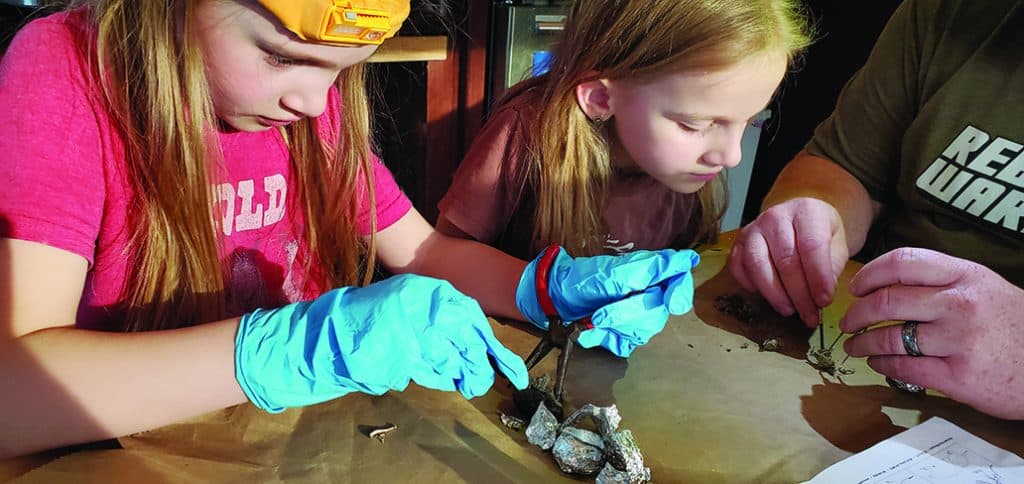
Learn More About Roadschool & Homeschool Travel
For families already homeschooling on the road, we hope this article provided some fresh ideas to add to your children’s education.
Are you curious about roadschool, RV travel homeschool, or homeschool study abroad? We feature roadschooling stories in Rootless Living magazine. Subscribe to discover more about living, working, and learning on the road.
Subscribe to Rootless Living
Contributing roadschool experts, homeschooling on the road.
This article features ideas and quotes from real roadschool families originally featured in Rootless Living magazine. Subscribe to read the full roadschool articles by these authors:
“Road School,” by Malinda Fuller (@thefulleradventure)
Featured in rootless living #4, jul/aug 2020.
Alex, Malinda, Lydia & Madi are a full-time nomadic family saying “yes” to adventure and life in a fifth wheel. They love national parks, sand dunes, the mountains, small towns, good food, and new experiences. They love to be outside and love boondocking, but have found that it’s more about the people that you’re with, than the place that you’re parked. Find them on Instagram @thefulleradventure .
“Ways to Homeschool Your Kids While Traveling,” by Alexis Nascimento
Featured in rootless living #14, mar/apr 2022.
This article features Laura Georgieff ( @frugalforluxury ), Kristin and Tony Faiola ( @the faiolas ), Dani Barber ( @the.wild.seekers ), Don and Vanessa Renyer ( @campfiresandfireflies ), and Heather and Matt Averill ( @the.airstream.family ).
“An Education on Wheels,” by Cara Cherry (@chasing.cherrys)
Featured in rootless living #15, may/jun 2022.
Cara and her husband Brent, along with their 3 kids, set out for full-time RV life in June 2020 from Los Angeles and are settled in Georgia for the moment. You can follow their journey on Instagram @chasing.cherrys .
You Might Also Like:

RV & Van Life Is The Best Travel Nurse Housing: 6 Reasons Why

6 Inspiring RV Kitchen Remodel Ideas

Creating a Full-Time RV Budget Worksheet & Guide (Free Download)

6 Creative RV Bunk Bed & Kids Room Remodel Ideas
Be the first to know.
Join our email list and get rv tips, advice, recipes, and more from our community of digital nomads.
Privacy Overview

Rootless is now RV Today ▹ Read a Recent digital issue free - Instantly!
- Election 2024
- Entertainment
- Newsletters
- Photography
- Personal Finance
- AP Investigations
- AP Buyline Personal Finance
- AP Buyline Shopping
- Press Releases
- Israel-Hamas War
- Russia-Ukraine War
- Global elections
- Asia Pacific
- Latin America
- Middle East
- Election Results
- Delegate Tracker
- AP & Elections
- Auto Racing
- 2024 Paris Olympic Games
- Movie reviews
- Book reviews
- Personal finance
- Financial Markets
- Business Highlights
- Financial wellness
- Artificial Intelligence
- Social Media
Airlines will now be required to give automatic cash refunds for canceled and delayed flights
FILE - Passenger drop off their baggage at United Airlines in C Terminal at George Bush Intercontinental Airport, Thursday, Dec. 21, 2023, in Houston. The Biden administration issued final rules Wednesday, April 24, 2024, to require airlines to automatically issue cash refunds for things like delayed flights and to better disclose fees for baggage or canceling a reservation. (Brett Coomer/Houston Chronicle via AP, File)
- Copy Link copied
The Biden administration issued final rules Wednesday to require airlines to automatically issue cash refunds for things like delayed flights and to better disclose fees for baggage or canceling a reservation.
The Transportation Department said airlines will be required to provide automatic cash refunds within a few days for canceled flights and “significant” delays.
Under current regulations, airlines decide how long a delay must last before triggering refunds. The administration is removing that wiggle room by defining a significant delay as lasting at least three hours for domestic flights and six hours for international ones.
Airlines still will be allowed to offer another flight or a travel credit instead, but consumers can reject the offer.
The rule will also apply to refunds of checked-bag fees if the bag isn’t delivered within 12 hours for domestic flights or 15 to 30 hours for international flights. And it will apply to fees for things such as seat selection or an internet connection if the airline fails to provide the service.
Complaints about refunds skyrocketed during the COVID-19 pandemic, as airlines canceled flights and, even when they didn’t, many people didn’t feel safe sharing a plane cabin with other passengers.
Airlines for America, a trade group for large U.S. carriers, noted that refund complaints to the Transportation Department have fallen sharply since mid-2020. A spokesperson for the group said airlines “offer a range of options — including fully refundable fares — to increase accessibility to air travel and to help customers make ticket selections that best fit their needs.”
The group said the 11 largest U.S. airlines issued $43 billion in customer refunds from 2020 through 2023.
The Transportation Department issued a separate rule requiring airlines and ticket agents to disclose upfront what they charge for checked and carry-on bags and canceling or changing a reservation. On airline websites, the fees must be shown the first time customers see a price and schedule.
The rule will also oblige airlines to tell passengers they have a guaranteed seat they are not required to pay extra for, although it does not bar airlines from charging people to choose specific seats. Many airlines now charge extra for certain spots, including exit-row seats and those near the front of the cabin.
The agency said the rule will save consumers more than $500 million a year.
Airlines for America said its members “offer transparency and vast choice to consumers” from their first search.
The new rules will take effect over the next two years. They are part of a broad administration attack on what President Joe Biden calls “junk fees.” Last week, Transportation Secretary Pete Buttigieg announced that his department will let state officials in 15 states help enforce federal airline consumer protection laws .
These 5 Arizona hotels were just named among the world's best. Here's why they stand out

Five Arizona hotels were just named among the best in the world for 2024.
Travel + Leisure unveiled its 2024 T+L 500 list of the world's best hotels, compiled based on ratings from its readers, in its May issue. The list includes five Arizona hotels, including four that made T+L's 2023 best hotels in Arizona ranking .
Readers evaluate based on their levels of quality, luxury, service and amenities. Here's a look at which Arizona hotels made the Travel + Leisure 2024 best hotels list.
For more hotels recognized as being among the best of metro Phoenix, read about the honorees in U.S. News & World Report's 2024 ranking , Forbes' 2024 Star Awards , and Esquire's best new hotels in the world .
Five Arizona hotels selected by Travel + Leisure
Readers of Travel + Leisure, America's largest travel media brand, selected five Arizona hotels on its 2024 ranking of the world's best hotels:
- Castle Hot Springs, Morristown.
- The Hermosa Inn, Paradise Valley.
- Mountain Shadows Resort, Paradise Valley.
- Sanctuary Camelback Mountain, A Gurney's Resort & Spa, Paradise Valley.
- Tanque Verde Ranch, Tucson.
“We’re honored to be recognized on the highly coveted T+L 500 List,” said Andrew Chippindall, general manager of Mountain Shadows Resort. “It’s a true testament to our team’s unwavering commitment to providing exceptional experiences for our treasured guests.”
How Travel + Leisure World's Best hotels 2024 were chosen
The T+L 500 list is derived from T+L's annual World's Best Awards, selected based on reader reviews and feedback. Readers were surveyed about their travel experiences around the world, including hotels, cities, islands, airlines, cruise ships and other experiences.
Readers rated hotels based on their rooms and facilities, location, service, food and overall value. They scored each category on a scale from "excellent" to "poor."
The hotels recognized this year are favorites among the publication's readers, who named Castle Hot Springs the best Arizona hotel of 2021 and 2022 and the Hermosa Inn the state's best of 2023. All except for Tanque Verde Ranch were included on last year's list of the 10 best hotels in Arizona.
Michael Salerno is an award-winning journalist who’s covered travel and tourism since 2014. His work as The Arizona Republic’s consumer travel reporter aims to help readers navigate the stresses of traveling and get the best value for their money on their vacations. He can be reached at [email protected] . Follow him on X, formerly Twitter: @salerno_phx .
Support local journalism. Subscribe to azcentral.com today.
US State Secretary Blinken to travel to Saudi Arabia next week
- Medium Text

Sign up here.
Reporting By Lucia Mutikani and Eric Beech; Editing by David Gregorio and Deepa Babington
Our Standards: The Thomson Reuters Trust Principles. New Tab , opens new tab
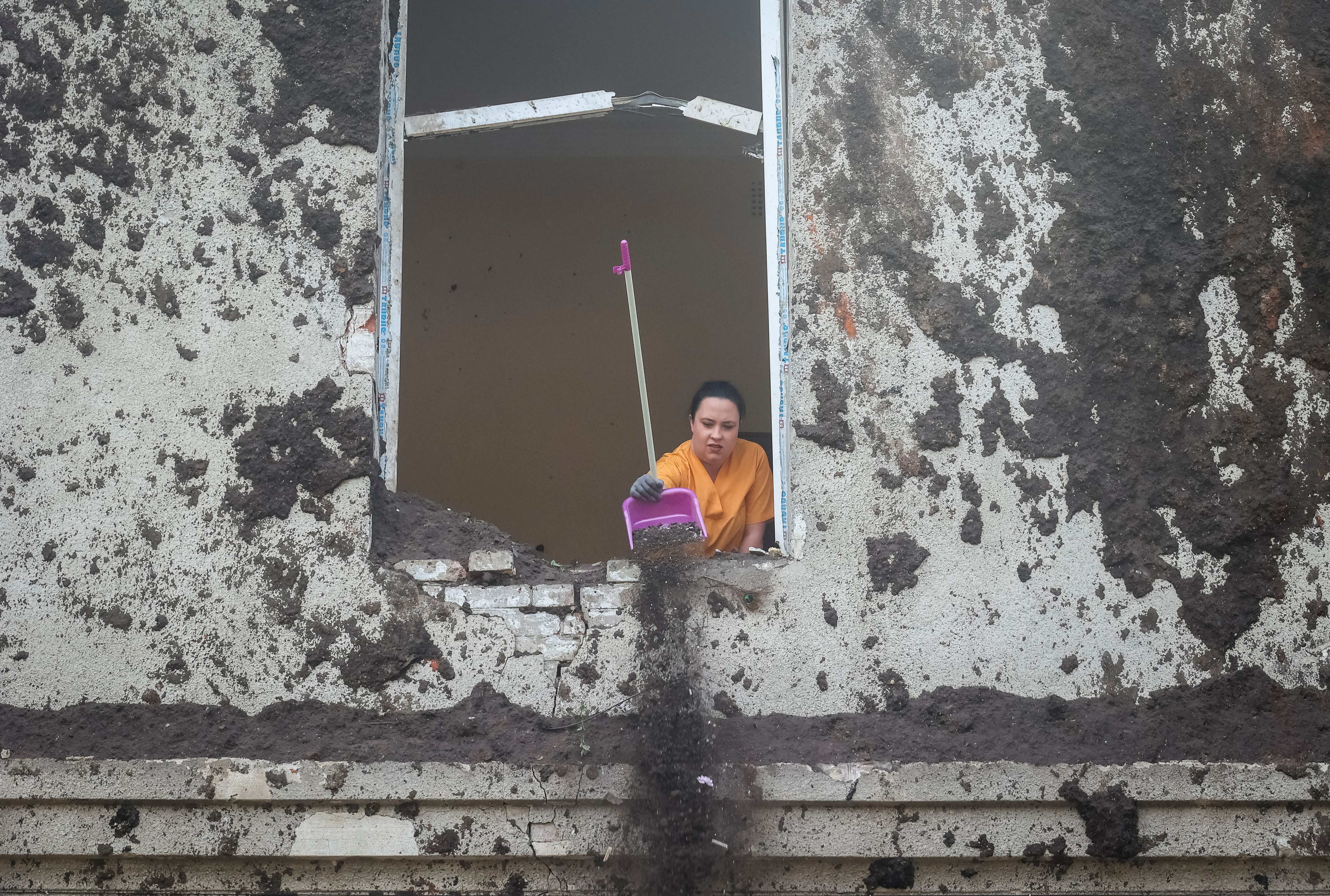
World Chevron

Israeli foreign minister says hostage deal would defer Rafah operation
Israel's foreign minister said on Saturday that a planned incursion into the southern Gaza city of Rafah could be suspended should a deal emerge to secure the release of Israeli hostages held by Hamas.
A tornado that struck the city of Guangzhou in southern China killed five people and left 33 injured, state news agency Xinhua said on Saturday, citing local authorities.

- International edition
- Australia edition
- Europe edition

‘Recipe for disaster’: Venice entry fee sparks confusion and protest on day one
Some residents say €5 fee aimed at curbing tourist numbers goes against principle of freedom of movement
For more than 160 years, visitors have been arriving at Venezia Santa Lucia train station and disembarking straight into the heart of one of the world’s most historic and beautiful cities. Until Thursday, however, they had never been met by a group of stewards in white and yellow bibs demanding to know if they had downloaded their QR code.
On the first day of what the mayor of Venice has hailed as a bold experiment in reducing over-tourism, day-trippers faced a €5 (£4.30) charge, which kicked in at 8.30am on Thursday and will apply on 29 peak days until 14 July as part of a trial.
The scheme is intended to help the city better manage the millions of tourists that visit every year, even if it only applies to those coming just for the day – and even if, as critics argue, the relatively low cost is unlikely to prove a deterrent.
The scheme appeared to have got off to a shaky start on Thursday, however, bewildering many visitors and even drawing protests from some residents.
Most of the day-trippers arriving at Santa Lucia came prepared with a QR code proving they had paid the toll, but there was still confusion among people with hotel bookings who were unaware they still had to go through the process of confirming their exemption online.
Showing proof of a booking is not enough, as Yvonne McKenna and Ken Mehan, visitors from Ireland who had arrived on an overnight train from Vienna, learned. A steward guided the couple through the online process, which took about 10 minutes.
“I knew about the new tax and the exemption but I didn’t know we would be doing this when we arrived,” said McKenna. “It does seem to take a long time … Imagine if you weren’t so up on all the technology.”
As more trains arrived at the station, Mehan pondered how easy it would be to manage the controls in high season. “I understand why they’re trying to do it, but it feels as though it could be a recipe for disaster.”
Natalie Liddell, a visitor from York who was in Venice for the first time, said: “It is very confusing. When we got to the hotel they said something about this, but we didn’t quite get what they were talking about. But I don’t think €5 is going to put people off.”

Others were totally oblivious to the new measure. “What fee?” asked Elizabeth from the US, before being shown how to pay online.
By late afternoon, 15,700 people had paid for a ticket, either pre-booked or bought on arrival.
The initiative has been bitterly contested in Venice, with opponents arguing that it is against the principle of freedom of movement and will do nothing to meaningfully address over-tourism.
Venice’s main island, where the measure applies, attracted 3.2 million overnight visitors in 2022. On the busiest days, an average 40,000 day trippers arrive in the city.
At Piazzale Roma, where Venice’s main bus terminal is situated, there was tension between police dressed in riot gear and the estimated 500 people protesting against the fee.
Federica Toninello, one of the protest’s organisers, said: “None of the measures done by this council cater to the necessities of residents. It’s just tourism and speculation, this is why we’re angry.”
after newsletter promotion
Toninello said that even though Venetians were exempt, the measure still affected their everyday lives as they had to prove they were not liable for the charge, and were subjected to checks. Likewise, commuters or students had to endure the “impracticality” of obtaining a QR code.
Guido Sattin, an activist from Arci, handed out “symbolic passports” to tourists outside the station as a way of highlighting the “dubious constitutional legitimacy” of the measure in terms of restricting free movement.
“This sets a dangerous precedent,” he said. “We are the only city in the world that you have to pay to enter. This goes against the Italian constitution and the European principle of freedom of movement.”
Simone Venturini, Venice’s councillor for tourism, defended the council’s move. “These protesters consider us to be the enemy,” he said. “This is not a magic wand measure, but after 60 years of talking about how to manage tourism, this is the first time anyone has taken action.”

Venturini said the fee was mostly aimed at deterring Italian day-trippers. “For example, a lot of Italians come to the nearby beaches in summer and, on a rainy day, they overwhelm Venice. Yes, the majority are from Veneto and are exempt, but the fact they still have to go online to confirm this is a way to disincentivise them.”
Jana Plevova, from Prague, sympathised with the residents’ plight, but supported the fee. She was spending five nights in the city and so was exempt, as she already paid a nightly tourist tax, but said she would have no concerns about paying to enter for the day.
She said: “Prague is also suffering from over-tourism, so paying €5 is not that much for trying to preserve this beauty and architecture.”
Edel, from Ireland, said: “For me, €5 is nothing if you really want to come.” Her husband, John, was more sceptical. “It’ll be €5 this year, €10 next … Who knows what the price will be in a few years’ time? Venice will stop living off its good name and start being seen as a rip-off.”

‘Are we joking?’: Venice residents protest as city starts charging visitors to enter

Venice access fee: what is it and how much does it cost?

Europe: Venice residents protest as city begins visitor charging scheme – as it happened

Venice mayor says he is brave like Marco Polo in charging day-trippers €5

Venice to limit tourist group size to 25 to protect historic city

Venice gondola capsizes after tourists refuse to sit down and stop taking selfies

Venice to trial €5 ticketing system for day visitors from 2024

I took my mum to Venice – it was instantly special
Most viewed.

193 countries! San Jose second-grade teacher becomes rare traveler to visit every country in the world
In May 2023, Lucy Hsu stepped foot into Syria and entered an exclusive club.
The Middle Eastern country was the 193rd Hsu had traveled to.
“There are not many people who have visited every country in the world,” Hsu said.
“One hundred ninety-three is the total that is recognized by most travel clubs because that represents the number of UN members who do vote in the UN,” the 43-year-old Hsu said.
Although there is no official tally, it is widely estimated that roughly 400 people in the world have been to every country. By comparison, more than 600 people have gone into outer space.
Hsu, a second-grade teacher at Cadwallader Elementary School in San Jose, didn’t get her first passport until she was 23. Hsu’s parents immigrated to the United States from Vietnam and the family had little in their budget for international travel.
“They were in a new country. They never had formal education being from Vietnam, like little village kids. They were starting really from zero,” Hsu said.
After graduating from UC Berkeley and working for a year, Hsu had saved up enough for her first international destination: London. Hsu, who had been fascinated by geography and history since she was a little girl, wanted to keep going.
As her teaching career started to take off, so did Hsu. During every break from teaching, Hsu was traveling. It was during summer breaks that Hsu added the most countries to her tally.
“Every year I would plan a big trip," Hsu said. "And so then my next trip was to Australia and New Zealand. Then the next summer it was a different part of Europe. Then it was Central America. And by the time I had taught for six, seven years, I think it was already 50 countries.”
Once she learned from other travelers there was something called the “Century Club,” made up of people who had been to 100 countries, that became her goal. Once she surpassed that number though, she didn’t slow down.
“I started researching these extreme countries that I could go to,” Hsu said. “And so by the time I was in this club for maybe five years, then I reached close to 150.”
During that period, for Hsu, not only did the number of countries change but her perspective on them. She shifted from being a mere tourist to volunteering around the world, staying with locals and truly experiencing their cultures.
Then she brought those meaningful experiences back to her classroom.
“When I ask the students, what were they grateful for? You heard answers like, ‘I'm grateful for diversity, my freedom. I'm grateful for my education opportunities,’ ” Hsu said. “Those answers, I would say, are directly correlated to discussions I've had with them.”
Beyond her classroom, Hsu has been invited to share what her journeys have taught her about the world at various travel conventions.
“I feel a lot of confidence in knowing that I can be anywhere and have peace. I can be anywhere and find work and be useful and have a purpose,” Hsu said.
Get updates on what's happening in the Bay Area to your inbox. Sign up for our News Headlines newsletter.

- Share full article
Advertisement
Supported by
Automatic Refunds and No More Hidden Fees: D.O.T. Sets New Rules for Airlines
The Transportation Department issued new requirements on refunds when flights are canceled or delayed and on revealing “junk” fees before booking. Here’s what passengers can expect.

By Christine Chung
The Transportation Department on Wednesday announced new rules taking aim at two of the most difficult and annoying issues in air travel: obtaining refunds and encountering surprise fees late in the booking process.
“Passengers deserve to know upfront what costs they are facing and should get their money back when an airline owes them — without having to ask,” said U.S. Transportation Secretary Pete Buttigieg in a statement, adding that the changes would not only save passengers “time and money,” but also prevent headaches.
The department’s new rules, Mr. Buttigieg said, will hold airlines to clear and consistent standards when they cancel, delay or substantially change flights, and require automatic refunds to be issued within weeks. They will also require them to reveal all fees before a ticket is purchased.
Airlines for America , a trade group representing the country’s largest air carriers, said in a statement that its airlines “abide by and frequently exceed” D.O.T. consumer protection regulations.
Passenger advocates welcomed the new steps.
Tomasz Pawliszyn, the chief executive of AirHelp, a Berlin-based company that assists passengers with airline claims, called it a “massive step forward and huge improvement in consumer rights and protection” that brings the United States closer to global standards in passenger rights.
Here’s what we know about the D.O.T.’s new rules, which will begin to go into effect in October.
There’s now one definition for a “significant” delay.
Until now, airlines have been allowed to set their own definition for a “significant” delay and compensation has varied by carrier . Now, according to the D.O.T., there will be one standard: when departure or arrival is delayed by three hours for domestic flights and six hours for international flights.
Passengers will get prompt refunds for cancellations or significant changes for flights and delayed bags, for any reason.
When things go wrong, getting compensation from an airline has often required establishing a cumbersome paper trail or spending untold hours on the phone. Under the new rules, refunds will be automatic, without passengers having to request them. Refunds will be made in full, excepting the value of any transportation already used. Airlines and ticket agents must provide refunds in the original form of payment, whether by cash, credit card or airline miles. Refunds are due within seven days for credit card purchases and within 20 days for other payments.
Passengers with other flight disruptions, such as being downgraded to a lower service class, are also entitled to refunds.
The list of significant changes for which passengers can get their money back also includes: departure or arrival from an airport different from the one booked; connections at different airports or flights on planes that are less accessible to a person with a disability; an increase in the number of scheduled connections. Also, passengers who pay for services like Wi-Fi or seat selection that are then unavailable will be refunded any fees.
Airlines must give travel vouchers or credits to ticketed passengers unable to fly because of government restrictions or a doctor’s orders.
The vouchers or credits will be transferable and can be used for at least five years after the date they were issued.
Fees for checked baggage and modifying a reservation must be disclosed upfront.
Airlines and ticket agents are now required to display any extra fees for things like checking bags or seat selection clearly and individually before a ticket purchase. They will also need to outline the airline’s policies on baggage, cancellations and changing flights before a customer purchases a ticket.
The rules, which apply to all flights on domestic airlines and flights to and from the United States operated by foreign airlines, have varying start dates.
For example, automatic refunds must be instituted by the airlines within six months. But carriers have a year before they’re required to issue travel vouchers and credits for passengers advised by a medical professional not to fly.
Follow New York Times Travel on Instagram and sign up for our weekly Travel Dispatch newsletter to get expert tips on traveling smarter and inspiration for your next vacation. Dreaming up a future getaway or just armchair traveling? Check out our 52 Places to Go in 2024 .
Christine Chung is a Times reporter covering airlines and consumer travel. More about Christine Chung
Open Up Your World
Considering a trip, or just some armchair traveling here are some ideas..
52 Places: Why do we travel? For food, culture, adventure, natural beauty? Our 2024 list has all those elements, and more .
Mumbai: Spend 36 hours in this fast-changing Indian city by exploring ancient caves, catching a concert in a former textile mill and feasting on mangoes.
Kyoto: The Japanese city’s dry gardens offer spots for quiet contemplation in an increasingly overtouristed destination.
Iceland: The country markets itself as a destination to see the northern lights. But they can be elusive, as one writer recently found .
Texas: Canoeing the Rio Grande near Big Bend National Park can be magical. But as the river dries, it’s getting harder to find where a boat will actually float .

IMAGES
VIDEO
COMMENTS
9 Homeschooling While Traveling. 9.1 Benefits of Travel in Homeschooling. 9.2 How Traveling Changes the Homeschooling Game. 10 Picking a Homeschooling Curriculum. 10.1 Free Homeschool. 10.2 Accredited Homeschool. 10.3 Tuition/Fee Based Homeschool. 10.3.1 Preschool. 10.3.2 Elementary Through High School.
World Travel + Experiential Education. While it's assumed that worldschoolers homeschool their kids, education is about far more than textbooks and online learning programs.. As a worldschooler, education includes travel to foreign countries and is about experiencing new cultures, new places, and different ways of living. Worldschooling is truly a unique approach to homeschooling that can ...
Homeschooling and Traveling. Homeschooling and traveling, two wonderful freedoms in life. We are one of a large and growing crowd of families who are homeschooling while traveling the world, as expats or travelers. We've been on the road well over 5 years but we homeschooled with state approval and registration before departure.
Practical learning. Karen Binedell, whose three children - Sebastian (16), Aiden (14) and Ella (12) - are enrolled in an online college as the family volunteer their way around Europe, believes that homeschooling while travelling brings learning to life. Being on the move allowed the children to see many of the places they were learning ...
The advantage of Time4Learning for families traveling abroad include: Students get individual logins and work on their own schedule and pace. Standards-based lessons that cover core subjects in grades PreK-12. A platform that appeals to children of different learning styles and preferences.
Observation is key for traveling homeschoolers. It teaches children about so many things -from physics to history to art. Visit a city and play a game to find various architectural details in the buildings, and discuss what they mean. Point out why a column is used for example - both to hold up a structure and as an aesthetic detail.
Whether you've heard it called travel-schooling, world-schooling, or road-schooling, if you've been homeschooling for a while, you've probably heard of families doing it. Some define it as simply traveling while homeschooling - taking their books on the road wherever they want to go and using what they see along the way to supplement ...
Homeschooling while traveling the world offers an unparalleled opportunity to blend learning with real-world experiences. By setting dedicated study hours yet staying open to the spontaneous educational moments that travel brings, families can ensure their children receive a rich and varied education. It's about more than just hitting the books ...
Fortunately, there are ways to make homeschooling easier and more effective even while you travel. Check out these tips: 1. Bring books about your trip. Books that talk about a city or country's history, geography and culture is a great way to boost learning and get them more excited about going. Reading is learning.
1 Homeschool Travel: The Fusion of Education and Exploration. 1.1 Decoding Homeschool Travel. 1.2 The Surge in Homeschool Travel's Popularity. 2 Benefits of Homeschool Travel. 2.1 Real-World Experiences: The Best Teacher. 2.2 Cultivating Resilience, Adaptability, and Problem-Solving Skills. 2.3 A Deep Dive into Cultural Immersion.
In the world of homeschooling, the "travel homeschool" approach has granted us the freedom to explore, the flexibility to learn at our own pace, and the joy of experiencing education in its most authentic form. For us, being a homeschool family is synonymous with being a family of adventurers. We've embraced the open road as our classroom ...
Homeschooling and working as they move from one incredible location to the next. Their goal is to use their travel guides and stories to inspire others to explore the world. We interviewed 14 families that are homeschooling, unschooling and worldschooling while they travel. They give tips and advice for traveling homeschoolers.
It only depends on what will work best with your travel and teaching schedule. Consider software like Rosetta Stone , free language resources, online classes , hire a private tutor via Skype, use free sites like DuoLingo, take classes on the road. There's help out there at every price and intensity level.
When you're homeschooling while traveling the world, so many of these skills come into play in daily life! Science. If I had to label our science kindergarten homeschool curriculum, perhaps I'd call it "understanding the world around us". Kindergarteners have a natural curiosity about animals around the world and their habitats, so we ...
We started homeschooling our kids to travel. We've bonded as a family, and they're learning through unique experiences. Terri Peters. Feb 24, 2024, 5:16 AM PST. By choosing to homeschool her kids ...
7 Challenges Of Homeschooling While Traveling The World. While homeschooling for traveling families can be an exceptional experience for all involved, it comes with its own set of obstacles to overcome. And to be honest it can be draining on the parent that is mainly responsible for the teaching.
We continues homeschooling worldwide for another 6 years until lockdowns forced us to stop home or world schooling. This is our year end wrap up after homeschooling in Sri Lanka, Laos, Thailand, Malaysia, the UK and many more countries. We even took a homeschooling cruise and found many educational oportunities there.
Eclectic homeschooling is a term used to describe a homeschooling approach that incorporates a variety of methods, philosophies, and materials.Eclectic homeschoolers may choose from Charlotte Mason, Unit Studies, Classical Education, Waldorf Education, Unschooling, or any number of other approaches. They may use traditional textbooks or ...
We plan group trips for homeschool families. Join us at Disney, Washington DC, Boston, London, New York, Ireland, France, Italy, and more! ... Travel with us and create lasting memories with your family. TRIPS & EVENTS. ... Walt Disney World® Resort. Paris to Normandy River Cruise. Egypt River Cruise.
Author's daughter pointing out a shark — the lesson plan for the day was to snorkel off the coast of Tahiti. Beth McCarter. Beth McCarter and her husband pulled their kids out of school to try ...
Make history come alive! There are countless historical sites to visit anywhere you are homeschooling on the road. When Laura Georgieff (@frugalforluxury) did homeschool travel abroad in Europe, her family focused lessons on the World Wars.Stateside, they learned about American wars and segregation while visiting historical battlefields, missions, plantations, and National Parks.
One of the things we get asked a lot, is how we do our homeschooling. That is a good question, and we had many questions ourselves when we wanted to get star...
Because every day is so different when you homeschool while traveling, we wanted to show what a typical day FELT like. It's not nearly everything we do, but...
For travel families, unschooling provides the freedom for kids to explore and learn from the world around them without constraints. This approach embraces self-directed lear ning and creativity.
The Biden administration issued final rules Wednesday to require airlines to automatically issue cash refunds for things like delayed flights and to better disclose fees for baggage or canceling a reservation.. The Transportation Department said airlines will be required to provide automatic cash refunds within a few days for canceled flights and "significant" delays.
How Travel + Leisure World's Best hotels 2024 were chosen. The T+L 500 list is derived from T+L's annual World's Best Awards, selected based on reader reviews and feedback. Readers were surveyed ...
Item 1 of 2 U.S. Secretary of State Antony Blinken gestures, as he and his wife Evan Ryan board a plane at the U.S. Naval Support Activity base, after the G7 foreign ministers summit on Capri ...
For more than 160 years, visitors have been arriving at Venezia Santa Lucia train station and disembarking straight into the heart of one of the world's most historic and beautiful cities.
Although there is no official tally, it is widely estimated that roughly 400 people in the world have been to every country. By comparison, more than 600 people have gone into outer space.
The Transportation Department on Wednesday announced new rules taking aim at two of the most difficult and annoying issues in air travel: obtaining refunds and encountering surprise fees late in ...